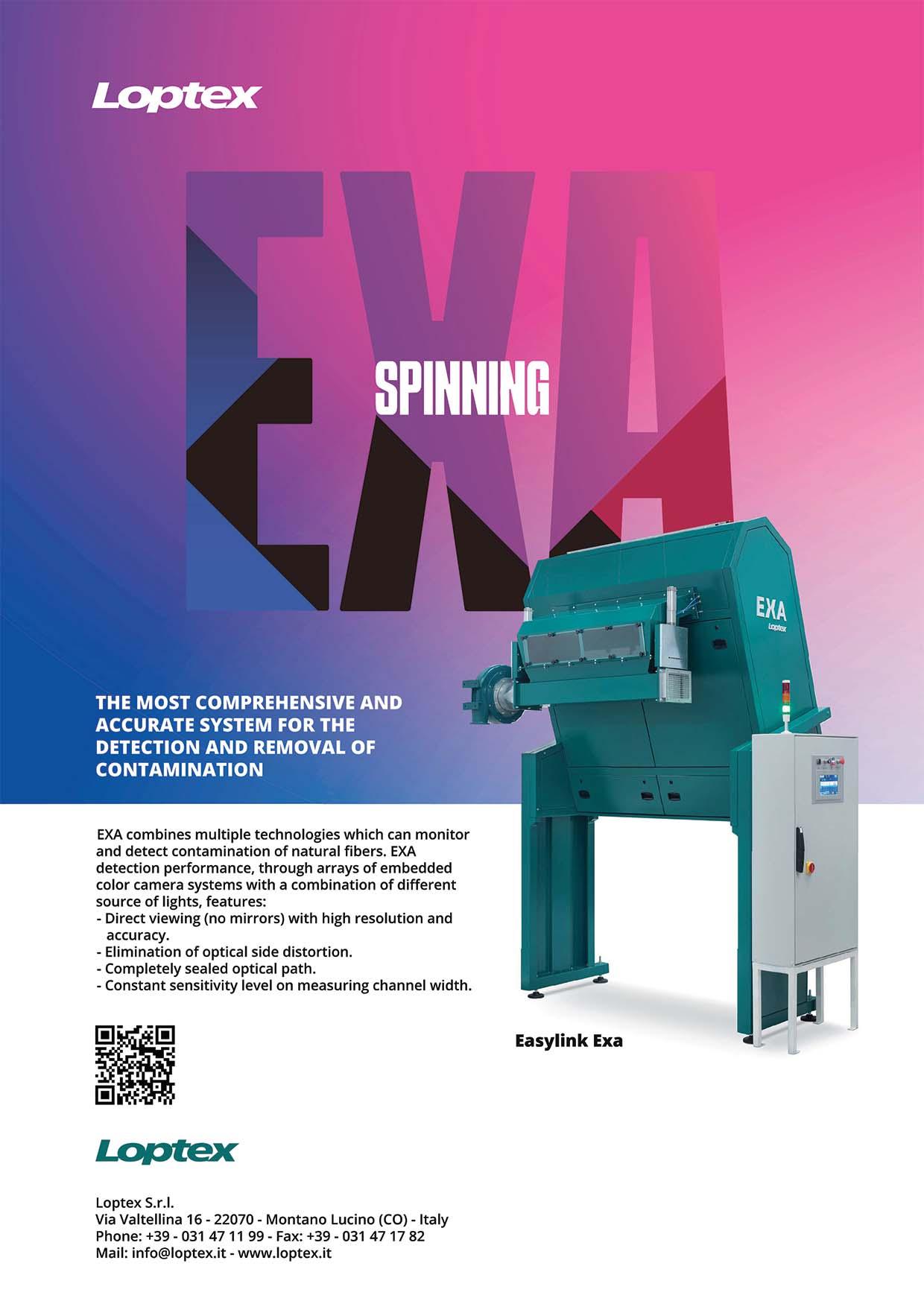
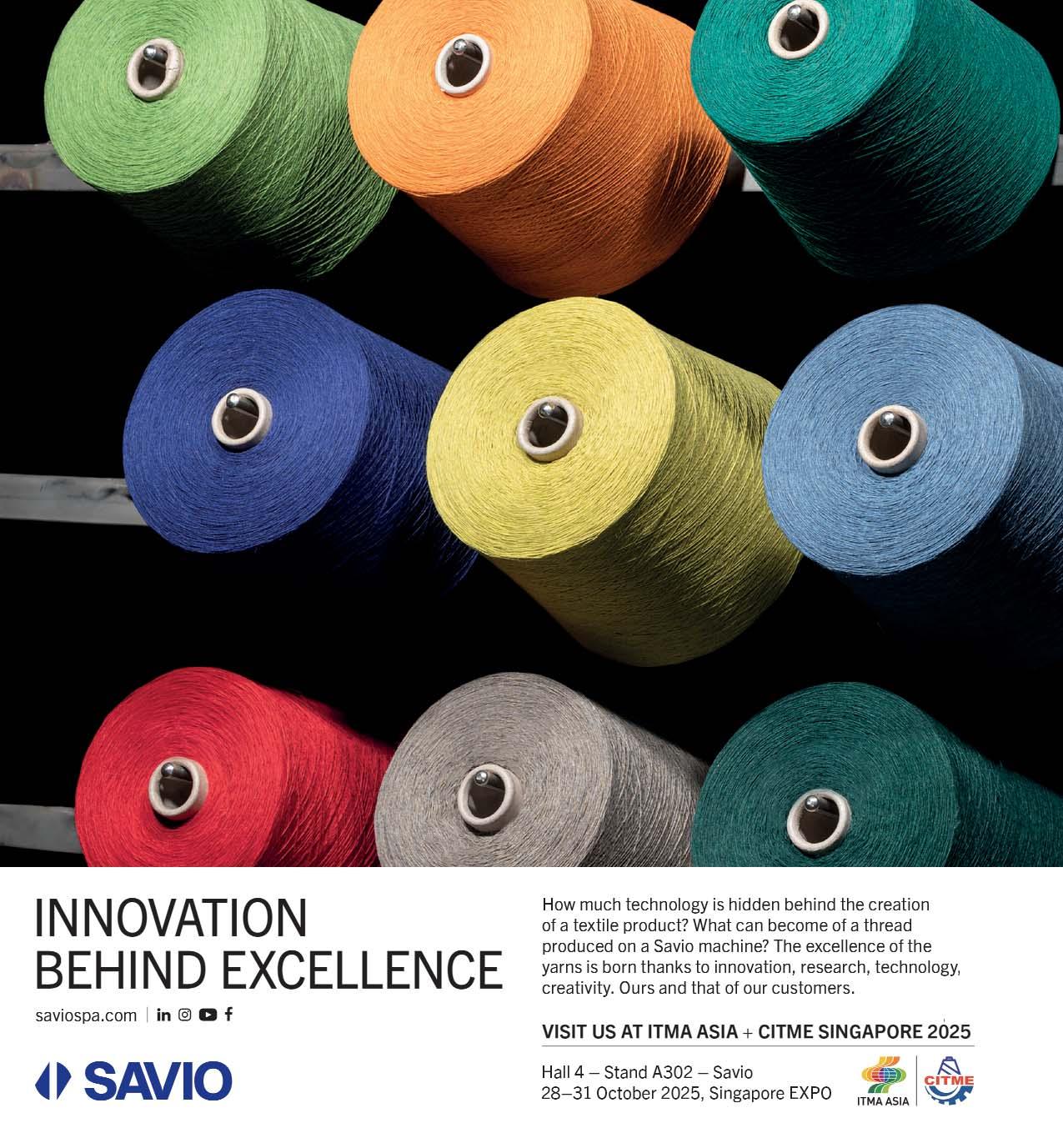

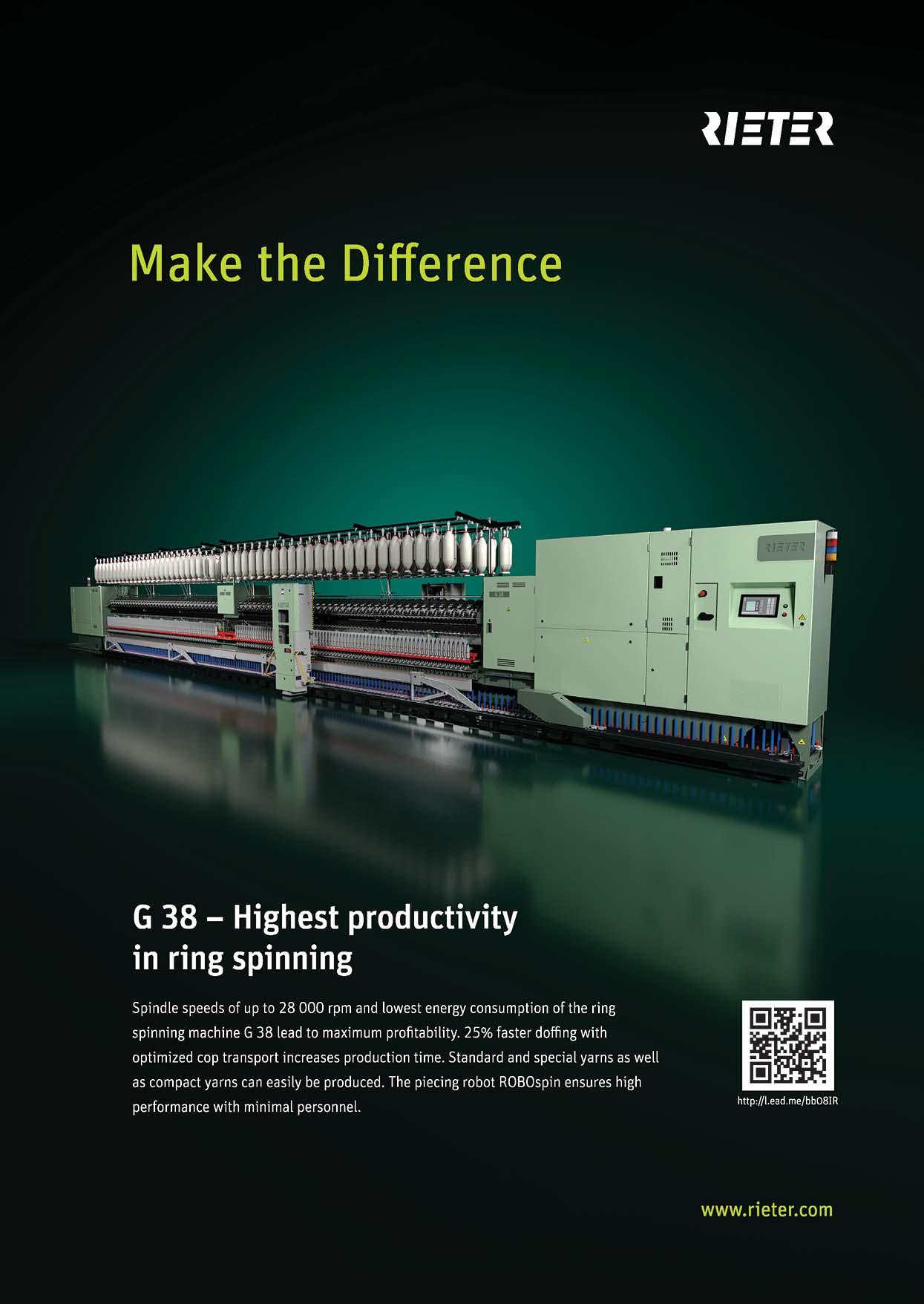





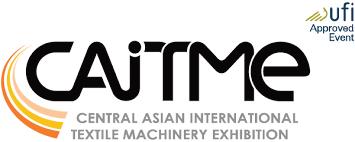
CAITME 2025
Dates: September 9th to 11th, 2025. Venue: Tashkent, Uzbekistan.

Apparel Sourcing Paris Autumn
Dates: September 15th to 17th 2025. Venue: Paris, France.

64th Dornbirn-Global Fiber Congress
Dates: September 10th to 12th 2025. Venue: Dornbirn Austria.

ITMA ASIA + CITME, Singapore 2025
Dates: October 28th to 31st, 2025.
Venue: Expo Centre Singapore.

ShanghaiTex 2025
Dates: November 16th to 19th 2025. Venue: SNIEC, Shanghai, China.

Textile Asia 2025, Lahore
Dates: November 22nd to 24th 2025. Venue: Lahore Expo Centre. Textile Asia 2026, Karachi
Dates: December 05th to 07th 2026. Venue: Expo Centre, Karachi.

Heimtextil 2026, Frankfurt
Dates: January 13th to 16th, 2026 Venue: Frankfurt, Germany.

FESPA Middle East 2026
Dates: January 13th to 15th 2026. Venue: Dubai Exhibition Centre.

DOMOTEX Hannover 2026
Dates: January 19th to 22nd 2026. Venue: Hannover, Germany.

IGATEX Pakistan 2026, Lahore
Dates: April 08th to 11th 2026.
Venue: Expo Centre, Lahore
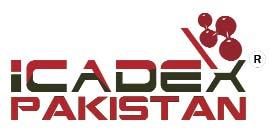
iCADEX Pakistan 2026, Lahore
Dates: April 08th to 11th 2026.
Venue: Expo Centre, Lahore PAKISTAN
JOURNAL - July -August 2025

DOMOTEX asiaCHINAFLOOR 2026
Dates: May 27th to 29th 2026. Venue: NECC, Shanghai, China.

Techtextil and Texprocess 2026
Dates: April 21st to 24th, 2026
Venue: Frankfurt, Germany.
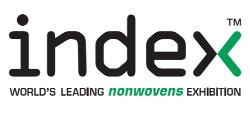
Index 2026
Dates: May 19th to 22nd, 2026. Venue: Palexpo, Geneva, Switzerland.
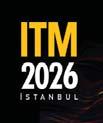
ITM 2026
Dates: June 9th to 13th, 2026. Venue: Istanbul, Turkey.

HIGHTEX 2026
Dates: June 9th to 13th, 2026. Venue: Istanbul, Turkey.

ITMA ASIA + CITME 2026
Dates: October 20th to 24th, 2026. Venue: NECC, Shanghai, China.
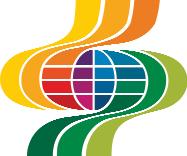
Dates: September 16th to 22nd, 2027. Venue: Hanover, Germany.
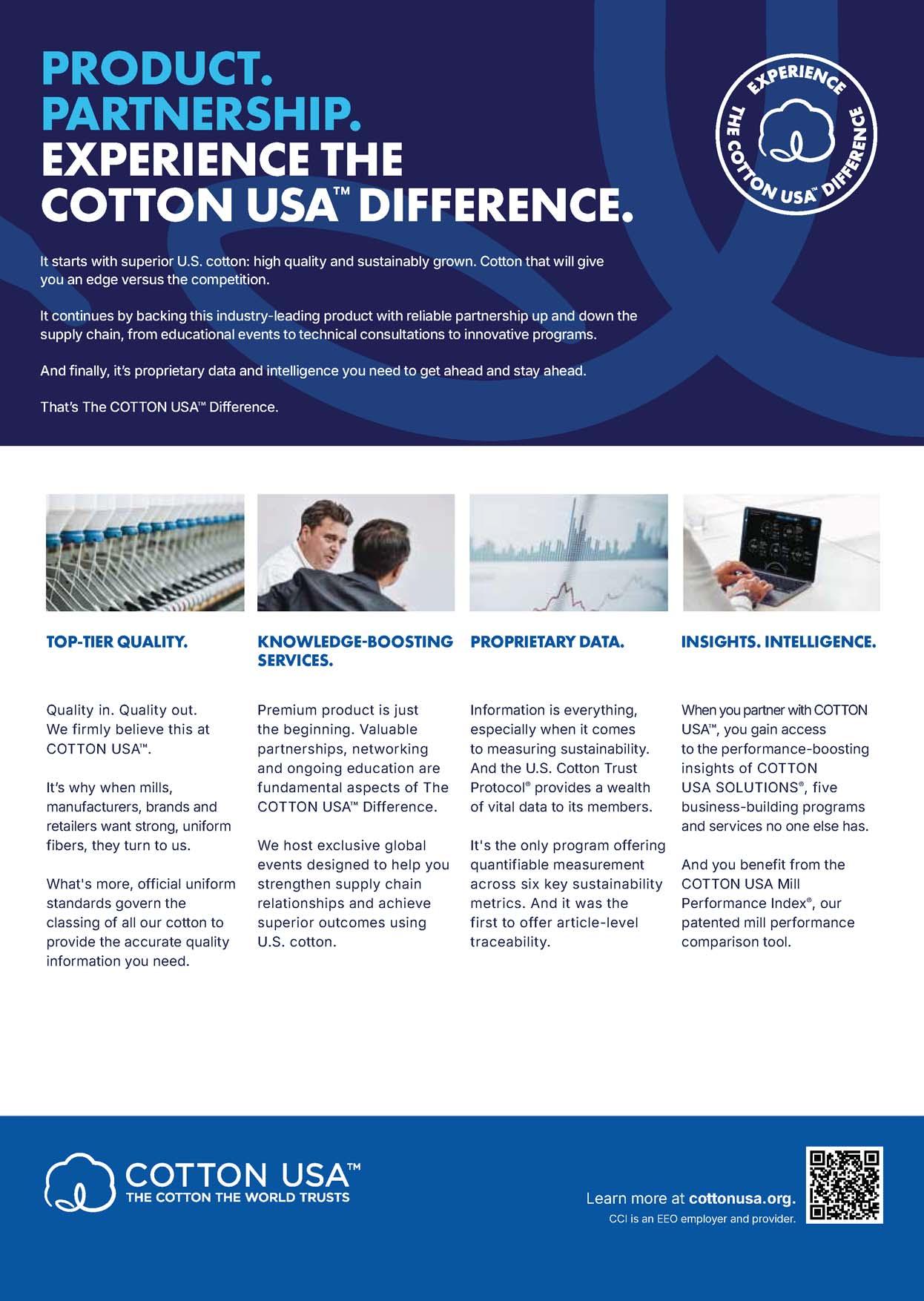



Founded in 1951 by Mazhar Yusuf (1924-2009)
Publisher
Nadeem Mazhar
Editor in Chief
Amina Baqai
Associate Editor
Nimrah Nadeem
Production Manager
Mazhar Ali
Layout & Design
Noor M. Jaan
Website / Social Media
Minhaj Ali
Hony-Editorial Board
Dr. Hafizur Rehman Sheikh Ph.D (UK) F.T.I. (UK)
Syed Mahfooz Qutab
C.TEX, F.T.I (U.K), B.Sc. Fellow I.C.T.T Atlanta, GA; (USA)
Dr. Zubair Bandukda PhD (Textiles), CText ATI
Editorial & Advertising Office
B-4, 2nd Floor, 64/21, M.A.C.H, Miran M. Shah Road, Karachi - Pakistan
Tel: +92-21-34311674-5
Fax: +92-21-34533616
Email: info@ptj.com.pk
URL: http://www.ptj.com.pk
PTJ Europe Ltd.
Registered Office: Dairy House, Money Row Green, Holyport, Maidenhead, Berkshire, SL6 2ND, United Kingdom.
Registered no. 09141989
Tel: +44 792 2228 721
Available on Gale and Factiva affiliated international databases through Asianet Pakistan
Engr. Naeem Ilyas Khanani Printed at: Color Plus Korangi, Karachi. Published by Nadeem Mazhar from D-16, K.D.A. Scheme No.1. Karachi.


















Tonello and Pacific Jeans celebrate a shared milestone: the 10,000th machine . . .18
Brückner: Inauguration of the branch office in Coimbatore, India
.20
YKK Corporation named CDP Supplier Engagement Leader for third consecutive year22
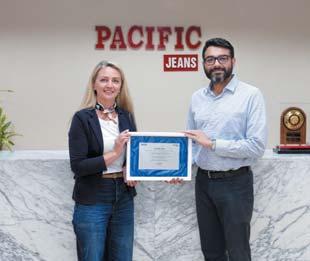
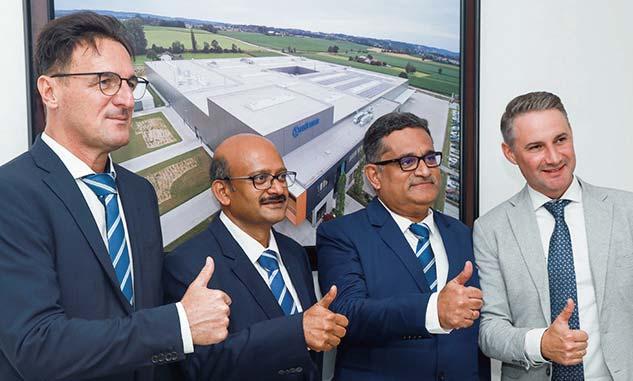
Archroma unveils breakthrough washing-off auxiliary for outstanding color fastness and resource efficiency in reactive dyeing
Transitions to full ownership by Zhejiang Longsheng Group, resolving longstanding dispute
First ITMA Sustainability Forum to feature European Commission Keynote Speaker .
Navigating the future of fashion: Intertextile Apparel unveils upgraded zones and fringe programme
COTTON USA™ forums strengthen U.S.–Pakistan cotton textile industry ties . . . .30

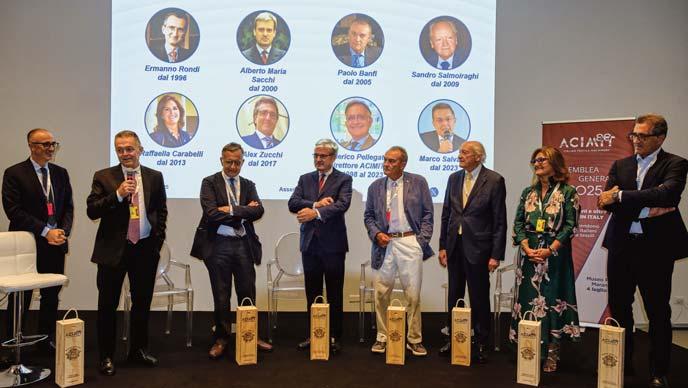
Hagen Lotzmann is the newManaging Director of KARL MAYER Technical Textiles .32
Circulose partners with Mango and H&M Group to make circularity at scale a reality34
Excellence in denim manufacturing with Rieter ring spinning system .
Uster Technologies: Challenges of making yarn from recycled fibres
Autocoro 11 – Leading innovation for spinning recycled fibres
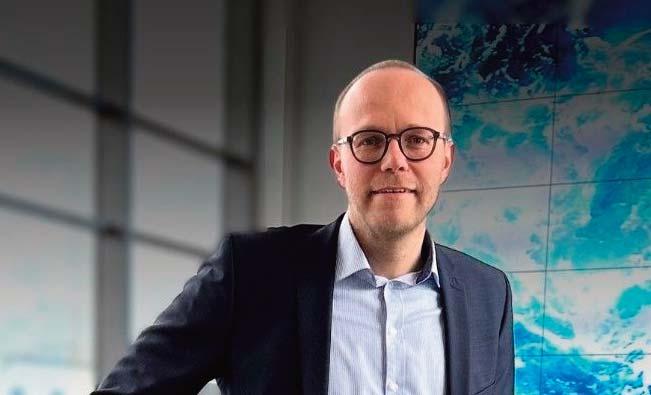
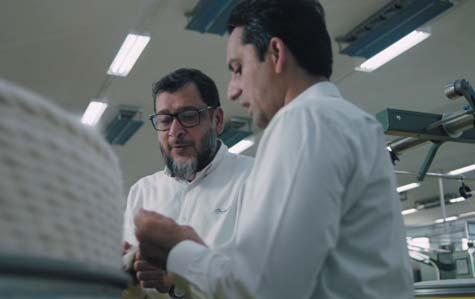
.37
Mei Sheng in Vietnam: Longstanding partnership with Trützschler for outstanding quality
Performance of Italian textile machinery sector during FY24 .
by Nadeem Mazhar, Managing Editor, Pakistan Textile Journal.
Italy remains an important market for Pakistan with 1.2 billion dollar exports during FY24
by Nadeem Mazhar, Managing Editor, Pakistan Textile Journal.
Italian Textile Technology and Pakistan's Industrial Prowess
ACIMIT celebrates 80th anniversary
The association looks back with pride and ahead with renewed passion and responsibility.
Color Service S.r.l. (“Color Service”) signs definitive agreement with Graco . . .52
Over 30 Years at the administrative heart of Color Service: The story of Corrado Rampon .
Ferraro: Excellence in sanforising technology
Loptex: Pioneering Contamination Elimination for a cleaner textile future
Durst strengthens textile printing portfolio
Through strategic acquisition of aleph — Now Durst Como
Eurojersey and Durst – A flagship customer collaboration
CORINO MACCHINE: Italian innovation at the heart of textile finishing
Mesdan cotton fibre testing equipment
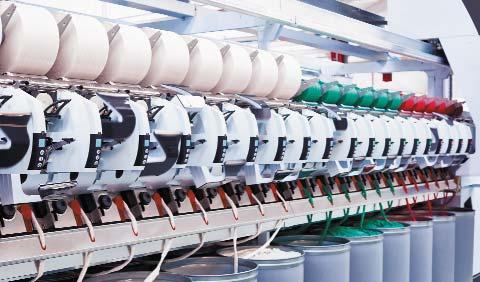
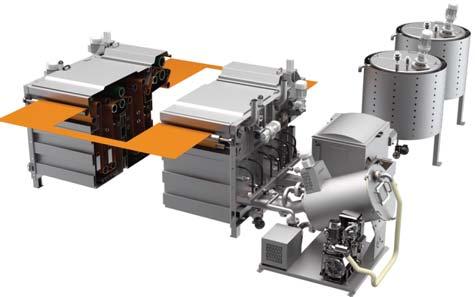
.54
Savio redefines yarn finishing with Proxima Smartconer® and Lybra Smartspinner® .61
Santex Rimar Group’s strategic blend of Italian precision and global responsiveness 62
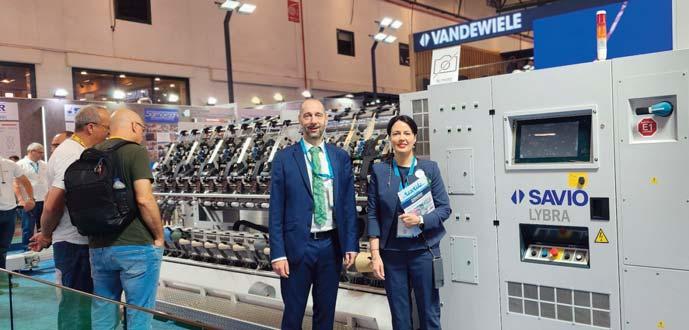
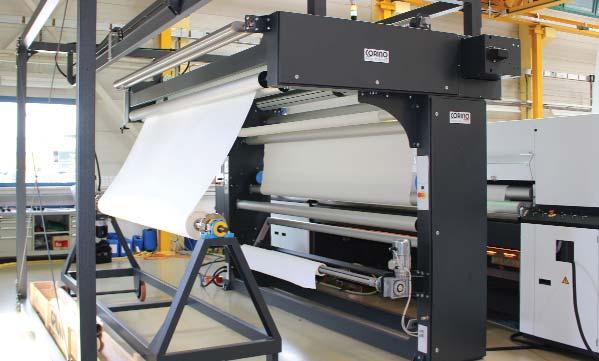
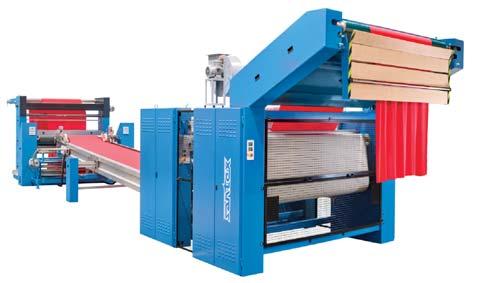
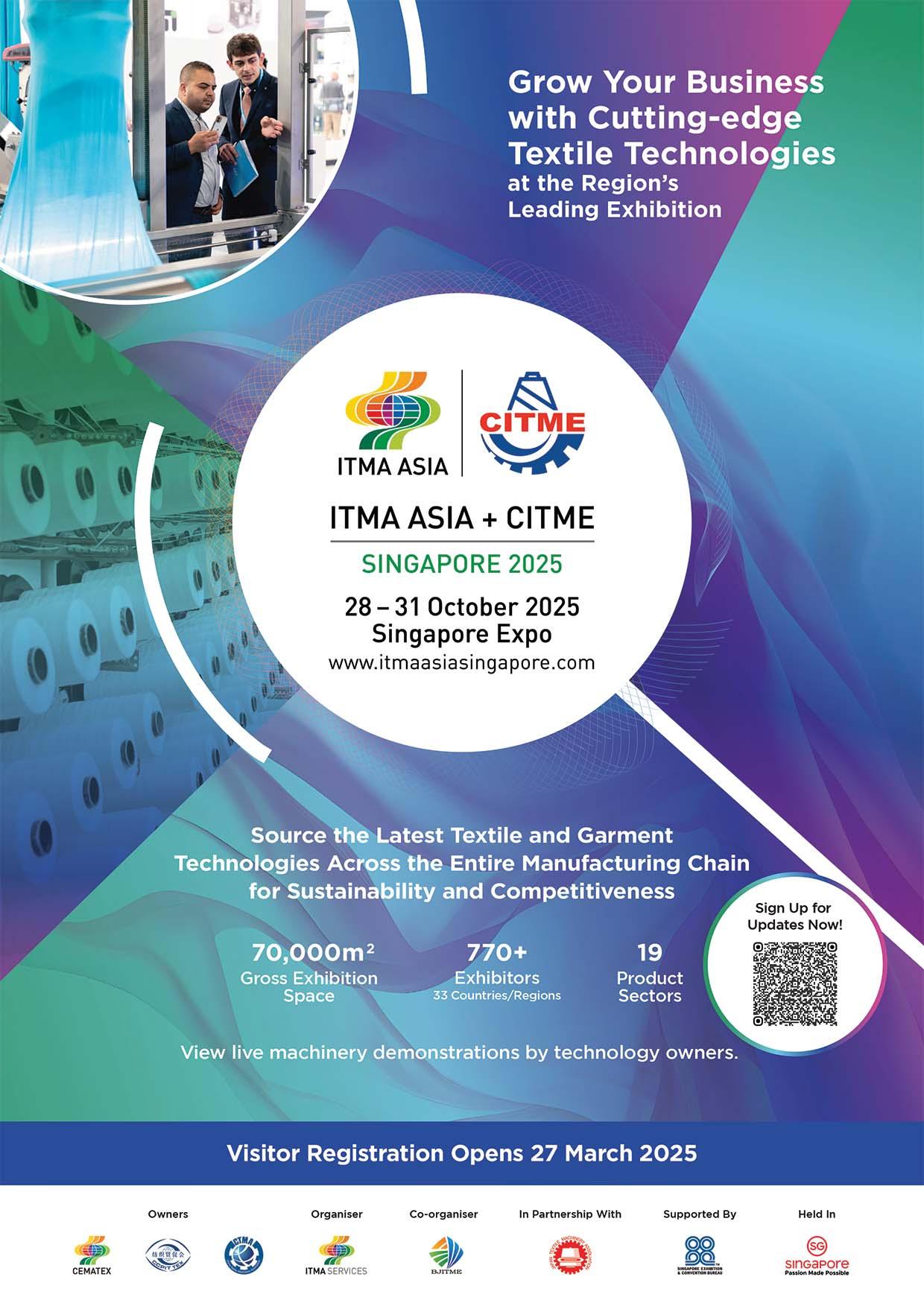
EDITOR’S PAGE
This year marks the 80th anniversary of ACIMIT (Association of Italian Textile Machinery Manufacturers), a milestone celebrating Italy’s leadership in textile machinery. At a commemorative General Assembly held at the Ferrari Museum in Maranello, ACIMIT reaffirmed its commitment to innovation, internationalisation, and sustainability as the cornerstones of the industry's future.
In his address, ACIMIT President Marco Salvadè acknowledged current global challenges, including an 8% drop in production and a 9% decline in exports for Italian textile machinery in 2024. However, he emphasized that "Made in Italy" must continue to represent quality, creativity, and technical excellence, especially in a volatile global economy marked by protectionism.
Despite the downturn, Italian textile machinery remains a global benchmark, thanks to the strength of ACIMIT’s 300 member companies, primarily SMEs. These firms export 86% of their output to over 130 countries, offering high-performance, sustainable, and customized solutions for both traditional and advanced textile manufacturing.
In 2024, Italy maintained its status as an industrial powerhouse, with total exports reaching euro 675 billion, an increase over the previous year. Asia accounts for 41% of Italian textile machinery exports, followed by the EU, North America, and Africa. China remains the top market, with Turkey, India, and the U.S. close behind.
Italian manufacturers continue to lead in Industry 4.0 solutions—developing machinery that integrates automation, predictive maintenance, data acquisition, and augmented reality. These innovations enable cost reductions and faster adaptation to market demands, aligning with global priorities like just-in-time production and sustainable sourcing.
Among Italy’s global trade partners, Pakistan has emerged as a key player. In 2024, bilateral trade surpassed euro 1.5 billion, with Pakistan enjoying a euro 500 million trade surplus, driven by exports of cotton fabrics, garments, leather, home textiles, and sports goods.
At the same time, Pakistan's imports of Italian textile machinery grew by 9% to euro 53 million, with finishing machines making up nearly half. This rise reflects growing trust in Italian technology as Pakistani manufacturers invest in high-precision, energy-efficient equipment to modernize their operations.
Italy’s contribution extends beyond machinery. Italian expertise is active in pharmaceuticals, automotive, energy, and renewables in Pakistan, reflecting a multi-sectoral partnership.
A highlight of this collaboration was Italy’s enhanced participation in IGATEX 2025, Pakistan’s leading textile machinery exhibition. Under Mr. Salvatore Parano, Trade Commissioner of the Italian Trade Agency (ITA), and supported by Mr. A.R. Daudpota, a veteran in Pakistan’s textile machinery landscape, Italian firms showcased cutting-edge solutions in spinning, weaving, finishing, and automation—strengthening Italy’s role as a preferred technology partner.
The story of Italian textile machinery is one of resilience and vision. Emerging from the 1970s energy crisis, it has evolved into a globally recognized sector that supports over 100,000 jobs and enhances Italy’s fashion and textile competitiveness.
For Pakistan, this partnership offers more than machinery. It is an avenue for the development of skills, the transfer of knowledge, and a driver of sustainable industrial growth, essential for boosting productivity and entering higher-value global supply chains.


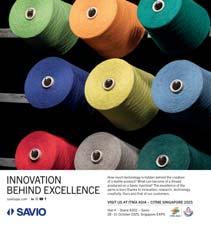
July-August 2025
1
Pakistan’s textile industry continued its upward trajectory in April 2025, reporting export earnings of $1.44 billion, an 11.1% increase over the $1.3 billion recorded in the same month last year, as per the latest figures from the State Bank of Pakistan (SBP). The sector also edged slightly higher on a monthly basis, posting a marginal gain of 0.042% over March’s $1.443 billion.
2
Earlier this month, the federal government informed the National Assembly that the United States has introduced a 30% reciprocal tariff on imports from Pakistan, though the measure is currently under a 90-day suspension. The announcement has drawn a mixed response from the business community.

3
Pakistan’s textile sector has the potential to add an immediate $3–4 billion to annual export revenues, provided the government creates a more supportive policy environment, according to the Pakistan Textile Council (PTC).
4
Kamran Arshad, Chairperson of the AllPakistan Textile Mills Association (APTMA), has welcomed the government's recent move to impose an 18% sales tax on imported cotton yarn, calling it a much-needed correction in the country’s textile taxation regime. The measure, he noted, addresses a longstanding imbalance in the market and marks an important step in aligning the Export Facilitation Scheme
1Australia’s cotton industry has reported a robust upswing in production for the 2024–25 fiscal year, with output of cotton lint projected to hit 1.2 million tonnes—an increase of 12% over the previous year. This growth is underpinned by an expansion in planted area and exceptional crop yields, according to the latest quarterly Australian Crop Report published in June 2025 by the Australian Bureau of Agricultural and Resource Economics and Sciences (ABARES).
2
Bangladesh has allocated TK 4.8 billion (approximately $56 million) for the Ministry of
(EFS) with equitable trade principles.
5
Kristin K. Hawkins, the United States Consul General in Lahore, held a high-level meeting with the leadership of the All-Pakistan Textile Mills Association (APTMA) to discuss ways to strengthen trade and economic cooperation between the two countries, with a particular focus on the cotton and textile industries.
6
7
The Pakistan Readymade Garments Manufacturers and Exporters Association (PRGMEA) has called on the federal government to introduce targeted policy reforms in the upcoming national budget to address urgent issues hampering the country’s value-added textile export sector. Representing a $4.9 billion export segment, PRGMEA has submitted detailed proposals to Prime Minister Shehbaz Sharif and Haroon Akhtar Khan, Special Assistant to the Prime Minister on Industries and Production.
In a move aimed at strengthening regional cooperation in the apparel industry, the Pakistan Readymade Garment Manufacturers and Exporters Association (PRGMEA) and the Bangladesh Garment Manufacturers and Exporters Association (BGMEA) have formalized a Memorandum of Understanding (MoU) to advance bilateral collaboration in garment manufacturing and export.

Jute and Textile in the upcoming fiscal year 2025–26, as revealed by Finance Adviser Salehuddin Ahmed during the national budget announcement earlier this month. Of the total sum, TK 2.32 billion is set aside for operating costs, while TK 2.48 billion will fund development initiatives.
3Cambodia's garment industry posted robust growth in the first four months of 2025, with clothing exports soaring to $3.14 billion—up 21 per cent compared to the same period last year. This segment alone contributed more than a third (34.4 per cent) of the country’s overall export revenue,
which climbed to $9.14 billion, according to figures released by the General Department of Customs and Excise (GDCE).
4
A delegation representing 25 Chinese textile and apparel companies recently concluded a visit to Egypt as part of efforts to identify strategic investment and collaboration opportunities within the country’s burgeoning textile industry. The group held talks with Minister of Public Business Sector Mohamed Shimy, who outlined Egypt’s robust industrial infrastructure and its appeal as an investment destination.

5
Egypt’s textile and apparel sector is undergoing a dynamic transformation, fuelled by strategic funding, operational cost advantages, and a government-backed push to enhance industrial infrastructure. Industry experts point to shifting global economic conditions and a sharp rise in foreign direct investment as key catalysts for the sector’s rapid development.
6
The cotton yarn sector across North India is facing continued stagnation, with sluggish demand and financial constraints hampering trade momentum despite a surge in raw cotton prices.

Pakistan's textile exports have experienced a notable year-on-year growth of 33.7%, reaching $1.69 billion in July of the current fiscal year, compared to $1.27 billion during the same month in the previous fiscal year. This marks a significant rebound after nearly three years of continuous decline in July exports, according to official sources speaking to The Nation.
In the previous years, Pakistan's textile exports in July were as follows: $1.48 billion in July 2022-23, $1.31 billion in July 2023-24, and $1.27 billion in July 2024-25. However, the industry showed signs of improvement this year.
On a month-on-month basis, exports rose by 10.45%, increasing from $1.53 billion in June 2025 to $1.69 billion in July 2025. This represents a significant jump from the $1.27 billion recorded in July 2024-25.
Looking back at historical performance, Pakistan's textile exports briefly crossed the $1.74 billion mark in April and November of FY 2021-22. However, in the subsequent fiscal years (2022-23, 2023-24, and 2024-25), the country never reached this level again. While textile exports occasionally touched$1.68 billion, most months saw exports fall below that threshold, with some months seeing figures as low as $1.18 billion.
For the fiscal year 2021-22, total textile exports stood at $19.3 billion, a decline to $16.51 billion in FY 2022-23, followed by a modest recovery to $16.68 billion in FY 2023-24. In the recently
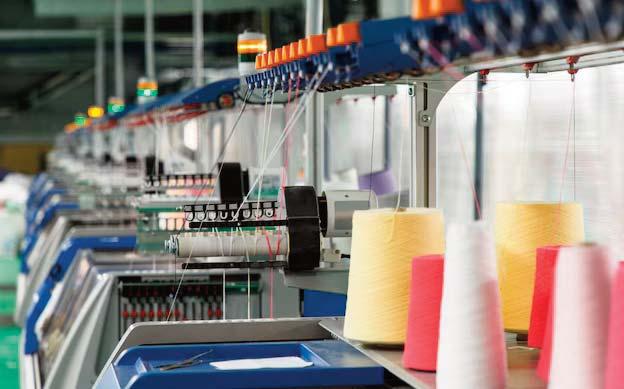
concluded FY 2024-25, exports rose slightly to $17.88 billion.
In a joint appeal, the Pakistan Hosiery Manufacturers & Exporters Association (PHMA) and the Pakistan Readymade Garments Manufacturers & Exporters Association (PRGMEA) have urged the government to consider and implement key proposals aimed at improving the textile industry’s performance. The request was made during a post-budget meeting held earlier this month, where representatives from both associations gathered to discuss the sector’s concerns with the FBR’s Budget Anomaly Committee.
Among the attendees were PHMA chairman Abdul Hameed, former PHMA
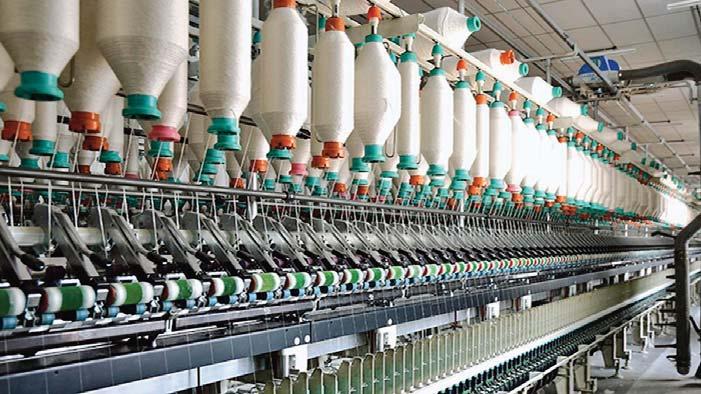
chairmen Naseer Butt and Shehzad Azam Khan, PRGMEA Chairman Dr. Ayyazuddin, and former PRGMEA chairmen Ijaz Khokhar and Sohail Afzal Sheikh.
The associations have submitted a series of recommendations, which they believe can help boost the struggling textile export sector. The group has called on the government not only to carefully examine these proposals but also to implement the suggestions outlined in the final report from the Anomaly Committee once it is compiled.
Abdul Hameed, Chairman of PHMA, highlighted the vital role that Pakistan’s value-added textile sectors—such as apparel, bed linens, home textiles, and towels—play in the national economy. These sectors generate over $11 billion annually in exports and support millions of jobs. However, he expressed deep concern over the shift from the simplified Final Tax Regime (FTR) to the more complex Normal Tax Regime (NTR), which has introduced both a 1% minimum tax and a 1% advance tax on export proceeds. These taxes apply regardless of whether the exporter makes a profit or not, creating additional financial strain.
Naseer Butt, a former PHMA Chairman, criticized the introduction of dual taxation, calling it counterproductive and harmful to the already struggling export sector. He noted that small and medium-sized enterprises (SMEs), many of which operate on very narrow profit margins, could face closure if this policy is not reconsidered.
Former PHMA Chairman Shehzad Azam Khan also raised concerns about the growing challenges faced by exporters, such as persistent delays in refunds, rising production costs, and inflation. He emphasized that many exporters are already paying more in taxes than they are making in profits and urged the government to address these financial burdens urgently by facilitating quicker refunds and ensuring stable energy pricing.
Dr. Ayyazuddin, Chairman of PRGMEA, raised alarms over recent changes to the Export Facilitation Scheme (EFS), particularly the removal of the zero-rating on local purchases and the imposition of sales tax on imported cotton yarn. He argued that these changes directly contradict the objectives of the EFS, which was intended to ease liquidity pressures and simplify export processes.
Ijaz Khokhar, former PRGMEA Chairman, pointed out that Pakistan’s regional competitors, such as Bangladesh and Vietnam, offer tax-free access to raw materials, giving their exporters a significant edge. He called for a return to
the original framework of the EFS, which included zero-rated local inputs and sales tax exemptions on key imported materials.
Sohail Afzal Sheikh, another former PRGMEA Chairman, called for the immediate restoration of Regionally Competitive Energy Tariffs (RCET), which had been suspended. He argued that the lack of RCET has led to significantly higher manufacturing costs, forcing many SMEs to reduce or halt production. Additionally, he urged the government to revive the Duty Drawback on Local Taxes and Levies (DLTL) as part of the Textile & Apparel Policy for 2025-30 and to release pending claims for DLTL and Technology Upgradation Fund (TUF).
The participants at the meeting unanimously agreed that continued tax complexities, slow refunds, and increasing production costs will only erode Pakistan's textile export base and drive businesses into the informal sector. They reiterated that the textile industry remains a cornerstone of the national economy and requires urgent and decisive policy support to stay competitive.
Concluding the meeting, PHMA Chairman Abdul Hameed called on Prime Minister Shehbaz Sharif, Finance Minister Muhammad Aurangzeb, and Commerce Minister Jam Kamal to personally intervene and ensure that the textile industry’s proposals are adequately addressed. He warned that failure to act could result in long-term losses to exports, employment, and Pakistan’s position in the global textile market.
Pakistan’s textile sector has shown impressive growth during the fiscal year 2024-25, with notable increases in the export of various textile commodities. According to data from the Pakistan Bureau of Statistics, towel exports grew by 2.61% year-on-year, with over 226,335 metric tons valued at $1.082 billion exported. This was up from 222,720 metric tons worth $1.055 billion in the previous fiscal year.
The growth in towel exports is part of a broader trend within the textile industry. Ready-made garment exports
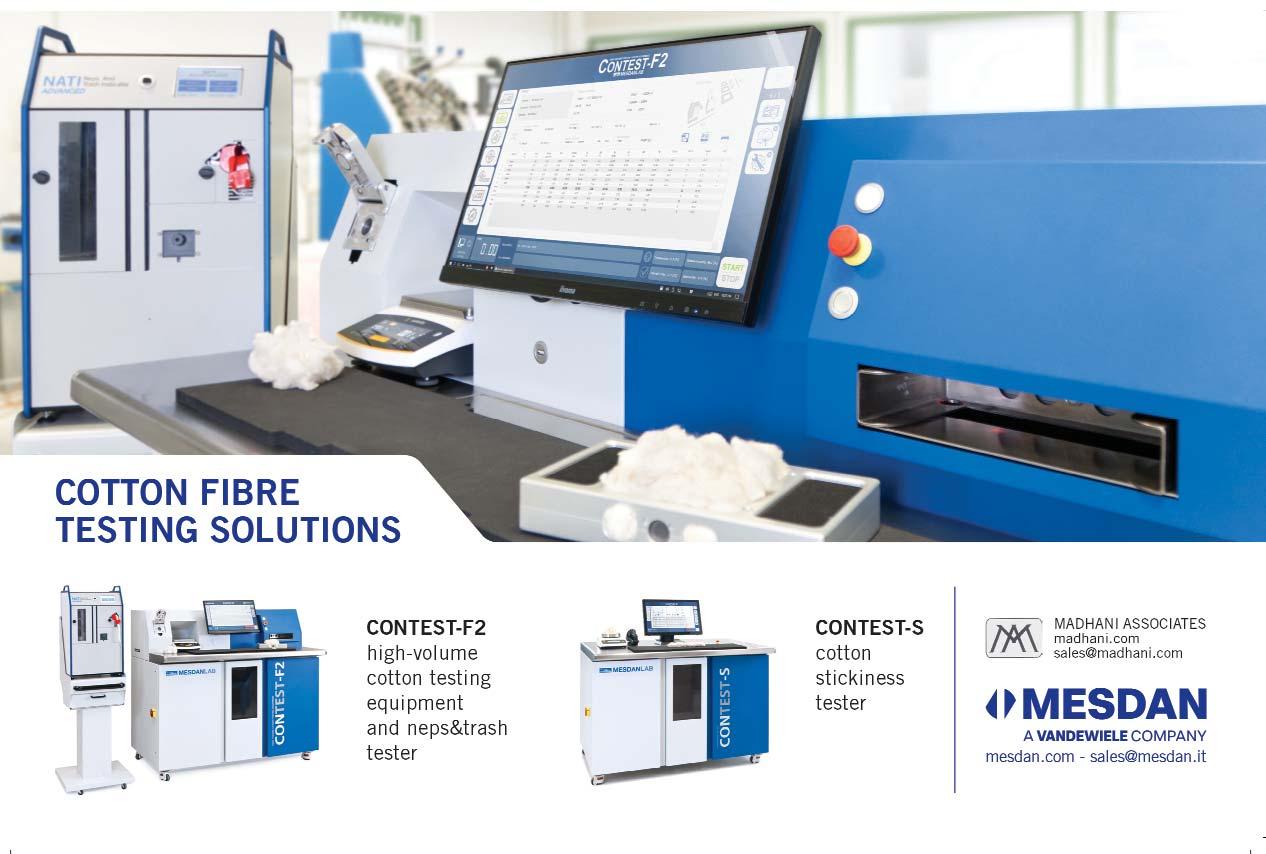
surged by 15.85% in the same period, with Pakistan exporting more than 80,147 thousand dozen of garments worth $4.128 billion. This compares to 75,754 thousand dozen valued at $3.563 billion during the previous year.
Exports of art, silk, and synthetic textiles also saw a healthy rise of 8.80%, reaching 83,918 metric tons valued at $399.515 million, compared to 82,876 metric tons worth $367.199 million in FY 2023-24.
Overall, Pakistan’s textile exports in FY 2024-25 grew by 7.39%, with total exports reaching $17.89 billion, up from $16.66 billion the previous year. This growth is attributed to several key commodities that performed well in global markets, particularly knitwear, bedwear, and towels.
Knitwear exports rose by 13.68%, reaching $5.01 billion compared to $4.41 billion in FY 2023-24, while bedwear exports increased by 11.07%, totalling $3.11 billion, up from $2.80 billion. Towels, too, contributed to the growth, with their export value rising by 2.61% to $1.08 billion from $1.06 billion in the previous year.
Other textile categories that saw growth included tents, canvas, and tarpaulin, which increased by 6.21%, reaching $124.87 million from $117.56 million last year.
The Asian Development Bank (ADB) and the All Pakistan Textile Mills Association (APTMA) held a productive brainstorming session in Lahore, discussing ways to enhance textile exports, address global challenges, and align the sector with international standards. The ADB delegation, led by Country Director Emma Fan, was accompanied by senior officials, including Asad Aleem (Deputy Country Director), Khayyam Abbasi (Programmes Officer), Shaheryar

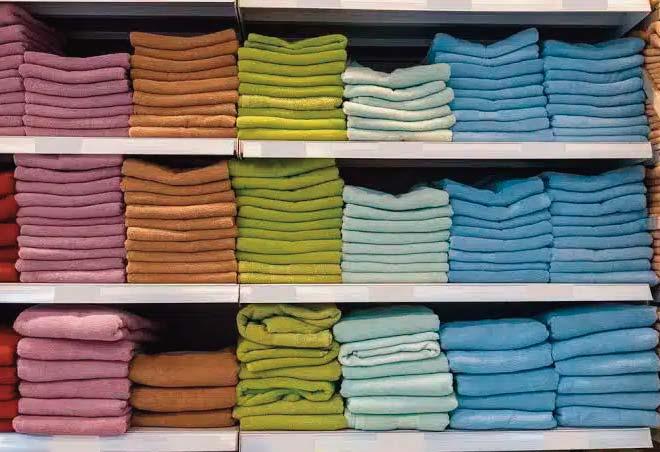
Choudhry (Senior Investment Officer), and M. Ismail Khan (Unit Head of Media Communications & Public Policy).
The ADB delegation was warmly welcomed by APTMA leaders, including Kamran Arshad (Chairman), Asad Shafi (Chairman North), Haroon Ellahi Shaikh, Muhammad Ali, Ahsan Shahid, and Raza Baqir (Secretary General), along with other prominent members of the textile sector.
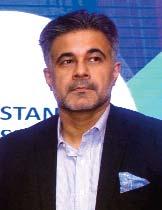
The meeting, which focused on the future trajectory of Pakistan’s textile exports, began with a call for immediate measures to align with international conventions, particularly those related to sustainability, labour rights, and human rights. ADB representatives stressed the importance of these issues in improving global competitiveness, especially as the world becomes increasingly focused on sustainable business practices.
Emma Fan highlighted ADB’s new Country Partnership Strategy for Pakistan, which identifies four key priority areas: stimulating the private sector, optimizing public sector efficiency, improving human capital, and fostering greater connectivity. These initiatives are designed to help Pakistan navigate its economic challenges while positioning the country for sustainable long-term growth.
The ADB-APTMA discussions also delved into Pakistan’s immense export potential, with a particular focus on the textile and apparel sectors. Both organizations emphasized the need for consistent, export-friendly policies and better diversification into higher valueadded products. ADB expressed a keen interest in further collaboration with APTMA, offering support to implement strategies aimed at boosting textile exports and helping the sector remain competitive on the global stage.
Kamran Arshad, Chairman of APTMA, presented an ambitious vision to elevate Pakistan’s textile export earnings to $50 billion over the next five years. This goal would be supported by the establishment of 1,000 garment manufacturing plants equipped with plug-and-play infrastructure in specialized Apparel Parks.
Arshad also urged ADB to assist in the development of these Apparel Parks, which he described as vital to driving export growth while creating employment opportunities for millions of workers. These parks are expected to play a significant role in poverty alleviation and help bolster Pakistan’s foreign exchange reserves.
Asad Shafi, Chairman North of APTMA, shared insights on how Pakistan's textile sector has made significant strides in compliance with international standards, especially following the EU’s GSP Plus status. He outlined how this preferential treatment has helped Pakistan expand its value-
added textile exports. Shafi also discussed the launch of a National Compliance Centre, designed to support businesses in meeting international compliance standards, as well as APTMA’s role in establishing a textile laboratory focused on DNA testing to authenticate cotton sources. The ultimate goal is to implement a unified, traceable system across the entire textile value chain, ensuring adherence to EU regulations.
The Pakistan Central Cotton Committee (PCCC), the Ministry of National Food Security and Research (MNFSR), and the All Pakistan Textile Mills Association (APTMA) have entered into a landmark agreement to resolve the long-standing cotton cess collection issue. The partnership is seen as a crucial step toward addressing the ongoing challenges faced by Pakistan's cotton industry and ensuring its future growth.
The agreement was formalized in a signing ceremony held at the MNFSR headquarters in Islamabad, with prominent figures in attendance, including Federal Minister for National Food Security and Research, Rana Tanveer Hussain, Secretary MNFSR Waseem Ajmal Chaudhary, APTMA Chairman Kamran Arshad, Chairman APTMA North Asad Shafi, Secretary General APTMA Shahid Sattar, APTMA Cotton Advisor Dr. Javed Hassan, Cotton Commissioner & CEO PCCC Dr. Khadim Hussain, and PCCC Secretary Dr. Peer Adrees.
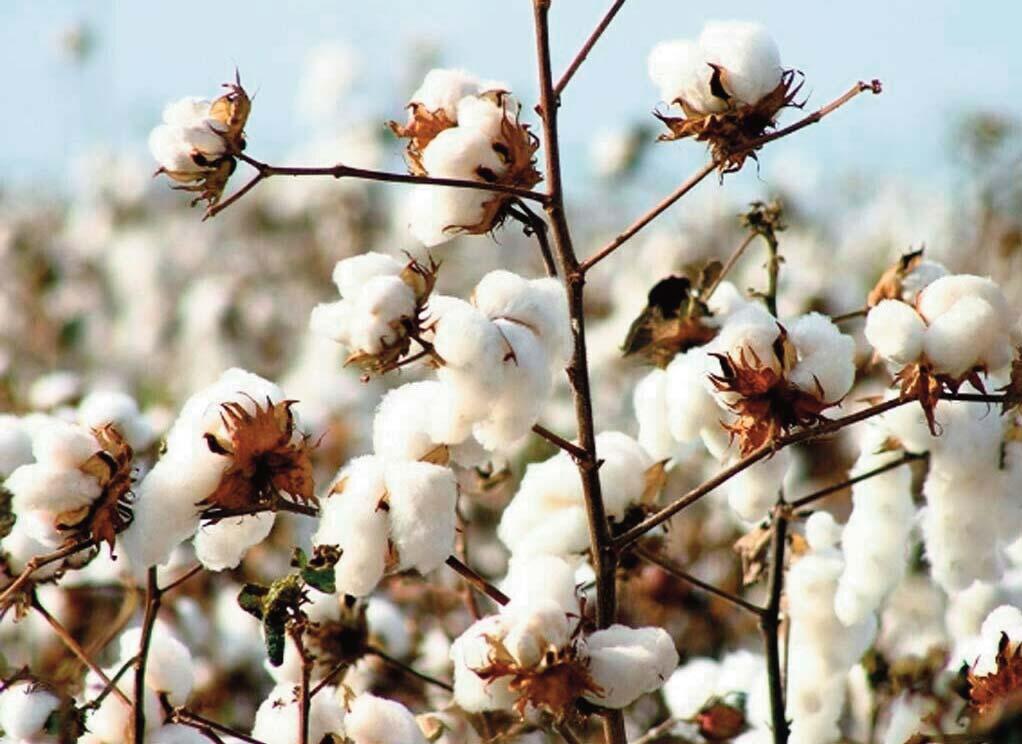
government’s full backing, including plans for a visit to APTMA House in Lahore to explore further collaboration opportunities.
Kamran Arshad, Chairman of APTMA, thanked the Minister for his proactive approach in facilitating key policy measures, such as easing cotton seed imports. He also highlighted the severe cotton shortages in recent years, which have forced Pakistan to import large quantities of cotton from countries like the US, Brazil, and Australia, placing a significant strain on the textile value chain. Arshad called this agreement a historic achievement, marking the resolution of the long-standing cotton cess deadlock and reaffirming APTMA’s commitment to addressing the cotton sector’s challenges.
domestic inputs, as well as fostering the development of local brands and globally competitive products.
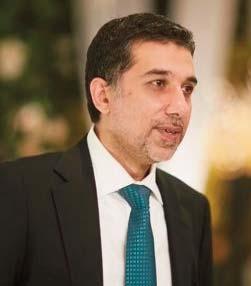
Kamran Arshad called for the swift implementation of PCCC restructuring, urging the transformation of the committee into a modern, efficient research institution. He emphasized that this would drive innovation and increase productivity in cotton cultivation, ensuring that Pakistan’s cotton industry becomes globally competitive once again. Additionally, he proposed the idea of holding an all-stakeholders conference, which would bring together farmers, ginners, and industry leaders to collaboratively chart a sustainable future for the cotton sector.
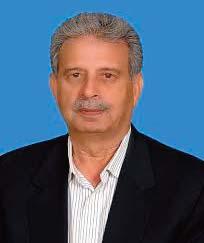
Federal Minister Rana Tanveer Hussain praised APTMA for its constructive involvement in resolving this critical issue, acknowledging that cotton is vital to Pakistan’s textile industry. He reiterated APTMA’s role as a key stakeholder and expressed strong support for its vision, particularly in leading the reform and revival of the PCCC. The Minister also assured the association of the
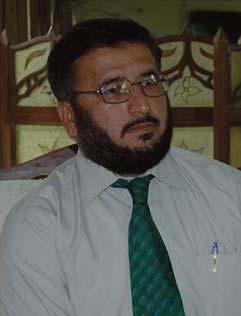
Dr. Peer Adrees, Secretary of PCCC, acknowledged the positive impact of APTMA’s ongoing support, which has helped the PCCC cover salaries and pensions for its staff, ensuring smooth operations in recent months.
Asad Shafi, Chairman of APTMA North, emphasized the critical role cotton plays in Pakistan’s textile industry. He reiterated APTMA's commitment to enhancing value addition by promoting the use of locally grown cotton and
APTMA remains steadfast in its commitment to supporting the revival of Pakistan’s cotton industry. The restoration of the cotton sector is not only critical for safeguarding millions of jobs across the textile value chain but also for strengthening the country’s textile exports. By expanding domestic value addition and increasing cotton production, Pakistan can regain its position as a leading global cotton producer—fostering economic growth, enhancing competitiveness in international markets, and ensuring the long-term success of its textile industry.

Despite economic turbulence worldwide, Bangladesh's Ready-Made Garment (RMG) sector posted a solid performance in the fiscal year 2024–25 (FY25), registering an export growth of 8.84 percent and generating $39.35 billion in revenue, according to newly published data by the Export Promotion Bureau (EPB).
The European Union retained its position as the dominant destination for Bangladeshi garments, absorbing 50.10 percent of total RMG shipments— equivalent to $19.71 billion—during the period. The United States followed with imports totalling $7.54 billion (19.18 percent), while exports to the United Kingdom reached $4.35 billion (11.05 percent). Canada also remained a notable partner, importing $1.30 billion worth of garments, accounting for 3.31 percent of the total.
Year-on-year export increases were reported across major Western markets: shipments to the EU climbed 9.10 percent, the U.S. saw a rise of 13.79 percent, and Canada recorded a 12.07 percent jump. Meanwhile, growth in exports to the UK was more modest at 3.68 percent.
Within the European bloc, Germany stood out as Bangladesh’s top RMG buyer, importing $4.95 billion worth of goods. Other significant EU markets included Spain ($3.40 billion), France ($2.16 billion), the Netherlands ($2.09 billion), Poland ($1.70 billion), Italy ($1.54 billion), and Denmark ($1.04 billion). Some countries showed remarkable growth, including the Netherlands with a 21.21 percent increase, Sweden with 16.41 percent, Poland with 9.77 percent, and Germany with 9.47 percent.
Exports to non-traditional destinations also showed upward momentum, expanding by 5.61 percent and totalling $6.44 billion. These newer markets now account for 16.36 percent of Bangladesh’s RMG exports, underscoring a shift in the global trade landscape. Among these, Japan, India, and Australia
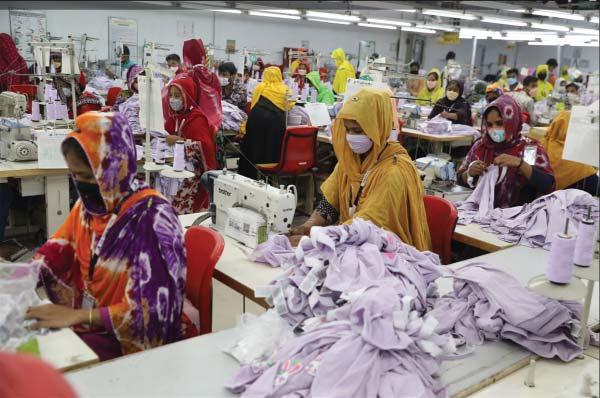
emerged as top contributors.
Significant growth rates were observed in several non-traditional markets: Turkey saw a 25.62 percent increase, India rose by 17.39 percent, and Japan experienced a 9.13 percent uptick in imports of Bangladeshi apparel. However, exports to countries like Russia, South Korea, the UAE, and Malaysia declined during the same period.
Within the industry itself, the knitwear segment led the charge with an impressive 9.73 percent growth, while woven garments followed closely with a 7.82 percent rise, reflecting strong demand across both categories.
Industry insiders noted that the global apparel sector continues to evolve unpredictably in the wake of the COVID19 pandemic, posing persistent challenges for exporters. Yet, Bangladesh has managed to maintain a resilient foothold in traditional markets, which continue to represent a commanding 84 percent share of its total garment exports.
The picture is different in nontraditional markets, where Bangladesh currently holds a 16 percent share. However, this segment represents a significant opportunity for growth. The International Trade Centre (ITC) estimates that the global apparel market reached $500 billion in 2024, with non-traditional destinations accounting for around $150 billion of that total.
Currently, Bangladesh holds a 6 percent share of this non-traditional market, highlighting untapped potential. For instance, Bangladeshi garments made
up 5.50 percent of Japan’s total apparel imports and 11.53 percent of Australia’s in 2024, signalling strong prospects for future expansion in those regions.

Egypt has attracted close to $70 million in new investments from Chinese enterprises focused on garment and textile manufacturing—industries that lie at the heart of Cairo’s economic reform program backed by the International Monetary Fund (IMF).
During high-level meetings with Chinese investors in Shanghai, Egypt’s Minister of Investment and Foreign Trade, Hassan El-Khatib, confirmed that two Chinese companies have finalized plans to establish production facilities within Egypt’s free trade zones.
One of the investors, Zhejiang Holding, expressed its intent to commit an initial $20 million to Egypt’s textile and apparel sector, with a long-term goal of scaling that investment up to $50 million over the next five years, as reported by local media outlets.
Another firm, Jiangsu Haite Fashion Company, disclosed its plans to invest approximately $20 million in the development of a new garment manufacturing plant in Egypt. According
to Arabic-language newspaper Al-Ahram, the facility will be strategically positioned to serve export markets in Europe and the United States, leveraging Egypt’s existing free trade agreements with multiple global partners.
This surge in interest follows a government-hosted visit in May, during which a large Chinese delegation representing textile firms toured potential investment sites in Egypt. The initiative was part of a broader effort by Cairo to draw foreign capital into its textile and fabric industries—a key component of the country's industrial and export strategy.
Egyptian officials regard the textile sector as both a cornerstone of the national economy and a vital source of foreign exchange. During discussions with representatives from over 30 Chinese industrial firms, authorities emphasized the rollout of a national initiative aimed at strengthening local production, increasing global competitiveness, and reducing import dependency.
In a related statement, Hani Salam, chairman of the Apparel Export Council of Egypt, noted that textile and garment exports reached $1.2 billion in 2023 and are projected to climb to $1.4 billion by 2025, reflecting sustained momentum in the sector.
Chinese companies are already heavily involved in Egypt’s industrial landscape, particularly in the Suez Canal Economic Zone (SCZONE). The zone’s chairman, Walid Gamal El-Din, revealed earlier this year that a promotional tour
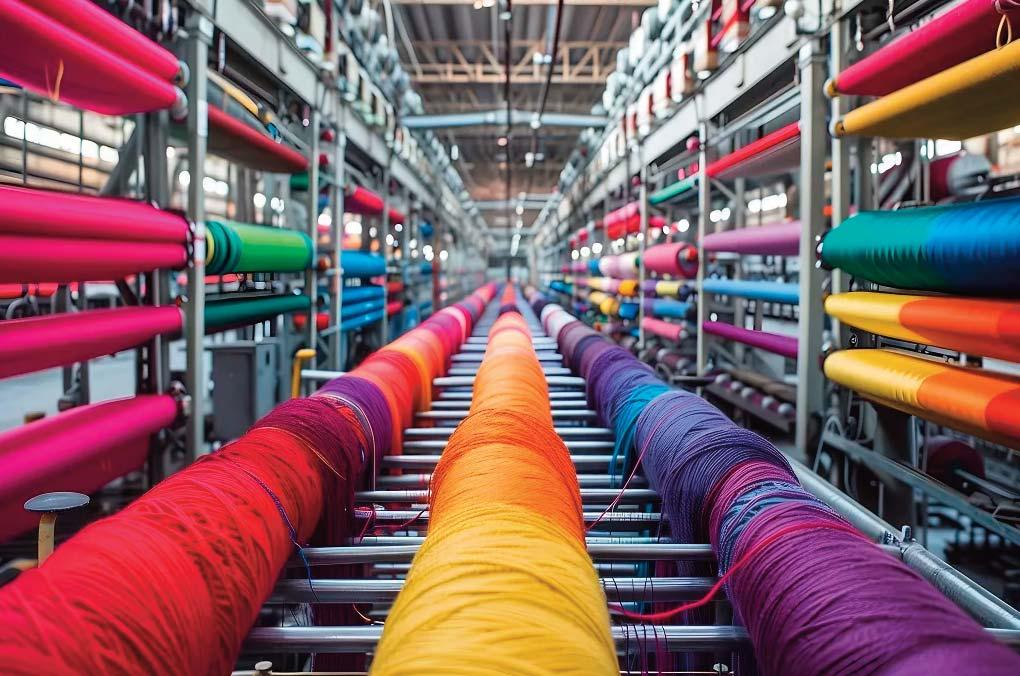
across China resulted in securing over $1 billion in new investment deals, reinforcing Egypt’s growing status as a regional hub for manufacturing and trade.

North India’s cotton yarn sector is currently treading carefully, caught between stable pricing and a downturn in both local and international demand. Market hubs such as Ludhiana, Delhi, and Panipat are seeing minimal trading
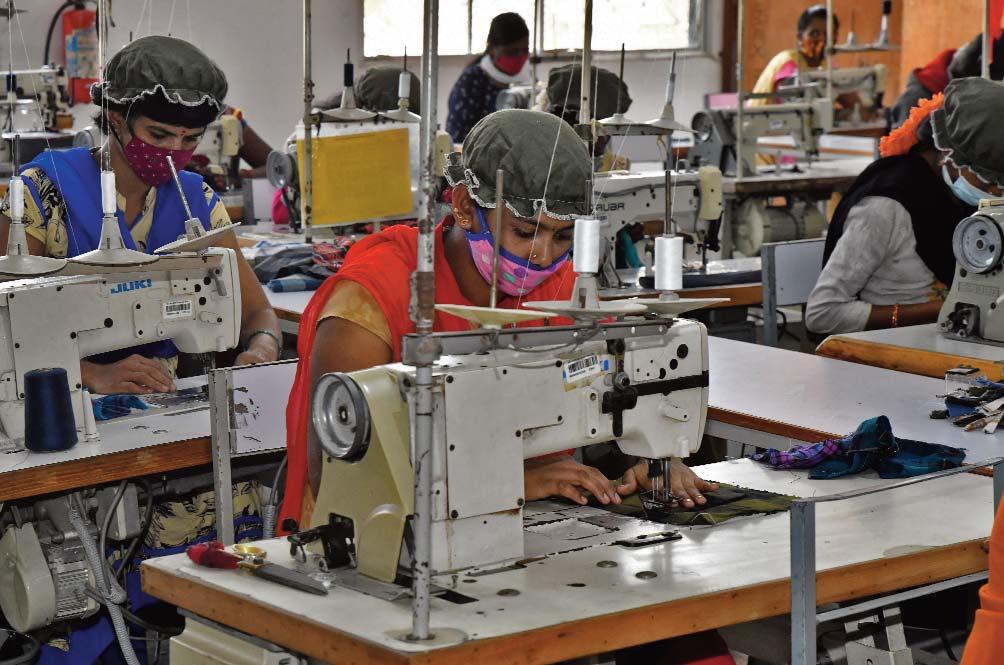
momentum, as uncertainty over global tariffs and raw material costs continues to cast a shadow over business decisions.
In Ludhiana, pricing has remained consistent, yet mills are struggling to push higher volumes. Stakeholders report that buyers—both at home and abroad—are hesitant, leading manufacturers to hold prices steady without room for increases. Current rates show 30-count combed yarn trading at $3.11–3.23/kg, while 20and 25-count combed yarns are priced at $2.99–3.17/kg. Carded yarn of 30-count is available in the range of $2.87–2.93/kg.
Delhi’s textile trade is following a similar trajectory. While prices haven’t slipped, market participants note a distinct drop-in activity. Rising cotton yarn costs and lack of clarity on U.S. tariff policies are pushing garment producers toward alternatives like polyester and viscose, which mimic cotton in feel but are more economically viable. In the capital, 30-count combed yarn for knitting is priced at $3.13–3.14/kg, with 40-count yarn fetching $3.43–3.45/kg (excluding GST).
Panipat, a centre for recycled yarn production, is also witnessing muted demand, particularly for coarse-count yarns. Some exporters are pinning hopes on a festival-season lift, but challenges such as slow payment cycles and labour shortages are limiting market revival. Recycled polyester yarn (10s grey) is being quoted at $0.90–0.94/kg, while cotton comber is trading at $1.27–1.30/kg.
Raw cotton prices have slightly declined, dropping about $0.12 per maund, as global benchmarks—including ICE futures—trend downward. North Indian arrivals remain sparse, with around 750 new bales reported. In Punjab, cotton is trading between $68.67 and $68.80 per maund, while Haryana’s prices range from $66.63 to $67.23 per maund.
Overall, the region’s cotton yarn industry is caught in a cautious pause— stabilized by pricing but restrained by weak consumption and external policy headwinds. Until trade conditions become clearer and seasonal demand kicks in, the market is expected to remain in a wait-and-watch mode.

Japan’s Clothing Imports Hit $12.1 Billion, Marking 6.8%
Growth in H1 2025
Japan’s appetite for foreign apparel continued its upward trajectory in the first half of 2025, with clothing imports rising by 6.8% year-over-year to reach an estimated $12.1 billion. The surge reflects growing consumer demand, a rebound in retail activity, and an expanding preference for diverse and high-quality fashion.
According to the latest figures from the Ministry of Finance, import values for June 2025 alone stood at $1.9 billion—a robust 8.2% increase compared to the same month last year. The rise has been largely credited to the post-pandemic normalization of shopping habits, as well as the lifting of restrictions that had earlier dampened consumer spending.
China remained the dominant supplier during the period, delivering over 60% of Japan’s total apparel imports. Other key contributors included Vietnam and Bangladesh, both of which also played vital roles in supporting Japan’s demand for clothing during the first six months of the year.
The growing inflow of garments aligns with shifting consumer tastes in Japan, where shoppers are increasingly drawn to international styles and premium apparel. Industry analysts note that Japanese consumers are not only
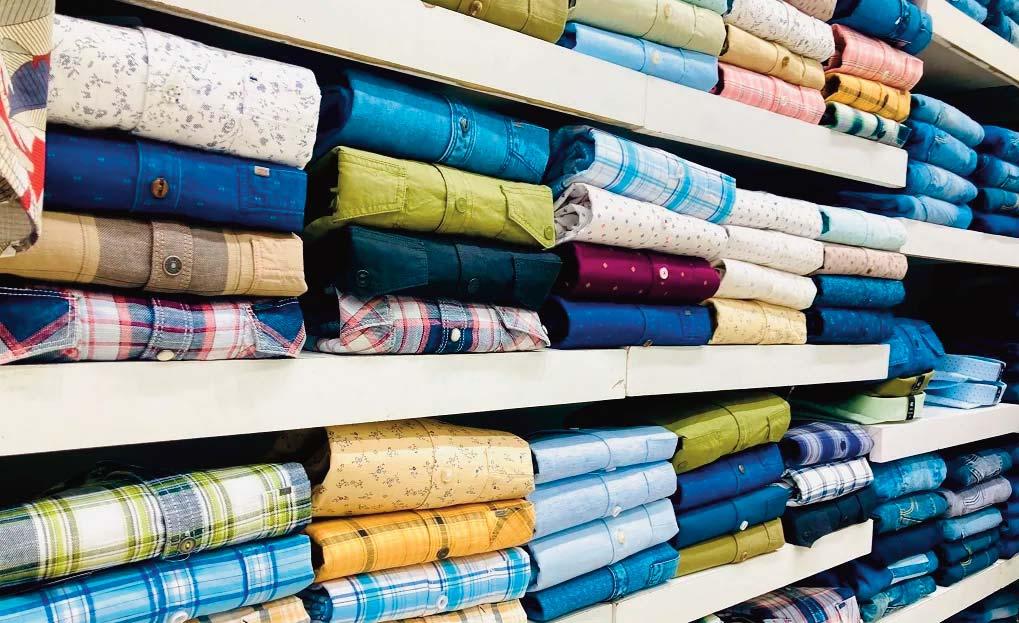
seeking variety but are also becoming more receptive to global fashion influences, particularly with international travel now back on the rise.
The outlook for the remainder of 2025 remains optimistic. Market observers expect the upward trend in apparel imports to continue, buoyed by the revival of brick-and-mortar retail, the strength of e-commerce platforms, and consumers’ sustained interest in trenddriven, globally sourced products.

Nigeria’s reliance on imported textiles has escalated sharply over the past five years, with total textile imports skyrocketing by 297.8 percent—from N182.53 billion in 2020 to N726.18 billion in 2024, according to data from the Nigeria’s National Bureau of Statistics.
The statistics reflect a consistent annual increase: N278.8 billion in 2021, N365.5 billion in 2022, and N377.1 billion in 2023, before reaching its current peak. This trend highlights a growing gap between domestic production capacity and consumer demand in the country’s apparel and textile sector.
Industry analyst and investment strategist, Gagan Gupta, believes this trajectory can be reversed. As the founder and CEO of Arise Integrated Industrial Platform (ARISE IIP)—a pan-African developer of industrial zones—Gupta
recently addressed the issue during a forum themed “The Journey to Making Africa a Global Manufacturing Hub.”
He emphasized that Nigeria has the foundational resources to become a global contender in textile production. "Nigeria produces cotton locally and has the potential to develop an internationally competitive textile value chain," Gupta said, noting the nation’s opportunity to tap into the $10.3 billion global apparel export market.
Despite this potential, Gupta warned that Nigeria risks squandering one of its most strategic industrial opportunities without immediate reforms and targeted infrastructure investments. He pointed out systemic issues like poor access to capital, limited financing options for local manufacturers, and the burdensome cost of foreign exchange—factors that continue to hamper procurement of both raw materials and machinery.
“Even with abundant natural resources, a sizable workforce, and a growing domestic market, Nigeria’s advantages are undermined by inadequate industrial policy, logistical challenges, and underdeveloped support systems,” Gupta remarked.
He advocated for comprehensive reforms, including modernization of textile facilities, reliable energy supply, improved transport infrastructure, and better financing channels for industrial players.
Gupta concluded that revitalizing Nigeria’s textile industry will require strategic alignment between government policies and private sector initiatives. He underscored the need to shift from
exporting raw materials to producing value-added goods locally, calling for a unified effort to embed the textile industry within both regional and global supply chains.

The United States witnessed a 6.59% increase in textile and apparel import volumes during the first five months of 2025, signalling a rebound in the sector following recent economic disruptions. This upward movement, fuelled by renewed consumer spending and inventory restocking, reflects growing momentum in both retail and ecommerce channels.
According to newly released trade figures, the total value of these imports from January through May reached approximately $31.67 billion. The steady growth illustrates the resilience of the U.S. fashion supply chain and the industry's agility in adapting to evolving shopper behaviour and logistical challenges.
Apparel imports were a key driver behind the increase, with a notable rise in garment shipments as retailers moved to replenish depleted stock levels. The appetite for diverse clothing styles, seasonal collections, and fast-moving fashion trends—amplified by the strength of online retail—has continued to push import volumes upward.
China maintained its position as the largest exporter of textile and apparel goods to the U.S., contributing a substantial portion of the overall import share. Other major exporters, including Vietnam, Bangladesh, and India, also recorded higher shipment volumes to the American market during the same period, indicating a competitive landscape among key sourcing nations.
As the U.S. economy continues to stabilize, analysts forecast sustained growth in import activity, driven by increasing consumer confidence and ongoing diversification of product offerings. This competitive environment may also translate into broader choices and improved pricing for end consumers.
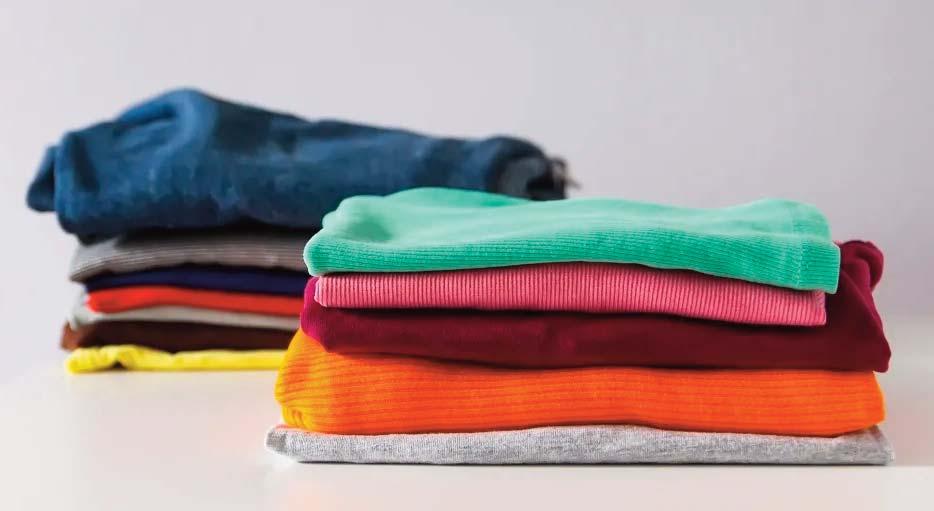
The January–May data not only reflects the sector’s capacity to rebound but also points to future expansion opportunities. Industry stakeholders are already looking toward integrating innovation, sustainability, and trendaligned collections to meet the demands of a post-pandemic marketplace.

Vietnam’s textile and garment industry posted a strong rebound in the first six months of 2025, achieving an estimated 11% increase in export value year-on-year, thanks to large-volume orders, timely production, and a strategic focus on delivery execution. The sector's profitability surged by 30–40%, signalling improved efficiency and pricing power across the board, according to the Vietnam National Textile and Garment Group (VINATEX).
Speaking at a media briefing, VINATEX Chairman Le Tien Truong said that over the January–June period, VINATEX recorded consolidated revenue of 9.035 trillion VND (approximately $345 million USD), representing 49% of its full-year target and a 108% increase over the same period in 2024. Pre-tax profit reached nearly 556 billion VND (~$21.5 million USD)—61% of the annual goal and a 197% jump compared to the first half of 2024.
Truong noted that profitability outpaced revenue growth, a positive sign that firms secured better pricing due to
earlier-than-usual order placements. He attributed this to improved global demand and leaner inventories early in the year, which prompted buyers to make more consistent and sizeable orders—unlike the fragmented buying patterns seen in 2024 that had raised production costs.
The spike in order activity also followed the U.S. government's April 9 decision to delay reciprocal tariffs by 90 days, prompting a wave of urgent orders and flexible delivery terms. According to Truong, this allowed Vietnamese producers to negotiate delivery windows and share logistical costs more effectively.
In total, Vietnam's textile and garment exports in H1 2025 reached nearly $22 billion, representing a 10% increase from the same time last year, as reported by state media outlet Nhan Dan. Industry officials anticipate that, if current trends continue, full-year exports could hit between $46–47 billion USD, cementing the industry’s position as one of Vietnam’s top export earners.
Despite the upbeat figures, Truong cautioned that the second half of 2025 remains uncertain. Some manufacturers already have orders secured through August or September, but key year-end negotiations are still underway. "In this business, there's no such thing as zero risk," he stated, adding that manufacturers must accept exposure in order to preserve client relationships and global competitiveness.
For the full year, VINATEX is aiming for 18.3 trillion VND (approx. $700 million USD) in consolidated revenue— roughly on par with 2024—and a pre-tax profit of 910 billion VND (~$35 million USD), representing a 9% annual increase.
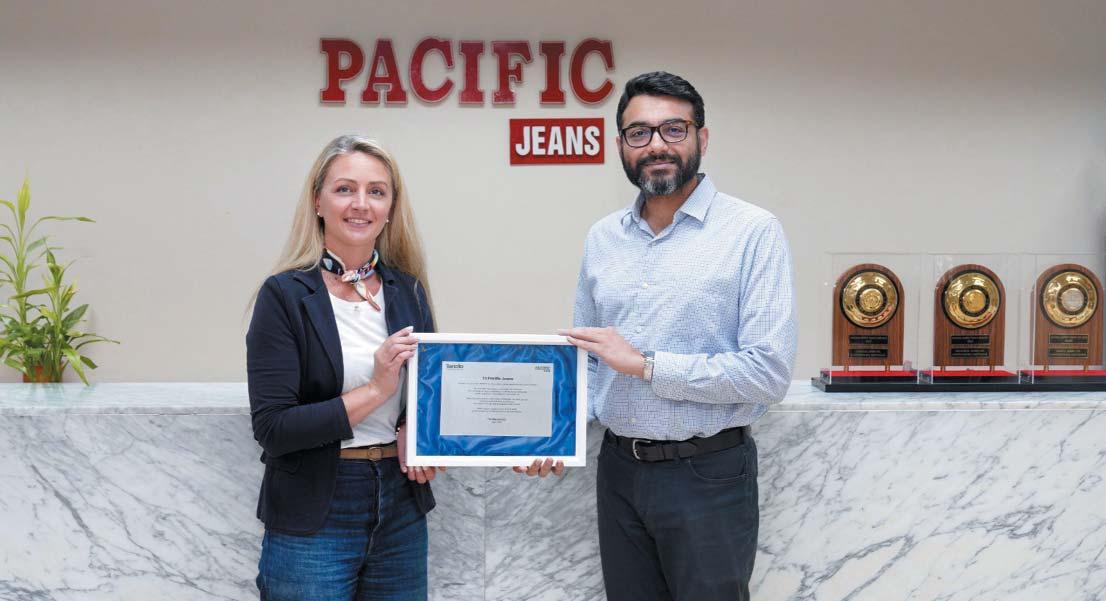
A meaningful chapter in the long-standing relationship between Tonello and Pacific Jeans is being written with the delivery of Tonello’s 10,000th machine: a moment marked not by numbers alone, but by the journey behind them.
The partnership began in the early 1990s, when Pacific Jeans’ visionary founder, Mr. M. Nasir Uddin, recognized the potential of innovation to transform garment production in Bangladesh. At a time when the denim industry in Asia was still emerging, Pacific Jeans became the first company in the region to adopt Tonello technologies, starting with a G1 360 machine. That early collaboration, between Mr. M. Nasir Uddin and Mr. Flavio Tonello, opened a new path, setting a standard for excellence and forward-thinking that would inspire an entire market.
Today, the relationship continues through the next generation. Mr. Syed M. Tanvir and Mr. Syed M. Tahmir, sons of Mr. Nasir, have carried the family’s vision forward, working alongside Ms. Alice Tonello and the Tonello team to strengthen and expand a partnership built on shared values: a spirit of exploration, innovation, and responsibility. Over the
decades, the collaboration has grown not only at a professional level but also through a bond of mutual trust and respect between two families.
“This 10,000th machine symbolizes more than a production milestone,” said Ms. Alice Tonello, R&D and Marketing Director. “It reflects decades of collaboration, during which we've grown and learned together, always driven by a common curiosity to anticipate trends and embrace new challenges.”
The new machine, heading to Pacific Jeans’ facilities, integrates Tonello’s latest responsible and digital innovations. Yet, while technologies have evolved, the heart of the relationship remains unchanged: a shared commitment to shaping the future of responsible garment production.
On this occasion, Mr. Syed M. Tanvir, Managing Director of Pacific Jeans, shared his reflections:
"My father, Mr. M. Nasir Uddin, was a visionary entrepreneur who pioneered premium jeans manufacturing in Bangladesh. In the early 90s, he recognized the value of Tonello’s G1 360 and introduced advanced laundry technology when few could imagine it.
Our partnership with Tonello grew over time, rooted in shared values of innovation, excellence, and quality. Both companies are driven by the pursuit of smarter, more sustainable laundry solutions for the apparel industry.
Tonello’s commitment to advancing washing technology is inspiring. Together, they combine our strengths to offer cutting-edge solutions that reduce environmental impact and promote responsibility toward people and the planet.
When market demands shift, Tonello responds quickly with innovative solutions, aligning with their strategy to adopt eco-friendly, efficient technologies that shape the future of the industry.
Receiving Tonello’s 10,000th machine is a proud milestone—symbolizing our growth, shared vision, and the incredible journey we've had together."
This milestone is not just a celebration of history, but a quiet tribute to the visionaries who saw beyond their time, and to the generations who continue to build on that foundation with care, resilience, and imagination.
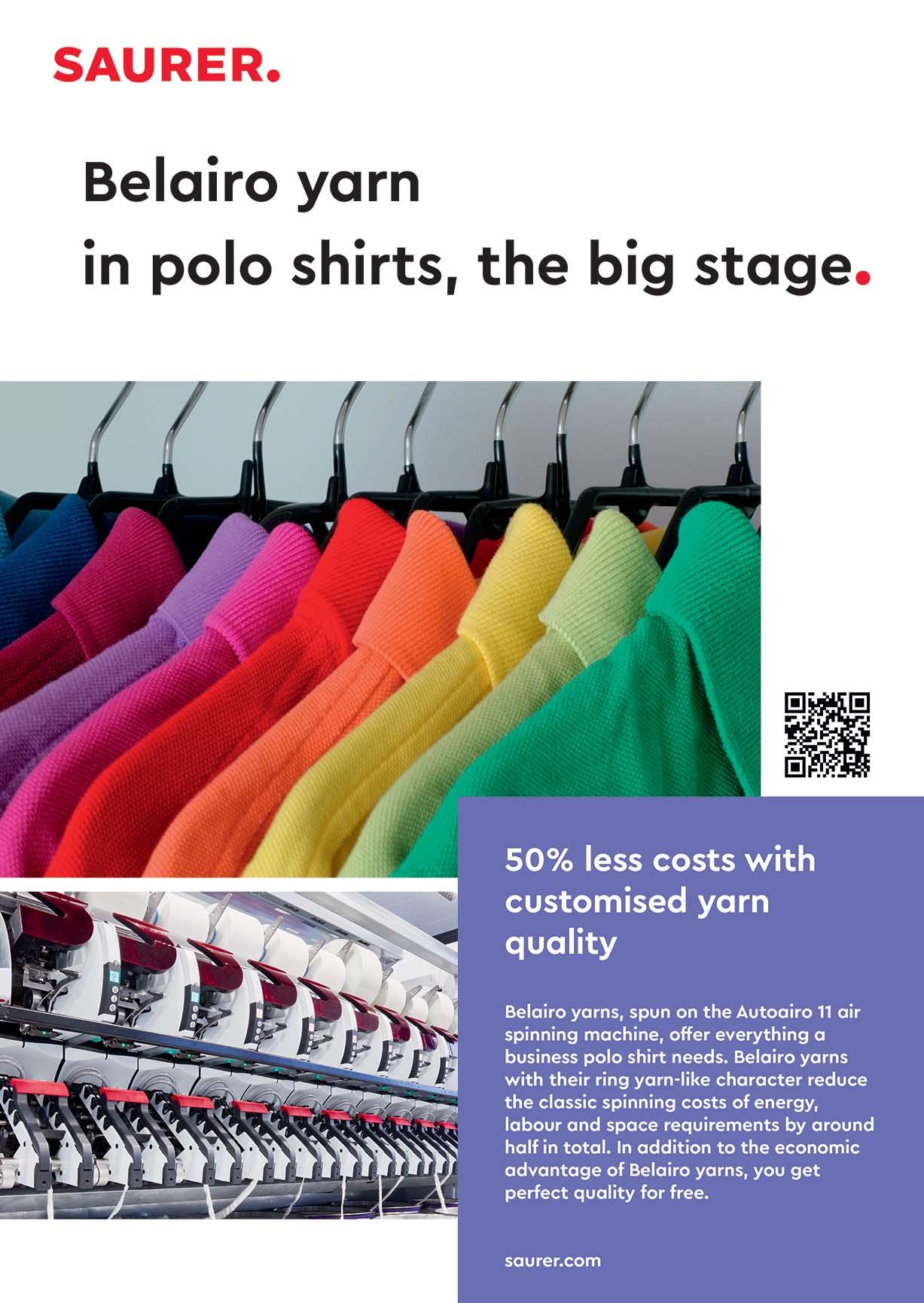
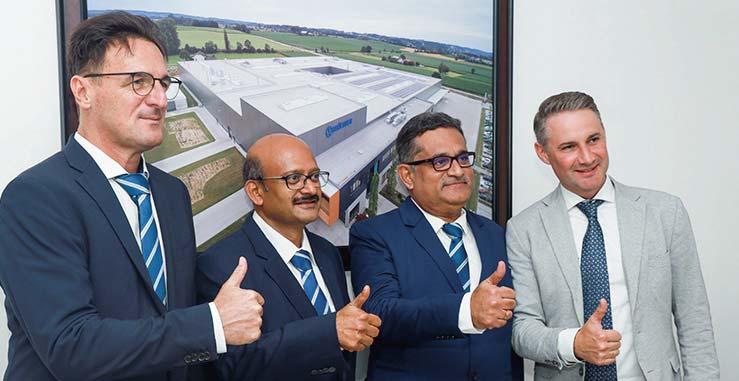
With the establishment of Brückner Textile India Pvt. Ltd., the Brückner Group, based in Leonberg, Germany, marks another important milestone in its long and successful company history. The new subsidiary in Coimbatore, India, brings Brückner significantly closer to its Indian customers – both geographically and strategically. “Having a presence on the ground enables us to respond more quickly, precisely, and flexibly to the needs of the Indian market,” says the manage-
ment. “Brückner stands for German technology and precision – in India, we combine this with local speed and agility.”
The new subsidiary offers the full range of Brückner’s products and services: new machines, modifications, spare parts, technical consulting, machine upgrades, and after-sales service. All machines are still manufactured in Tittmoning, Bavaria, Germany, while sales, installation and service are handled by the newly formed local team in India.
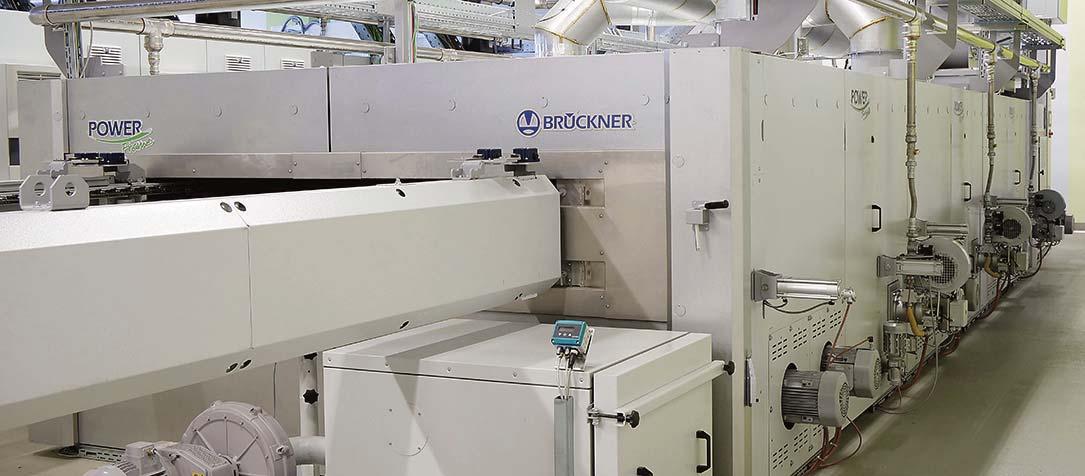
The leadership of Brückner Textile India Pvt. Ltd. reflects deep industry experience and regional expertise: Mr. Thomas Wiget, who brings over 31 years of professional experience in India, has been appointed as Director of the subsidiary. Mr. A. Venkatesh Babu is responsible for sales across India, with a particular focus on the Eastern and Southern regions, while Mr. Vinod Kumar V. manages sales in the Northern and Western parts of the country. Together, this experienced team ensures close customer proximity, professional consultation and reliable support throughout India. With the foundation of Brückner Textile India Pvt. Ltd., the familyrun company underlines its longterm commitment to the Indian market and continues to strengthen its global sales and service network.
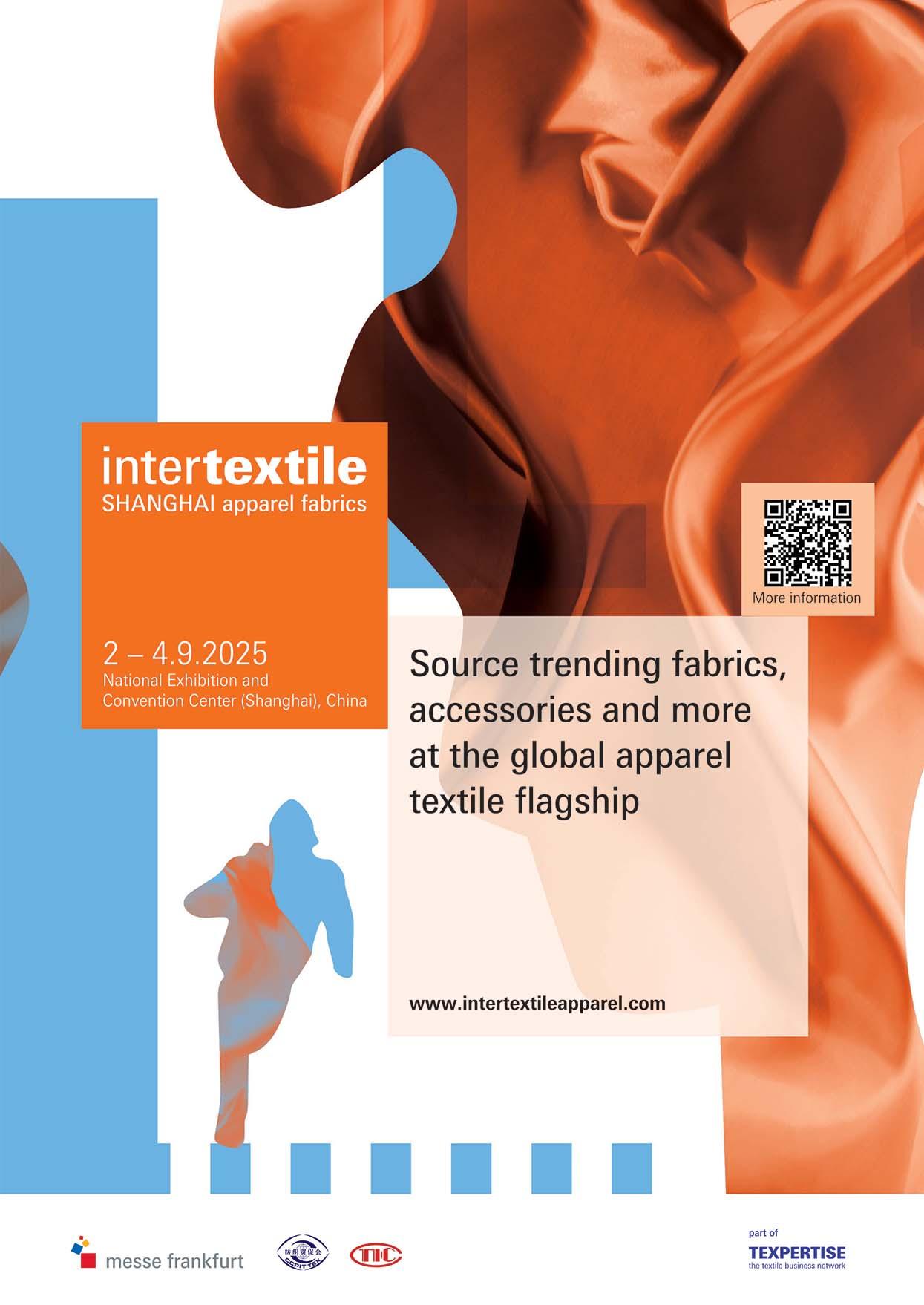
YKK Corporation Headquarters: Chiyoda-ku, Tokyo; President: Koichi Matsushima; hereinafter “YKK”) has been selected for top honors by the international environmental non-profit organization CDP1 as a Supplier Engagement Leader in their FY2024 Supplier Engagement Assessment2 for the third consecutive year.
This recognition shows that YKK has been evaluated as a global leader for its initiatives, ranging from governance and targets to reduce GHG emissions throughout the entire supply chain to efforts to reduce GHG emissions in collaboration with suppliers.
In February 2025, YKK was recognized with the top “A” rating in the 2024 Climate Change Survey, which was also conducted by CDP, for the second consecutive year.
YKK will continue to work on climate change action and transparent information disclosure based on the netzero target outlined by the Science Based Targets (SBT) initiative.
Comment from Takayuki Aoki, Vice President of Procurement & Logistics, YKK Corporation
Since the YKK Sustainability Vision 2050 was formulated in October 2020, the organisation has undertaken various initiatives to meet their sustainability targets. We are guided by the YKK Philosophy of the CYCLE OF GOODNESS®, which states that “No one prospers without rendering benefit to others.” In addition to their own activities to reduce GHG emissions, YKK also collaborates with suppliers to promote initiatives to contribute to reducing GHG emissions globally through engagement initiatives. To give specific examples, they work with strategic partner suppliers who agree with YKK’s vision to develop lowcarbon materials and use them in their fastening products. YKK will also contribute to bringing about a sustainable society by reducing emissions throughout

their supply chain through the establishment of a closed-loop recycling model, among other measures.
YKK Corporation’s sustainability goal is to achieve climate neutrality by 2050. YKK is working on five themes: Climate Change, Material Resources, Water Resources, Chemical Management, Respect People, along with ten SDG goals related to each of these, and each year reports on its state of progress in the YKK Integrated Report, “This is YKK.”
YKK is constantly pursuing the creation and realization of a sustainable society through our business. At the core of all their corporate activities is the philosophy of YKK founder Tadao Yoshida, the CYCLE OF GOODNESS® The idea that “no one prospers without rendering benefit to others” clearly expresses the YKK Group’s corporate spirit of continuing to prosper together with society, customers, related industries, and employees, and is highly compatible with sustainability.
Tadao Yoshida repeatedly shared the essence of this corporate spirit with employees in a variety of ways. His words “business is like building a bridge,” which are connected to the CYCLE OF GOODNESS®, can be understood in terms of the SDGs, as he believed that unless we benefit society as a whole, we will not be able to prosper ourselves. The words “manufacturing like clear spring
water” and “trash can be a great resource if it is utilized with ingenuity” are linked to environmental consideration, and the words “the strength of a forest is better than a big tree” are linked to respect for human rights and individuality. Today’s circumstances and context differ significantly from the time when our founding president spoke these words, but a philosophy that is highly compatible with sustainability has nevertheless been at the core of YKK’s management since those early days. It continues to be inherited at the company even today, more than 80 years later.
1CDP: An international non-profit organization with a global system to disclose environmental information by companies and local governments. Since its inception in 2000, the CDP has led efforts to encourage companies to disclose their environmental impact, reduce GHG emissions, and protect water resources and forests by leveraging capital markets and corporate purchasing power. The organization sends surveys to companies about their environmental activities, then analyzes and evaluates their responses. The number of companies disclosing their data through CDP is on the rise, with over 24,800 companies worldwide that disclosed their environmental data in 2024.
2Supplier Engagement Assessment: Companies that respond to the CDP Climate Change Questionnaire and receive the highest rating in their efforts to reduce CO2 emissions in collaboration with their suppliers, in addition to their climate change score, are selected as “Supplier Engagement Leaders.”
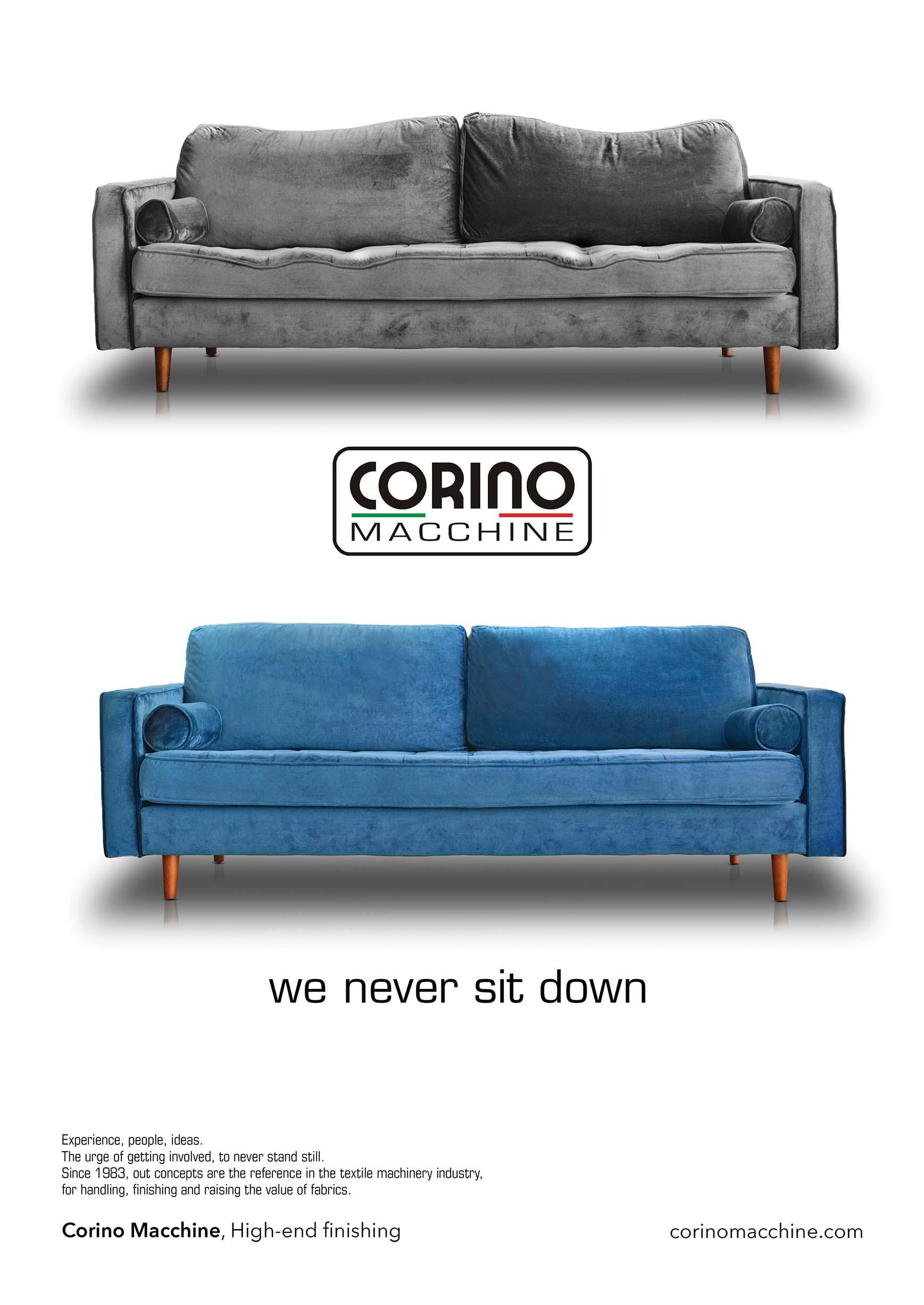
Archroma, a global leader in specialty chemicals, launched CYCLANON® XCW e, an innovative washing-off auxiliary that improves productivity and reduces resource consumption in cellulosic dyeing while delivering outstanding color fastness, even in difficult high-electrolyte or hard water conditions.
“With CYCLANON® XC-W e, we are building on our proven trio-polymer platform to give mills a way to meet rising brand expectations for durable, high-quality casual wear with a lower environmental footprint – all at a cost profile comparable to conventional washing-off agents,” said Dhirendra Gautam, VP Global Marketing and Strategy, Archroma.
Conventional polyacrylate or copolymer washing-off agents often struggle to fully remove unfixed dye from fabric, especially when a high concentration of salt remains on it from the dye bath or under hard water conditions. This can lead to excessive rinsing and multiple washing baths. Ineffective washing-off may result in quality rejections due to backstaining or uneven shade development.
Archroma’s trio-polymer CYCLANON® XC-W e was designed to overcome these challenges, delivering
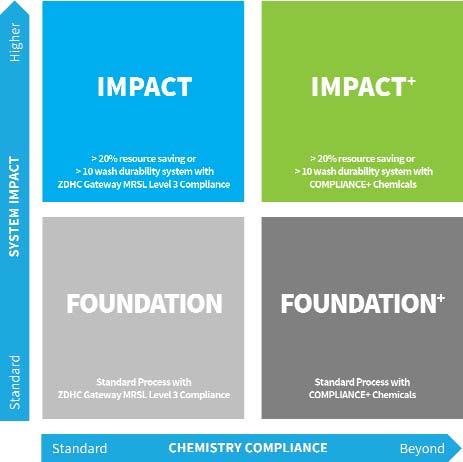

high performance, improved productivity and water and energy savings, with minimal added cost compared to conventional polymer-based products.
Exceptional wet-fastness with measurable water, energy and time savings
CYCLANON® XC-W e delivers outstanding wet-fastness by minimizing the substantivity (or ‘attraction’) of unfixed dye for the fiber. This allows more effective dye removal, reducing backstaining and improving color fastness, even with the deepest shades.
With easier unfixed dye removal, mills can reduce pre-rinsing and the number of washing baths to achieve shorter washing-off cycles and save time, water, energy and chemical inputs compared to conventional polyacrylate or copolymer washing-off agents:
Up to 15% shorter process time
Up to 20% less water used in the washing-off stage
Up to 20% lower CO2 emissions through reduced energy consumption
Up to 20% reduction in chemical use
Significant productivity gains for competitive advantage
These efficiency gains also translate into higher productivity. By shortening washing-off cycles and reducing rework,
CYCLANON® XC-W e helps mills process more fabric with existing equipment.
Up to 15% increase in throughput with the same machine set up
For example, a knit production plant producing 10 metric tons (MT) of dyed fabric per day could increase daily output by 1 MT, without expanding capacity, by using CYCLANON® XC-W e to eliminate two washing baths and reduce quality rejections.
CYCLANON® XC-W e is part of Archroma’s SUPER SYSTEMS+ portfolio and can be combined with the Blue Magic all-in-one pretreatment and NOVACRON® EC/S reactive dyes to create an end-to-end solution for highquality dyeing of 100% cotton fabrics.
The system is categorized as an IMPACT+ solution within Archroma’s SUPER SYSTEMS+ Impact Matrix. This means it delivers the highest level of resource savings, high wash durability and beyond-compliance chemicals – as compared to standard FOUNDATION processes with ZDHC Gateway MRSL Level 3 compliance.
CYCLANON® XC-W e complies with the latest regulatory and brand requirements, including stringent MRSL and RSL standards. Registration for bluesign®, ZDHC Level 3, and GOTS 7.0 are underway.
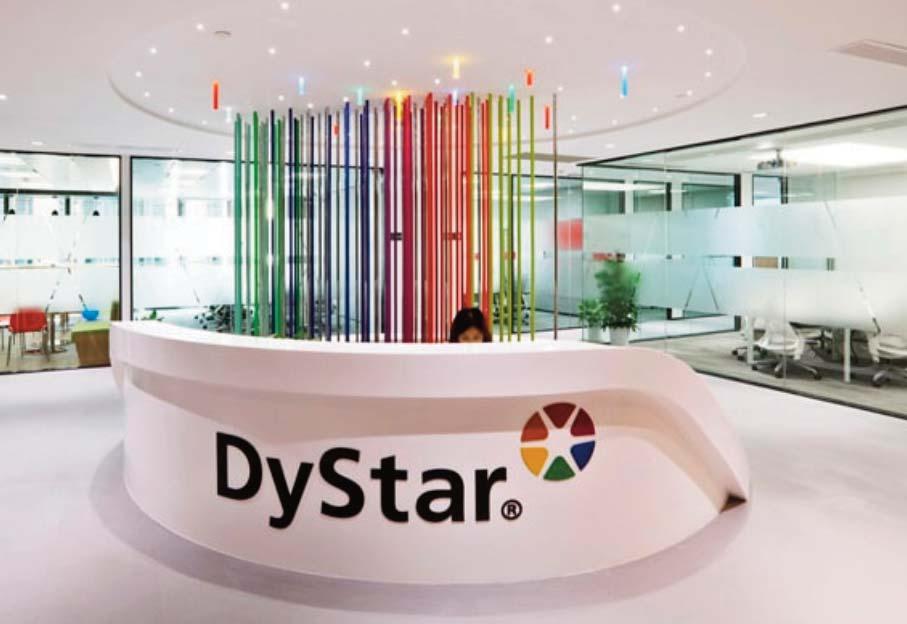
DyStar, a leading specialty chemical company with a heritage of more than a century in product development and innovation has announced that its major shareholder, Zhejiang Longsheng Group Co., Ltd has entered into a Share Purchase Agreement to acquire 37.57% of issued shares in DyStar Global Holdings (Singapore) Pte. Ltd., previously held by Kiri Industries Limited.
The acquisition follows a ruling by the Singapore International Commercial Court (SICC) mandating the sale of 100% of DyStar’s equity. As controlling shareholder with 62.43% of DyStar, Zhejiang Longsheng Group’s strategic acquisition of the outstanding shares will
result in DyStar becoming a wholly owned subsidiary. This transaction resolves the long-standing litigation with Kiri Industries, thereby avoiding a full sale of DyStar.
The total consideration is valued at USD 696.5478 million, subject to adjustments on or after the closing date. Completion is contingent upon regulatory approvals and other customary conditions with an anticipated closing date no later than November 3, 2025.
Mr. Xu Yalin, Managing Director, and President of DyStar Group said, “We are delighted with the conclusive resolution of the dispute, which enables DyStar Group to move forward with certainty, confidence, and renewed strategic focus.
This marks a significant milestone in our 30-year journey as it reinforces our longterm stability and commitment to our global stakeholders.”
This development positions DyStar to further its leadership in specialty chemicals and its value chain. The Group remains firmly committed to driving innovation, advancing sustainable practices, and pursuing strategic growth initiatives to enhance its global competitiveness.
DyStar will continue to prioritize its role as a trusted partner and responsible industry leader, delivering continued sustainable progress across the global specialty chemical sector.
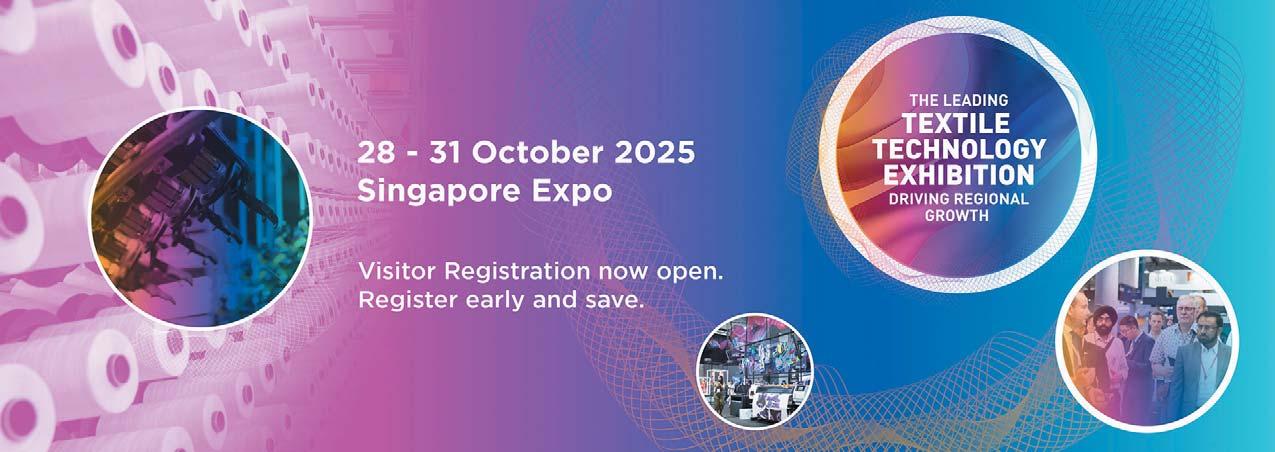
In response to mounting global regulations and the push for a circular economy, CEMATEX (the European Committee of Textile Machinery Manufacturers) is launching ITMA Sustainability Forum: Accelerating the Green Transition on 30 October at Singapore Expo.
The half-day forum is designed to help textile and garment manufacturers, particularly from South and Southeast Asia and the Middle East, navigate the European Union’s evolving sustainability regulations, and access to green financing opportunities to support their transition.
Held alongside ITMA ASIA + CITME, Singapore 2025, the forum brings together EU policymakers, financial institutions, and industry leaders to facilitate cross-border dialogue and knowledge exchange.

Mr. Alex Zucchi, President, CEMATEX, said “Sustainability has become a global priority. The textile industry must act swiftly to modernise production in line with regulatory demands and growing consumer expectations. This forum provides a much needed platform for manufacturers to better understand the EU’s legislative landscape and the financing tools available for sustainable growth.”
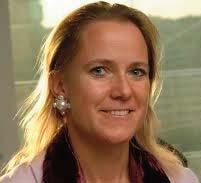
A key highlight of the forum will be the keynote presentation by Ms Kristin Schreiber, Director, European Commission DG GROW. She will provide a comprehensive overview of the EU’s sustainability roadmap and upcoming regulations driving the shift towards circular textile production.
Ms Schreiber said: “South and Southeast Asia are vital players in the global textile value chain. Many producers in these regions export to the European market, and their ability to align with upcoming requirements will be critical to a successful and inclusive transition. I look forward to exchanging perspectives at this forum on how we can collaborate globally to build a more sustainable and resilient textile industry.”
Under the EU Strategy for Sustainable and Circular Textiles, by 2030, all textiles placed on the EU market must be durable, recyclable, largely made from recycled fibres and free from hazardous substances. Manufacturers worldwide must act now to meet these requirements and remain competitive.
Programme highlights
Shaping Sustainability: Responding to EU Policy Changes
Moderator: Ms Nicole van der Elst Desai, Founder, VDE Consultancy
Speaker: Mr Robert van de Kerkhof, CEO, ReHubs


Profit Meets Purpose: Financing Sustainability
Moderator: Mr Brandon Courban, Senior Advisor (Climate), Openspace Ventures
Speakers:
Dr Rene Van Berkel, Senior Circular Economy Expert, Switch Asia, EU Policy Support
Component

Ms Iris Ng, Head, Emerging Business & Global Commercial Banking, OCBC Bank
Mr Michael Rattinger, Senior Climate Change Specialist, Asian Development Bank
Singapore Fashion Council, the official association for the textile and fashion industry in Singapore, is the programme partner of the forum organised by ITMA Services.



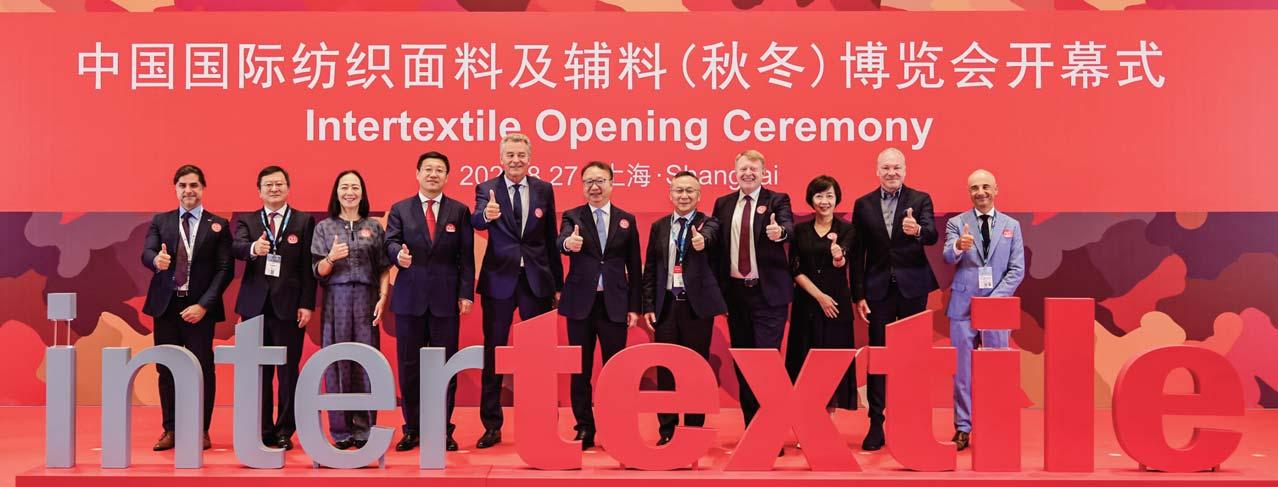
In today’s rapidly evolving textile and business landscape, staying ahead of competitors often requires access to the latest trends, innovative technologies, and strategic insights. In that regard, from 2 – 4 September 2025, Intertextile Shanghai Apparel Fabrics – Autumn Edition will once again serve as one of the industry’s premier trade platforms. This year, the fair will feature upgraded zones and expanded display areas designed to create a more seamless, more immersive sourcing and networking experience. Fairgoers can look forward to a dynamic fringe programme, including expert-led forums, seminars, and other insightful events, which should prove essential listening for industry players shaping the future of fashion.
A key highlight of the fair is the Functional Lab, which responds to the growing demand for athletic-inspired apparel. Located in Hall 4.1, this area showcases a comprehensive selection of innovative activewear fabrics, including smart textiles, outdoor materials, and sports textiles. Within the zone, leading exhibitors such as Burlington, Kbtex Warp Knitting Technology, and Unifi Textiles (Suzhou) will present their latest offerings. To further highlight the potential of functional fabrics, Functional Lab’s display area The CUBE will feature an array of advanced fabrics and accessories that merge innovation with
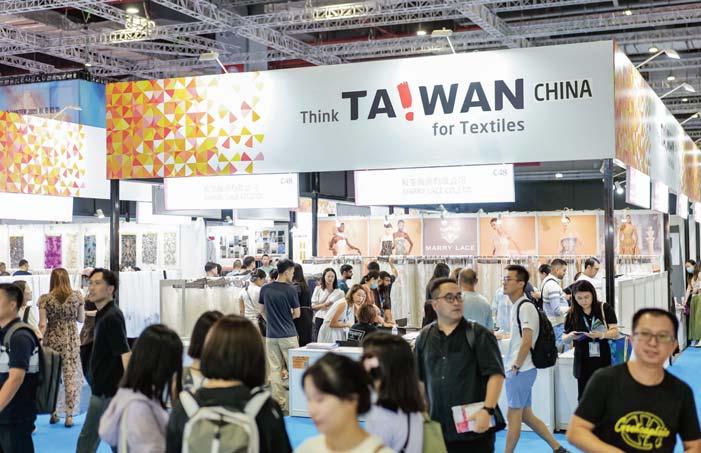
functionality, suitable for sportswear, athleisure, and protective apparel. Meanwhile, esteemed European exhibitors to showcase in Premium Wool Zone include Abraham Moon & Sons, Scop Clarenson, Thomas Mason, and Yunsa. They will showcase their latest collections, catering to the needs of modern designers and discerning consumers. Located within the zone, the former Functional Suiting Display Area will return as Bespoke Performance, further emphasising the synergy of style, functionality, and luxury. This area is set to highlight high-end textiles for suiting, shirting, and bespoke fabrics that blend performance with sophistication, offering an extensive collection of fabric samples
and garments consisting of wool, worsted, woollen, cashmere, tweed, and silk.
In addition, the Innovation & Digital Solutions Zone (previously known as Digital Solutions Zone) will spotlight advanced digital solutions, textile technologies, and materials. This specialised area will be enhanced with a series of Technology & Solutions fringe events, offering insights into how digital innovations are transforming design, manufacturing, and customer experience. Notably, The Hong Kong Research Institute of Textiles and Apparel (HKRITA) will present their Green Machine, a groundbreaking recycling system for mixed materials, demonstrating eco-
conscious advancements in textile sustainability. Additionally, Shima Seiki will showcase their latest digital fabric simulation software, while AiDLab will feature their AI-based fashion design and textile inspection technology.
To enhance the fair experience, Intertextile Apparel’s fringe programme provides industry peers with unique insights and a competitive edge within the fast-evolving fashion landscape. This edition’s curated lineup of expert-led seminars, discussions, and exclusive events aims to address the latest trends, sustainability initiatives, technological innovations, and market intelligence.
Key events include:
Intertextile Directions Trends
Autumn / Winter 2026-27: this seminar will discuss the Intertextile Directions Trend Forum’s theme
PUSH SENSATION, where
NeIlyRodi™ Agency will bring to life the wildest dreams of humankind: gentle > raw, classic > theatrical, childish > bizarre, and pragmatic > dreamlike, through a creative and inspiring display of on-trend fabrics and accessories. In addition to presenting the seminar, Mr Michael Bonzom, Creative Director of NeIlyRodi™ Agency, will provide deeper insights through the Trend Forum Tours.
FW26/27 Women's Fashion Trend Forecast: Ms Benedicte Peaudecerf, Style Designer and Trend Forecaster at PeclersParis, will present the latest trend publications, and provide inspiration and guidance through a comprehensive forecast for women's fashion for A/W 2026-27.
Texpertise Econogy
Building on the success of the previous edition, the Econogy Tour will once again spotlight sustainability in Hall 5.1. Guided visits to eco-focused exhibitors, led by an independent consultant, will facilitate in-depth discussions about the latest innovations in green textiles. Additional insightful Econogy Talks include:
Impact Now, Building Greener and Low-Carbon Sustainable Development Supply Chains: through optimising recycling materials, sustainable chemical management, low-carbon emission reduction designs, and improving ESG perform-
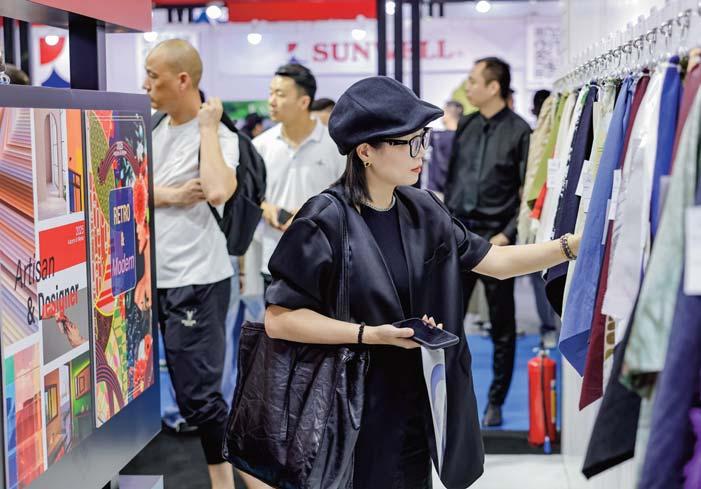
ance, SGS-CSTC Standards Technical Services will demonstrate how to create a greener, low-carbon economy and a more sustainable textile industry supply chain.
Ecodesign for Sustainable Products Regulations (ESPR): with the increasing prominence of global environmental issues, the EU is committed to promoting a green transition and a circular economy strategy. Bureau Veritas will present their services that help companies navigate and comply with the ESPR, including eco-design solutions, life cycle assessments, and environmental product declarations (EPD).
Technology & Solutions
Enhancing Fashion & Textiles through Human-AI Interaction: Professor Calvin Wong, CEO & Centre Director of AiDLab, will introduce their innovative AI-based technologies: AiDA for fashion design and WiseEye for textile inspection technology. Respectively, these solutions enhance innovation in fashion design and improve quality control for textiles.
New Era of Digital Fabric: End-toEnd DPC Solution: its design software is a key component of Shima Seiki’s end-to-end digital product creation solution. Its true-to-life fabric simulation, seamlessly integrated with physical production, is becoming the new standard for digital product creation.
Market Information & Business Strategies Opportunities in ASEAN in a Changing Trade Environment: the ASEAN Federation of Textile Industries (AFTEX) will host a forum
featuring industry representatives from across the region to share market insights and analyse emerging trends in textiles. Attendees can engage in dialogue, strengthen partnerships, and deepen their understanding of ASEAN's evolving textile landscape.
Overview of the UK Textile Industry and Opportunities for the Future: the UK Fashion and Textile Association (UKFT), one of the country's preeminent industry associations, will provide a perceptive analysis and various business insights relating to the UK‘s textile sector.
To streamline the sourcing process, buyers can more easily discover and engage with exhibitors during the fair using a range of digital tools, such as Connect PLUS. This platform enables users to refine their searches, receive AIdriven recommendations, and organise online or face-to-face meetings, via its integrated messaging feature. Additionally, it connects scheduling alerts directly to WeChat, Facebook, or SMS, enhancing the networking experience. Pre-registered visitors will automatically gain access to a Connect PLUS account. The fair is co-organised by Messe Frankfurt (HK) Ltd; the Sub-Council of Textile Industry, CCPIT; and the China Textile Information Centre. It will take place alongside Yarn Expo Autumn, CHIC and PH Value at the National Exhibition and Convention Center (Shanghai), with the venue playing host to the entire apparel textile value chain. For more details on this fair, please visit: www.intertextileapparel.com.
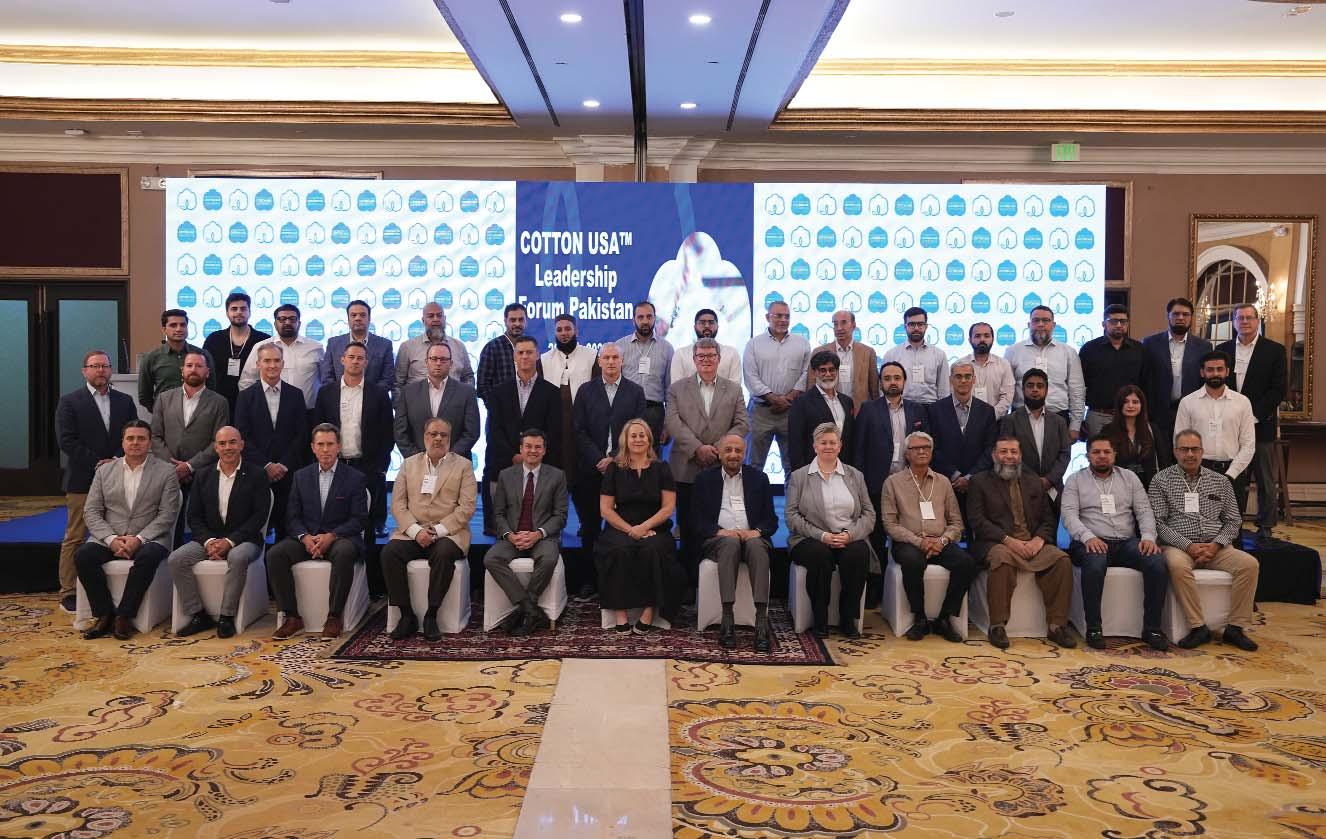
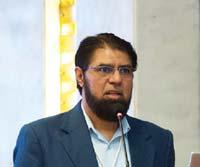







Cotton Council International (CCI) led a delegation of top U.S. cotton leaders to Karachi and Lahore for COTTON USA™ Leadership Forums, engaging prominent Pakistani textile leaders on key global cotton supply chain issues and the evolving trade dynamics between the U.S. and Pakistan. Pakistan is currently the second largest export market for U.S. raw cotton in the 24/25 marketing year; as of July 17, 2025, U.S. raw cotton fiber sales to Pakistan are 2.4 million bales.
Influential voices from Pakistan’s textile and spinning sectors (including the All Pakistan Textile Mills Association (APTMA)), U.S. cotton exporters and growers, and global trade experts discussed global cotton market trends, supply chain sustainability and
transparency, and innovative technologies shaping cotton’s future.
“Our COTTON USA™ Leadership Forums in Pakistan marked a significant milestone in strengthening U.S.-Pakistan cotton trade relations,” said Will Bettendorf, CCI director of South Asia and supply chain marketing. “The U.S. executive delegation reinforced mutual collaboration with its Pakistani counterparts toward advancing a sustainable cotton supply chain and
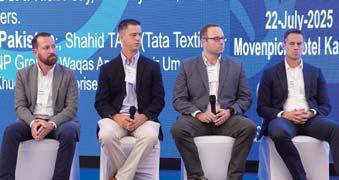



establishing a robust foundation for enduring, resilient partnerships.”
A series of expert-led panel discussions, tech-driven audience engagement tools and collaborative exercises in these executive-level forums created a high-impact platform to foster the dynamic exchange of ideas and insights between the participants.
Active involvement in the COTTON USA™ forums from Scott Urbom, U.S. Consul General in Karachi, Pakistan, and
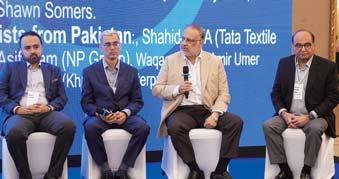

Kristin K. Hawkins, U.S. Consul General in Lahore, underscored the importance of diplomatic support in facilitating deeper U.S. cotton industry partnerships and shared economic growth with the Pakistani textile industry.
Haroon Ellahi, a leading Pakistani mill owner from the Nagina Group, praised the COTTON USA™ workshops, leadership forums and technical guidance as a transformative force in deepening U.S.-Pakistan cotton trade.
“These initiatives provide invaluable exposure to global best practices and open direct channels with American industry leaders,“ said Ellahi. “Such engagement not only elevates Pakistan’s textile capacity but also positions Pakistan to become the largest consumer of U.S. cotton in the world.
CCI’s role is pivotal in aligning both countries’ interests through collaboration, innovation and trust, a powerful step toward a stronger and robust U.S.Pakistan relationship.“
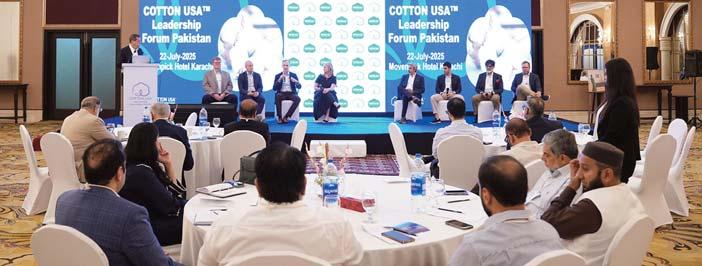
Cotton Council International (CCI) is the export promotion arm of the National Cotton Council (NCC). CCI promotes U.S. cotton fiber, yarn and manufactured cotton products around the globe under our COTTON USA™ brand. With operations in more than 50 countries and nearly 70 years of global trade expertise, our mission is to make U.S. cotton the preferred fiber for mills, manufacturers, brands, retailers and consumers around the world. To learn more, visit: www.cottonusa.org.
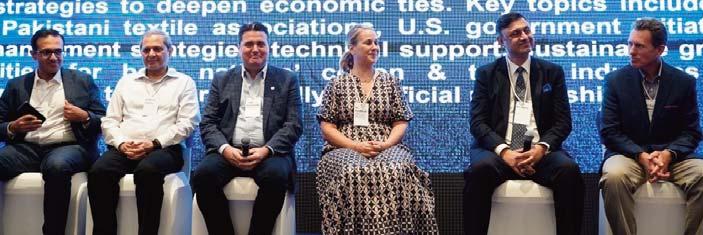
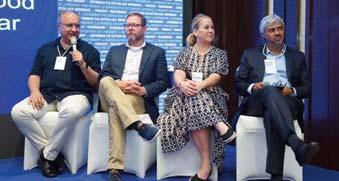
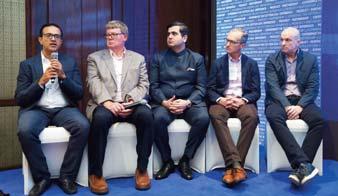
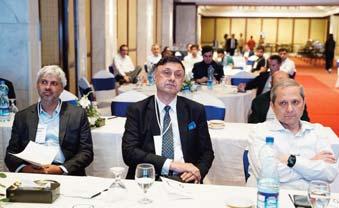

KARL MAYER Technical Textiles has had a new Managing Director since July 1, 2025. Hagen Lotzmann – a manager and expert from within the company’s own ranks – has taken over the position at the head of the company and, at the same time, the role of President of the KARL MAYER Technical Textiles business unit.
Hagen Lotzmann has been contributing to the success of KARL MAYER Technical Textiles in various fields since 2008 and has learned the company’s business from the ground up. He earned his first credentials as a development engineer in application technology and later became the primary point of contact for customers as a sales engineer. In 2013, Hagen Lotzmann moved into Sales Management and went on to head the Sales, Product Management and Application Technology departments.
This gives Hagen Lotzmann a solid foundation on which to build in his role as Managing Director. His new responsibilities are demanding: the sites in Chemnitz and Selbitz will be set up as strong locations for service, sales, and development. The production and assembly of the machines will be relocated within the KARL MAYER Group.
At the KARL MAYER stand A301 in Hall 5 of the Singapore EXPO, he hopes
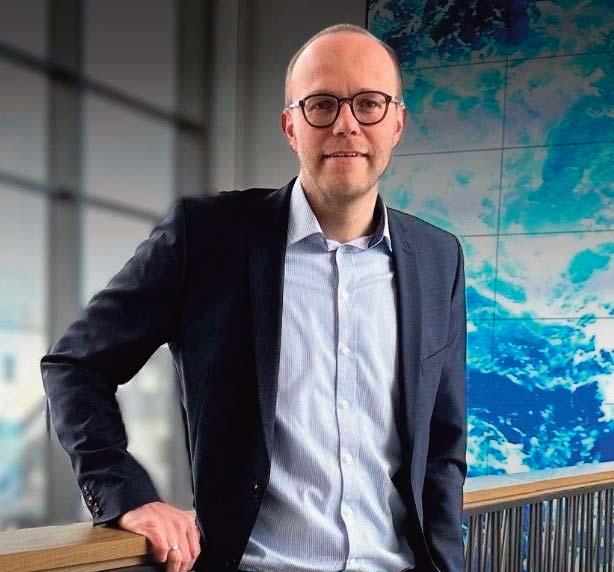
KARL MAYER is an innovative market leader as well as driving force in the textile machinery building. The
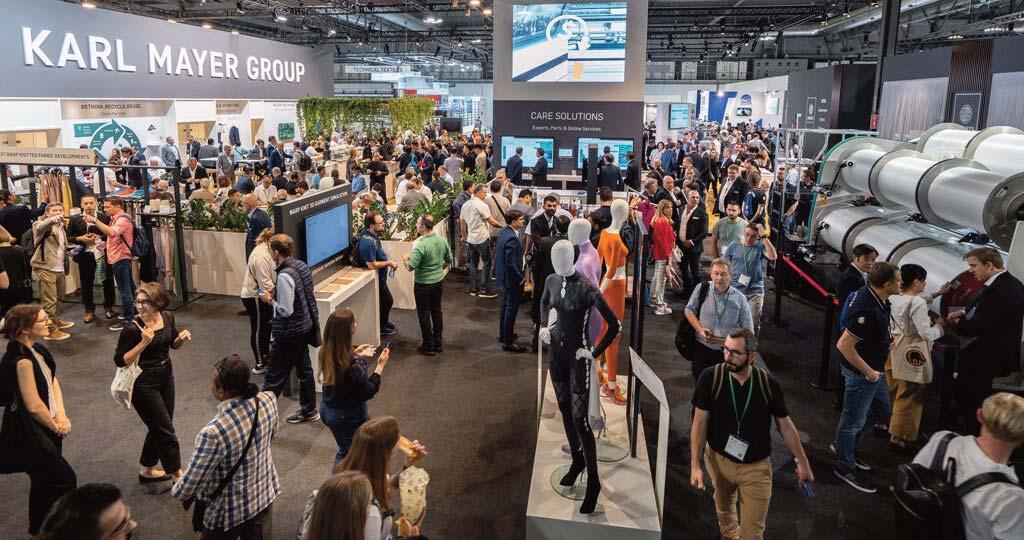
manufacturer offers perfect solutions for the fields of warp knitting, technical textiles, warp preparation for weaving and digitalisation.
To ensure the success of its international customers, KARL MAYER has always been eager to provide its clients with the best economical and technical products and services and to offer innovations which bring fresh impetus to the textile world.
With employees worldwide, the international organization produces in its main markets, so that KARL MAYER is always close to its customers and their needs. Today, the company has subsidiaries in China, USA, India, Italy, Hong Kong, Japan, Bangladesh and Switzerland as well as agencies all over the world.
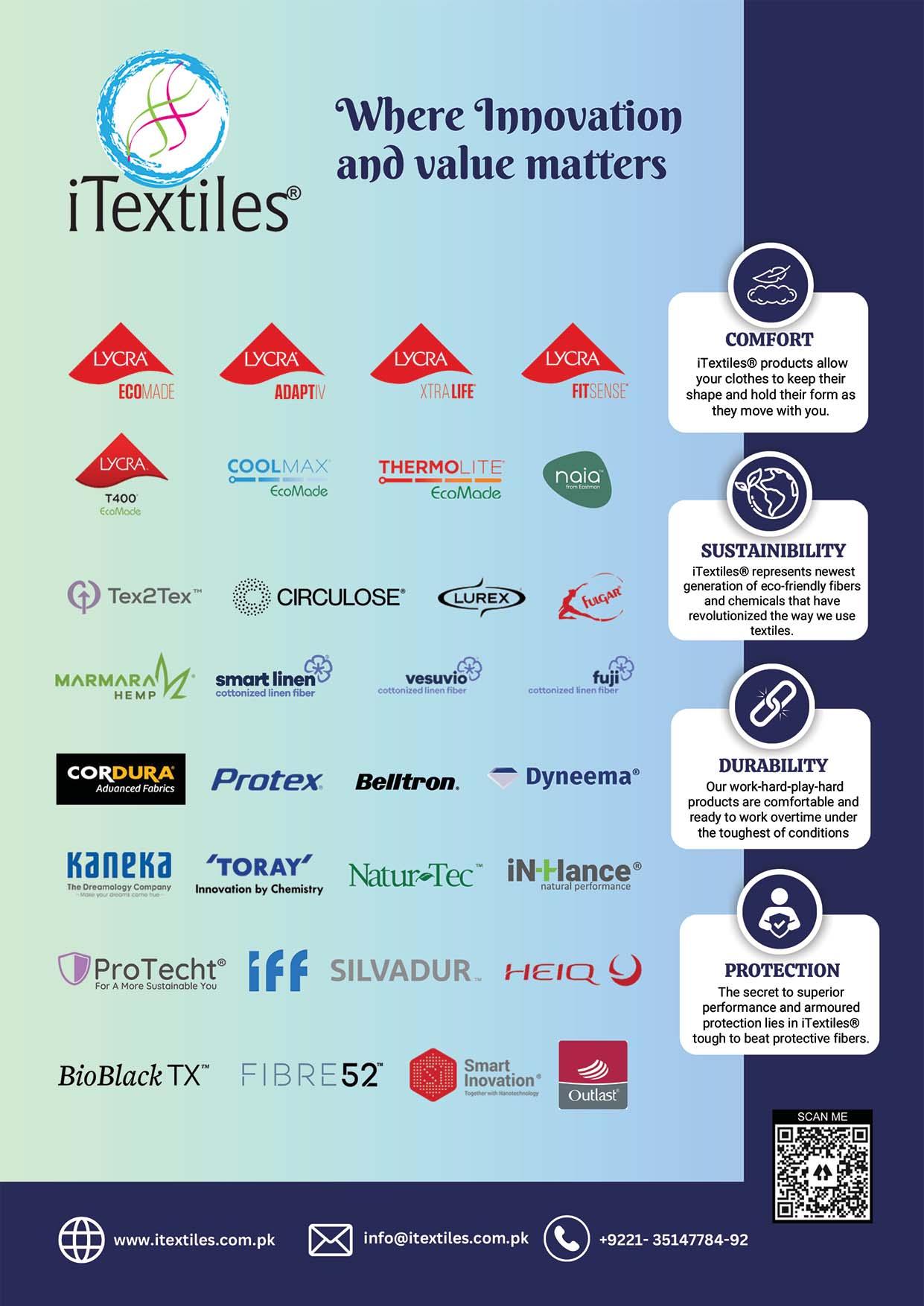


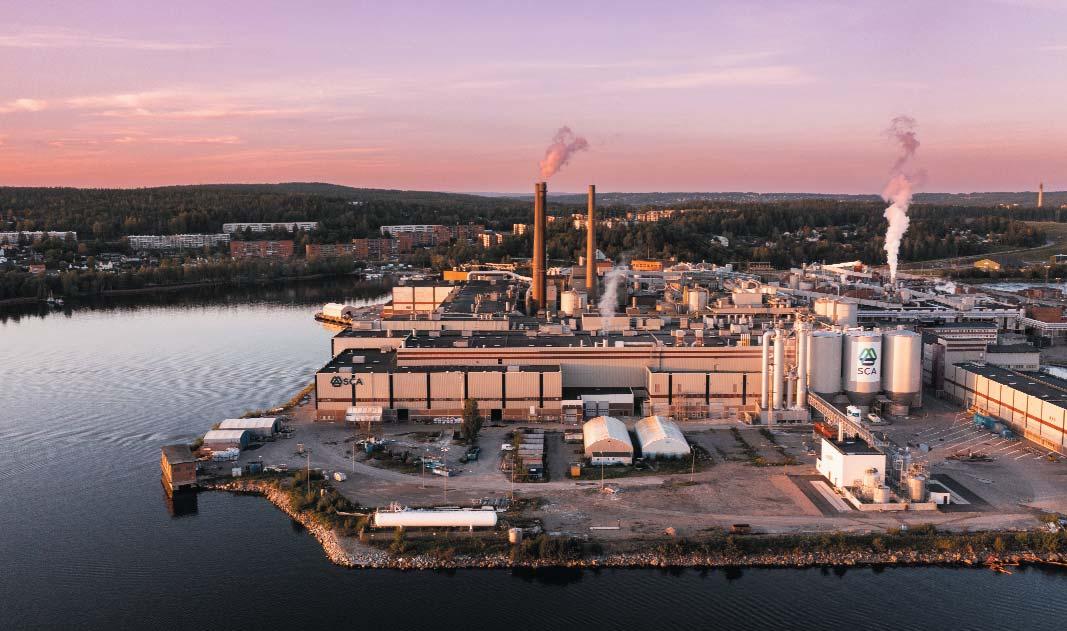
Circulose has partnered with Mango as the first Scaling Partners since the restart – a major step toward accelerating the adoption of circular materials in the global fashion industry.
The partnership marks a milestone in Mango’s commitment to sustainable fashion, aligning with its long-term strategy to transition towards a circular model and to reduce its environmental impact. This collaboration reflects the brand’s commitment to shifting a meaningful share of their MMCF use to fibers made with CIRCULOSE®
“We’re proud to partner with the forward-thinking brand Mango and support their high ambitions in circularity. Their strong commitment brings us one step closer to restarting the factory and sets a powerful example for the industry. We hope it will inspire other brands to follow their lead.” says Jonatan Janmark, CEO of Circulose.
“We’re proud to be the first brand to partner in Circulose’s new phase and look forward to working closely together to advance our shared circularity goal” says Andrés Fernández, Sustainability and Sourcing Director at Mango. “This collaboration marks a significant step on our sustainability roadmap as we strive to exclusively use fibres with lower environmental impact by 2030 and reflects our commitment to fostering a more circular and responsible fashion ecosystem, where innovation and environmental stewardship go hand in hand.”
This partnership builds on Circulose’s strengthened commercial strategy, which focuses on forging closer brand partnerships, introducing an innovative pricing model, and offering expanded support services.
The new pricing model, developed in collaboration with Fashion for Good and Canopy as part of a joint initiative to
accelerate the shift to next-gen materials, requires brands to license CIRCULOSE® to access the fiber. It is specifically designed to reduce pricing friction and drive adoption at scale, shifting from limited capsule collections to large-scale adoption of next-gen materials.
The license also includes services that support large-scale implementation, such as transition planning, supply chain orchestration, and traceability.
Circulose has entered a multi-year partnership with H&M Group – marking another pivotal step in scaling circular materials within the fashion industry.
Since 2020, H&M Group has been a frontrunner in incorporating CIRCULOSE® into their collections. Now they are deepening their commitment by becoming one of the first official Scaling Partners for Circulose. Through the multiyear agreement, H&M is targeting to
transition a substantial share of their man-made cellulosic fiber (MMCF) to fiber made with CIRCULOSE®
Made entirely from discarded textiles, CIRCULOSE® is a next-generation material that helps brands move towards a circular fashion system with reduced reliance on virgin fibers, while maintaining quality and performance.
“H&M Group has been a driving force in advancing sustainable and circular solutions in fashion, and a longtime supporter and early adopter of CIRCULOSE® – dating back to the Renewcell days. We’re proud and grateful to now formalize this new partnership to accelerate CIRCULOSE® adoption at scale. Their commitment plays a critical role in helping us reaching the volumes needed to restart our factory,” says Jonatan Janmark, CEO of Circulose.
“We were pioneers back in 2020 when we first brought fashion made from CIRCULOSE® to our customers. Today, we’re excited to deepen this partnership. Investing in next-generation materials is essential to achieving our goal: ensuring that 100% of our materials are recycled or sustainably sourced by 2030. Scaling access to these solutions is key to accelerating the shift towards a circular
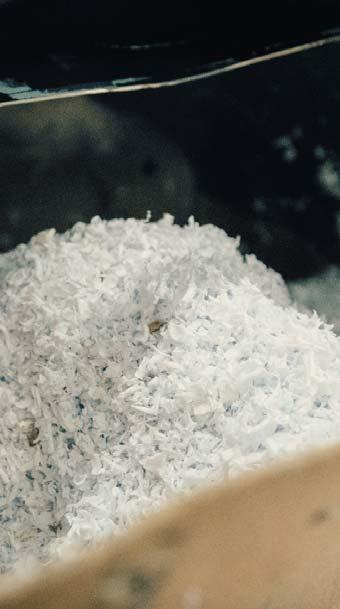
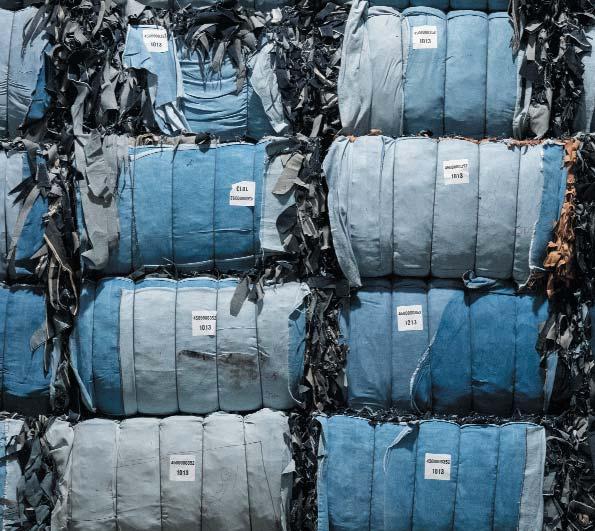
economy for fashion,” says Cecilia Strömblad Brännsten, H&M Group’s Head of Resource Use & Circularity.
This partnership reflects Circulose’s renewed commercial strategy – focused on close brand collaboration, dedicated implementation support, and a new licensing-based pricing model developed

in collaboration with Fashion for Good and Canopy to reduce friction in scaling up next-generation materials.
CIRCULOSE® is a regenerated material made from 100% discarded textiles that enables fashion brands to reduce their reliance on virgin fibers while maintaining high standards of quality and design.

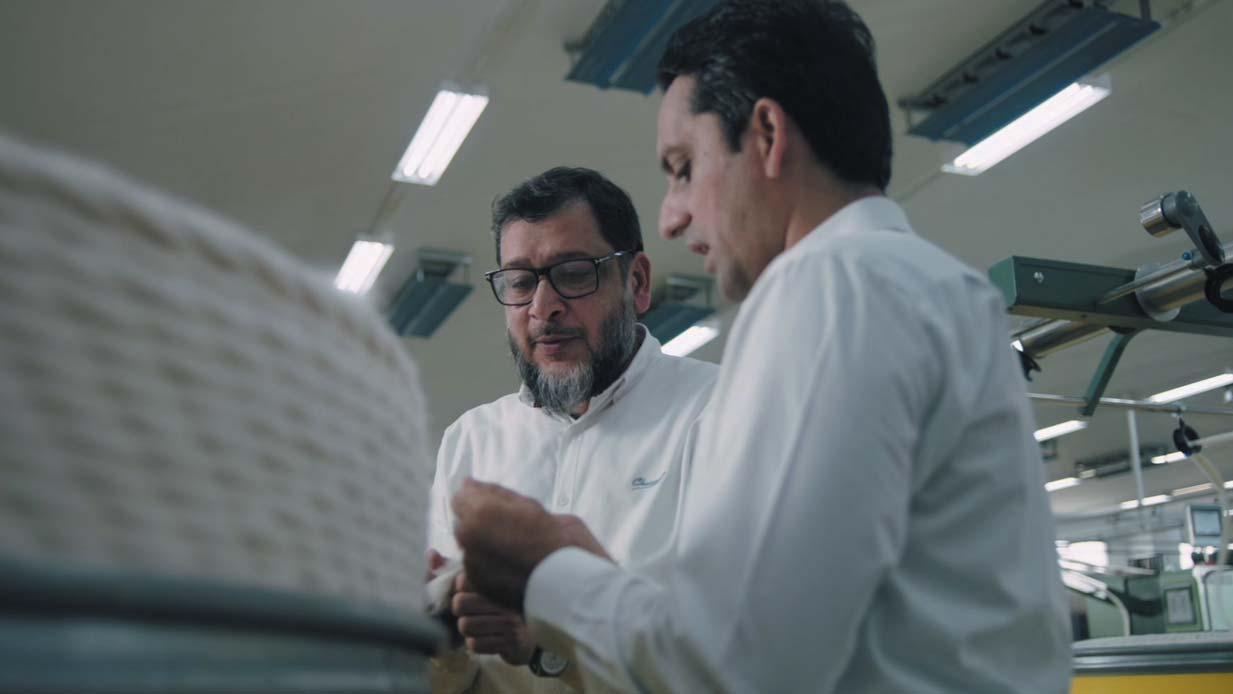
With 40 years of experience, Soorty is one of Pakistan’s largest denim producers and exporters. Their new Rieter ring spinning mill plays a key role in ensuring seamless operations, integrated processes, and high efficiency.
Soorty’s ring spinning mill is fully equipped with Rieter machines, covering the entire spinning process from bale to package. It enables Soorty to produce high-quality ring yarns while maintaining low energy consumption. Key innovations, such as the high-performance card C 80, allow for increased production while using fewer resources.
The spinning mill operates 20 ring spinning machines G 38, running at spindle speeds between 12 000 and 18 000 rpm. These machines provide easy handling and high flexibility, particularly in the production of slub yarns with various effects, making them well-suited for denim fashion. The Autoconer X6 further improves downstream efficiency
by delivering high package quality, reducing energy consumption, and optimizing processes through advanced monitoring.
Soorty is recognized as a leader in Pakistan’s textile industry and is committed to sustainable denim manufacturing. The collaboration between Rieter and Soorty supports innovation, efficiency, and sustainability in textile production.
“Our goal is to become the most sustainable supplier of fashion brands and the Rieter system is a perfect fit for this.” shares Kashif Suleman, COO, Soorty Spinning Mill.
Rieter is the world’s leading supplier of systems for manufacturing yarn from staple fibers in spinning mills. Based in Winterthur (Switzerland), the company develops and manufactures machinery, systems and components used to convert natural and man-made fibers and their

blends into yarns in the most costefficient manner. Cutting-edge spinning technology from Rieter contributes to sustainability in the textile value chain by minimizing the use of resources. Rieter has been in business for 230 years, has 18 production locations in ten countries and employs a global workforce of around 4 790, about 16% of whom are based in Switzerland. Rieter is listed on the SIX Swiss Exchange under ticker symbol RIEN.





What does it take to spin quality yarn from recycled fibres? Uster Technologies brought textile industry leaders together to discuss the role of technology, data and automation – as well as the current challenges in using recycled raw material. Experts from Rieter, Säntis Textiles, Otto Yarns, and TVU commented on the current situation and looked into the future of spinning in a panel discussion organized at Uster headquarters.
It’s more than just machinery – it’s about rethinking processes, embracing AI, data and machine automation as well as building industry-wide collaboration. As spinners navigate the multiple demands of circularity, customer satisfaction, and profitable business, one thing is clear: the future of recycled textiles must be individually engineered, comprehensively tested, and connected like never before.
Standards and individuality: engineering for reliability and diversity
Advanced machinery is a critical component in enabling engineering teams to optimize processes and drive innovation. Machines from leading manufacturers offer reliability but don’t make an inimitable product. “With the goal of being different and unique, we create our own path by developing our own final machines,” says Andreas Merkel, CEO at Otto Yarns. Otto engineers customize the machines for specialized applications. A notable example is the Spin-Knit system, which integrates spinning and knitting into one continuous operation. Originally configured for cotton, the machine was re-engineered to process technical fibres, by removing the standard top section and implementing a proprietary drafting system.
The production of recycled yarns brings technical requirements that are significantly different from those with virgin fibres. According to Stefan Hutter, owner of Säntis Textiles, there is a clear need for the development of new industry standards tailored specifically for recycled materials, and he advocates for Uster Technologies to take a leading role in this effort. Ultimately, the successful
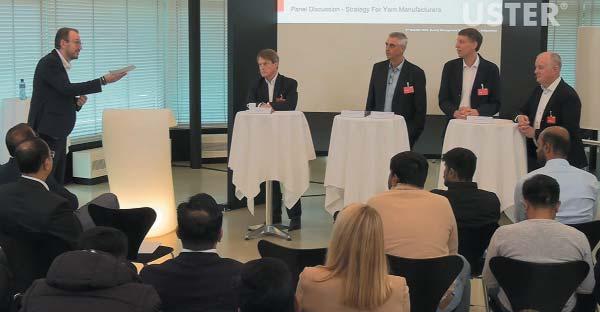
Stratos Fragkotsinos, Vice President Business Area Mill Management Solution at Uster Technologies, moderating the panel discussion featuring (from left to right) Stefan Hutter, owner, Säntis Textiles; Thomas Franz, Sales and Purchasing Manager, TVU; Michael Will, Head Textile Technology & Process Analytics, Rieter; Andreas Merkel, CEO, Otto Yarns.
integration of advanced production machinery, newly-defined quality standards, and precise quality control systems will require close industry collaboration. This is the only way that confidence in recycled yarns can be established –ensuring that customers not only trust the product's performance and consistency but are also willing to invest in its value.
Recycled yarn production can be achieved with existing spinning technologies, either by adapting current systems or by integrating additional processing steps. “Spinners must go back to the basic task and again learn how to spin, starting from scratch and going through the whole line of spinning,” says Michael Will, Head Textile Technology & Process Analytics at Rieter. This relearning process is essential due to the variable nature of recycled fibres, and it demands extensive testing and data collection –measuring key parameters, validating process changes, and ensuring consistency through iterative quality control.
Growing customer demand for more automation presents a dual challenge: matching the need for maximum flexibility with the rigid configurations typical with interconnected automated systems. In conventional spinning mills, linking multiple machines can limit process adaptability. However, machine-level automation offers potential for enhanced flexibility, particularly when processing
smaller lot sizes. For instance, features such as automated adjustment of comber nip distances can streamline setups.
The role of data and AI
In the recycling process, sorting, separating, and cleaning are advanced operations in which artificial intelligence plays a critical role in pattern recognition and optimization. In this way, AI enables optimization of material recovery at the right quality, to improve process efficiency. Another key area is traceability, which ensures product reliability and builds trust throughout the supply chain. “For downstream processes such as dyeing, it must be possible to trust certificates,” says Thomas Franz, Sales and Purchasing Manager at TVU.
Data analysis is fundamental to these efforts, but it becomes truly effective only when integrating comprehensive data streams. This means connecting spinning machinery and testing instruments, ideally across different brands, to enable holistic process monitoring and control. For spinners, seamless working between equipment and systems is crucial to unlocking maximum operational benefits and ensuring consistent quality in recycled yarn production.
Enabling the future would start with technology partners meeting, discussing and working together. This is a common belief of the experts participating at the panel discussion, and the Uster event has been one step in this direction.
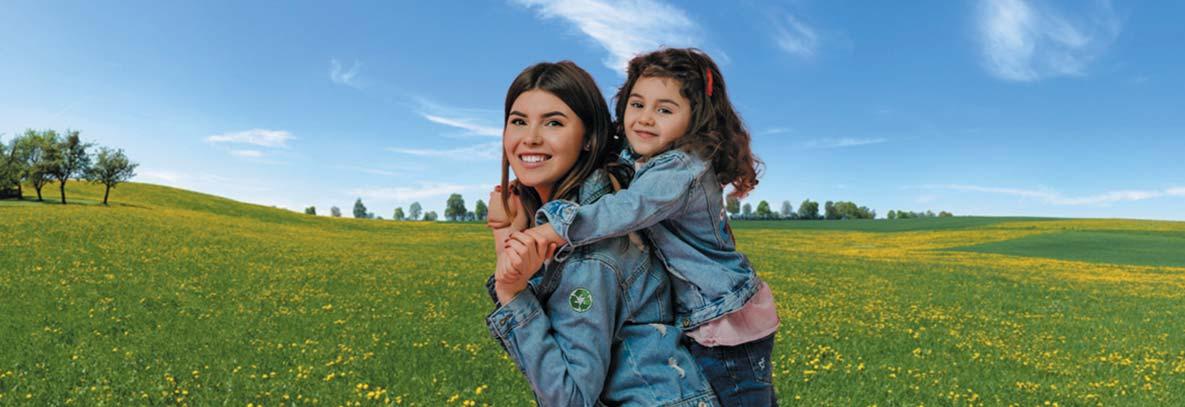

Saurer's Autocoro 11 is redefining rotor spinning with its revolutionary technology for spinning even the shortest recycled fibres. With increased global focus on circular manufacturing and stricter environmental regulations, the demand for recycling in textile production is increasing. Saurer anticipated this trend and has developed multiple features displayed in the Autocoro 11 Recycling Xtreme version, making it the leading technology for circular spinning mills. Read how Polat İplik Tekstil in Türkiye is utilising Autocoro 11 for their sustainable high-speed spinning with lowest energy consumption.
In its Recycling Xtreme (rX) edition, the Autocoro 11 fully automated rotor spinning machine processes even the shortest mechanically recycled fibres with exceptional raw material efficiency, unlocking new levels of circularity in yarn production. It also sets new benchmarks in energy efficiency, productivity and operational autonomy. Since its launch in 2023, mills worldwide have recognised its transformative potential.
Recycled fibres are obtained from preor post-consumer waste. Pre-consumer waste, often cut-offs from garment production, consists of fibres that are very uniform in type and colour, but vary in length due to tearing during the opening process. In post-consumer waste, mostly obtained from worn-out garments, the spinnability of the fibres is less predictable and requires a high degree of flexibility and fine-tuning of the settings by the spinning mill.
Saurer’s engineers have developed the smart features that allow Autocoro 11 to process a high content of shortest fibres from both pre- and post-consumer waste material. Recycling the fibres in a more circular way saves natural resources for the future of our planet (Fig. 1). It is also a cost-effective alternative to virgin fibres, enabling mills to reduce their costs.
Highest flexibility and quality with Autocoro 11
The Autocoro 11 is a fully automated rotor-spinning machine. Precise adjustments for different fibres are easily done thanks to the single drive technology. By fine-tuning the yarn twist, speed of the opening rollers and rotor size, it is possible to achieve a recycled yarn quality which almost matches that of yarns made from virgin cotton. The wide range of
adjustment options open new ways for spinning mills to achieve greater profitability and flexibility in yarn production.
Mr Fahri Polat, owner of Polat İplik Tekstil, is profiting from the benefits of Recycling Xtreme technologies: “For 40 years, we have been focussing on yarns made from recycled raw materials, where quality is paramount. With the Autocoro 11 and the Recycling Xtreme equipment, we now have a much higher raw material utilisation and can guarantee outstanding yarn quality. We now produce better and at the same time more economically - a benefit for us and the environment”.
Quality paired with machine efficiency in recycling
Recycled cotton yarns have a narrower count range than those made of virgin cotton. While not all blends can be
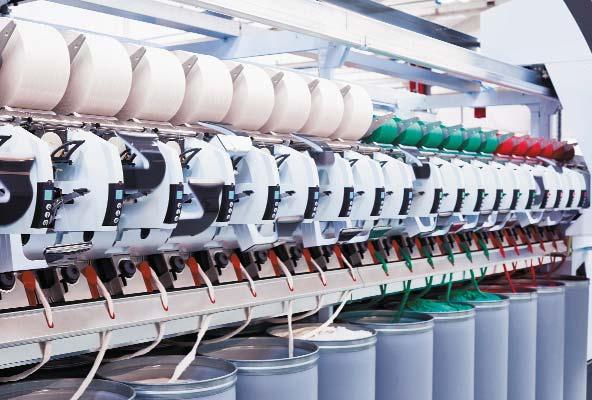

spun into both coarse and fine yarns alike with the necessary properties for further processing steps, the use of carrier fibres is essential to achieve sufficient yarn strength.
The finer the yarns are, the more carrier fibres with a homogeneous length, i.e. polyester fibres, are needed to have the required minimum number of 110 well-bonded fibres in the yarn crosssection and thus ensure adequate yarn strength and sufficient spinning stability. Increasing recycled content without adapting spinning settings, often leads to an increase in yarn breaks. Fortunately, the Autocoro 11 can compensate such increase of yarns breaks with the Synchropiecing 60 technology (Fig. 2), always keeping the highest level of economic efficiency.
productivity and less maintenance with Recycling Xtreme
The new yarn guides with their selfcleaning mechanism in combination with continuous blow-off (Fig. 3) increase productivity while significantly reducing maintenance costs. In a Turkish spinning mill, the manual cleaning intervals were extended from 3 days to 6 weeks - an impressive fourteen-fold increase! At the same time, productivity when spinning Ne 10 weaving yarn was significantly increased. Thanks to the new yarn guides, disruptions to yarn guide movements caused by deposits are now a thing of the past. The days of packages with uneven flanks are also a thing of the

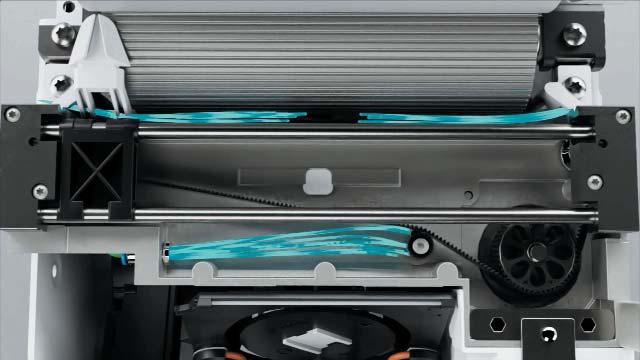
Recycled fibres tend to accumulate in the rotor grooves. Such contamination can impair the yarn quality and increase yarn breaks. The Autocoro 11 has an innovative solution to this problem: the new patented interval cleaning of the rotors implemented in the Doffing Cleaning Unit (Fig. 4).
State-of-the-art linear motor technology ensures that the cleaning process is now digitally controlled and perfectly synchronised. The combination of pneumatic and mechanical cleaning at regular intervals ensures effective removal of deposits. The recently integrated movement mode of the cleaning scraper optimises cleaning even further. A precise positioning of the scraper in the rotor groove ensures that deposits cannot stick in the first place.
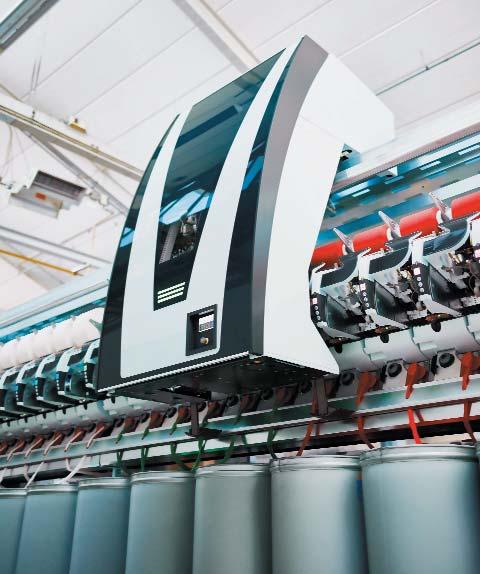

All these advanced technology features enable excellent spinning stability and high, constant yarn quality. Yarn breaks are significantly reduced, and the processing of recycled fibres is made much easier on Autocoro 11 with Recycling Xtreme.
In the past, the aim was to eliminate short fibres to achieve maximum yarn quality. Today, the focus is on minimising the loss of valuable raw materials to achieve a more circular economy in textiles. Saurer – for saving fibres from bale to yarn
From the bale opener to cards and draw frames up to the spinning machinein the production of carded rotor yarn, up to 9% of cotton and recycled fibres are discarded as waste during the production process. To reduce the ecological footprint, it is essential to reduce the share of waste. The new Autocoro 11 in the Recycling Xtreme edition offers innovative solutions for processing a wide range of recycled fibre types and blends economically and with low losses.
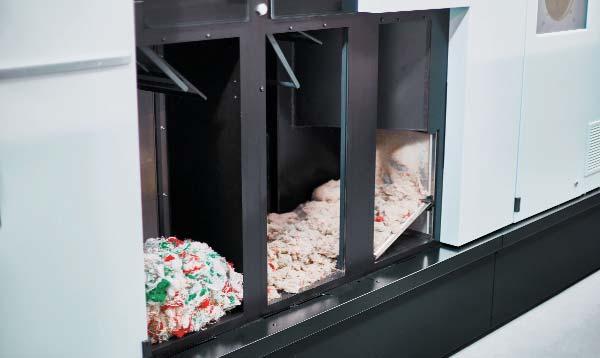

In the new Autocoro 11, fibres of good quality, which are sorted out during the piecing process from the spinning box, are collected separately in an innovative three-chamber system (Fig. 5). These process-related rejected fibres can simply be fed back into the spinning process. This saves on raw material costs while contributing to sustainable production.
The three-chamber system is an important feature for Fahri Polat, owner of Polat İplik Tekstil in Türkiye: “The three-chamber system is simply great! It ensures that all valuable fibres remain in the production cycle - no fibre is lost. For us, this is perfect recycling and genuine, loss-free spinning”.
Equipped with dirt-repellent aluminium caps, the SE 21 spin box sets new standards in cleanliness. The caps prevent fibre fly from accumulating in the housing of the opening rollers. In addition, new fibre beard supports in various lengths, which can be clipped in without tools, ensure that the short fibre separation is regulated as required (Fig. 6). Long clips minimise the amount of waste, while short clips increase it. Unusable waste fibres are efficiently removed in the dirt channel.

A new patented suction system in the Autocoro 11 section frame ensures removing a large share of the waste quickly and effectively (Fig. 7). This is particularly important for long machines and helps to keep the lower part of the spin box clean, thus increasing productivity.
Spinning recycled fibres presents challenges: a high number of yarn breaks and clearer cuts are not uncommon,

especially at high rotor speeds. Over 1000 yarn breaks per 1000 rotor hours are the norm for many recycled yarns. This is not a challenge for the Autocoro 11 Recycling Xtreme edition combined with Synchropiecing 60 as it can perform up to 60 piecings simultaneously to achieve high efficiency even in difficult environments. This is particularly true in combination with long machines, coarse yarns, short package running times and frequent interventions by the Corolab yarn clearer.
Customers worldwide appreciate the quick start-up of the machines. Fahri Polat, owner of Polat İplik Tekstil, is no exception: “Thanks to Synchropiecing, we can innovate with smarter mixing strategies and increase the share of sustainable fibres - a benefit for our resources and profitability. From the moment the machine starts, the advantages are clear – within minutes, all 816 spinning positions are running at full speed.”
Autocoro 11: Synergy of efficiency, economy and sustainability!
With its pioneering and energy-saving technologies, the Autocoro 11 impressively demonstrates how spinning mills can produce economically, efficiently and more sustainably with the help of the Autocoro 11. The Autocoro 11 offers tailor-made solutions for every spinning mill and every type of yarn and fibre.
In an exclusive interview, Vice Chairman of Mei Sheng Textiles Vietnam Co. Ltd. Adrian Song shares his real-world insights into how his company achieves outstanding quality and rapid growth –in close partnership with experts from Trützschler’s Card Clothing business.
During the last three decades, Mei Sheng has risen to become a leading player in the Vietnamese textile market – and a valued supplier of top-quality yarns for customers worldwide. The company is located in Ba Ria Vung Tau province, close to Ho Chin Minh City. It produces compact, ring, Murata Vortex, rotor, siro, slub and melange yarns and knitted fabrics.
How would you describe your company and its decision to choose card clothing from Trützschler?
We’re a growing company that makes a uniquely wide range of yarns. Our products flow into markets around the globe. That means we need to meet special demands, certification standards and performance expectations for a huge variety of customers and regional markets. We’ve achieved success because of our commitment to outstanding quality, which is at the heart of everything we do.
That’s why we chose to work with Trützschler in the early days of our company and it’s why we still rely on
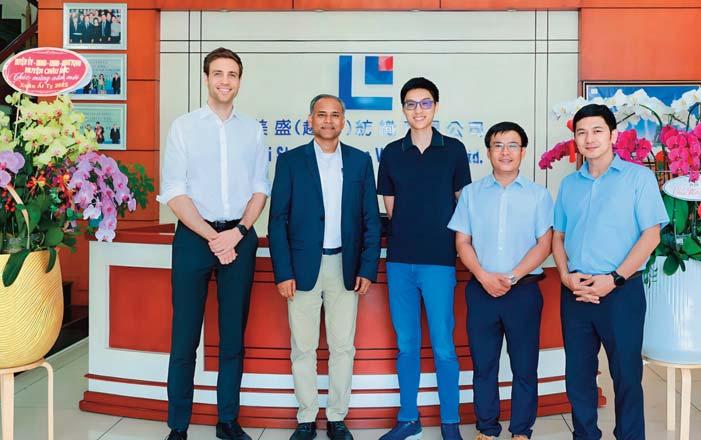
them to supply 100 percent of our card clothing requirements today. They offer superior durability and precision to ensure consistent and excellent yarn quality. In total, we operate 172 Trützschler carding machines.
Why do you value your company’s partnership with Trützschler so highly?
Mei Sheng has bold ambitions and Trützschler enables us to achieve progress toward those business goals. Their experts are always nearby and available to provide rapid, effective support. And they share their deep technical knowledge with our teams to solve problems, maximize efficiency and optimize the performance of our processes. We truly value that highly professional collaboration.
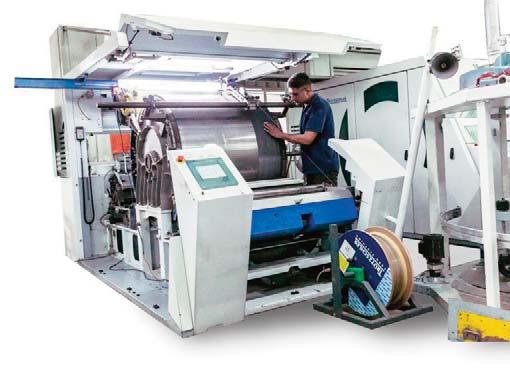
Trützschler’s team immediately offers special training whenever we need it, while also providing ongoing guidance for how to adjust our machine settings for
specific raw materials or market expectations. Teams from Trützschler often visit our sites to solve problems, discuss our evolving needs and provide trusted consultancy. On top of this, Trützschler has a local stock of card clothing, so we never face emergency stoppages or machine downtime.
What do you expect for the future of your business and the textile market?
The global textile industry is highly complex and difficult to predict. Right now, there is economic uncertainty in many markets and regions. In this context, Mei Sheng needs to stay flexible and maintain its sharp focus on outstanding quality to achieve our ambitious plans for expansion.
We have created a strong foundation that is built on close partnerships with businesses that share our commitment to quality like Trützschler. They are setting new benchmarks for excellence in textile manufacturing and have a proven track record of supporting innovative companies like Mei Sheng with highperformance machines and fast, local service that enables success. Our two companies are connected by quality. Now, we want to keep moving forward together.

by Nadeem Mazhar, Managing Editor, Pakistan Textile Journal.
The economy of Italy is the 3rd-largest national economy in the Eurozone, the 8th-largest by nominal GDP in the world, and the 12th-largest by GDP (PPP). Italy is the eighth largest exporter in the world with US$ 674.87 billion exported in 2024. That dollar amount reflects a 23.87% increase compared to US$ 651 billion during 2023.
In 2024, the main destination for Italian exports of textile machines was Asia (41%), followed by the European Union (20%) and European non-EU countries (14%). The biggest contribution to Italian textile machinery exports came from China. In 2024, Italian sales to the Chinese market amounted to Euro 206 million. Other main markets are Turkey, India and United States of America.
The textile machinery market consists of players who manufacture basic machines for labour-intensive textile manufacturing countries, and machines for advanced, developed countries producing textile products where labour is expensive.
Automation just like in any other industry helps in bringing down the operation cost and provides better products.
Today, Italy is one of the leading producers and exporters of textile machinery in the world. The Italian textile industry still plays an important role in the fashion sector and the entire national manufacturing, although resized compared to the first half of the last decade. In Europe, Italy ranks among the top producers with a high level of specialization across the various stages of the value chain. There are approximately 300 companies who produce textile machines and related accessories, for a total of about 12,500 employees.
The majority of Italian manufacturers are small to medium-sized enterprises that provide custom-made spinning, weaving, knitting, finishing, laundry, and dry cleaning machines to the market. These machines are designed to process
Italian textile machinery exports - breakdown by categories 2024
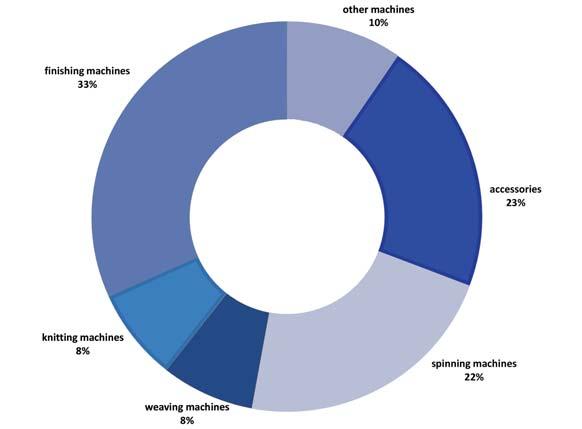
natural as well as manmade fibres, in order to provide the right solution for its global customers.
According to the Association of Italian Textile Machinery Manufacturers (ACIMIT), creativity, sustainable technology, reliability, and quality are the characteristics that have made Italy a leader in the manufacturing of textile machinery. Currently, Italy holds a strong position as one of the leading suppliers of textile machinery in the world.
Among the top producers of textile machinery in Europe, Italy holds second place after Germany, and the technological level of its production is considered to be of the highest standard, even by its competitors.
Production of Italian textile machinery decreased from Euro 2,271 million in 2023 to Euro 2,081 million in 2024, thus showing a decrease of 8%. As per
Source: ACIMIT
ACIMIT, the orders index for textile machinery drawn for the period from 2024 showed a 9% decrease compared to the same period for 2023.
On the other hand exports of Italian textile machinery also decreased from Euro 1.96 billion in 2023 to Euro 1.78 billion in 2024, showing a decrease of 9%. The wide range of products from Italian textile machinery manufacturers enables them to meet the needs of all potential customers. Exports represent 86% of total sales, realized in about 130 destination countries. This process of internationalization, together with the vocation for innovation in the sector, allowed Italian companies to consolidate and further improve the leading position held by the Italian textile machinery industry all over the world. Production and exports of Italian textile machinery for the past four years are given in Table 1.
Source: ACIMIT
The supply of Italian manufacturers covers all the classic sectors into which we can divide textile machines. Italian sales abroad are divided among these main sectors: 33% finishing machines, 23% accessories, 22% spinning machines, 8% knitting machines, 8% weaving machines and 10% other machines.
In 2024, Italian exports of textile machinery were divided as follows: Asia (41%), followed by the European Union (20%), non-EU Europe (14%), North America (10%), Africa (8%), and Latin America (7%).
The biggest contribution to the Italian exports of textile machinery came from China. In the 2024 period Italian exports toward the Chinese market amounted to a value of Euro 206 million. Other markets are Turkey, India and United States of America.
Italian textile machinery manufacturers have long been committed to providing sustainable technological solutions, both from an environmental standpoint, with the "Sustainable Technologies" project launched in 2010, and from an economic perspective, capable of effectively reducing consumption and production costs.
The digitalization of production processes in the textile sector is an indispensable response to the new trends requiring faster time-to-market and justin-time production.
To provide a suitable response to clients who are facing difficult challenges
Source: ACIMIT
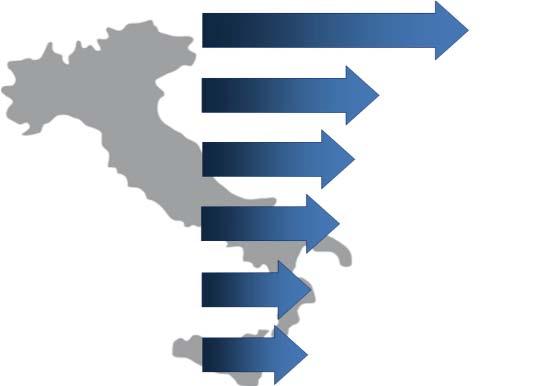
Table 2: Italian textile machinery exports (Main Countries)
in developing new production processes and business models within the textile
Source: ACIMIT
industry. Italian product ranges are increasingly compliant with 4.0 technologies.
Among these 4.0 technologies, the intelligent management platforms, onboard machine sensors for data acquisition that allows the monitoring of both the machine and products, predictive maintenance for a reduction in costs obtained through less downtime, and augmented reality applications supporting the operator in the various production phases are quite popular and in demand globally.
References
1.Association of Italian Textile Machinery Manufacturers (ACIMIT)
2.State Bank of Pakistan
3.Trade Development Authority of Pakistan.

by Nadeem Mazhar, Managing Editor, Pakistan Textile Journal.

Pakistan and Italy have excellent relations and cooperation in the fields of both development and non-development sectors and the same are growing day by day. Italy has always followed the Pakistani market with keen interest and in the past decades has gradually increased its’ positioning, becoming one of the top ten global trading partners of Pakistan and the second amongst the EU Member States with a growing trade exchange amounting in over US$1.6 billion during 2024.
Hence, over the years, Italian companies have been looking more and more at Pakistan for trade and investments. Energy remains the most important sector, while alternative energies, including solar, wind and biogas, are acquiring growing importance in our commercial relations. The Pharmaceutical sector maintains a relevant position in our bilateral trade relations with some of the Italian main companies, operating on the Pakistani market since the 1980s. The automotive sector also plays a leading role, as well as textile as most of the spinning mills prefer Italian machinery.
Table 1: Pak - Italy Trade Balance
Source: State Bank of Pakistan - Annual Reports.
The exports from Pakistan to Italy have increased under Generalized System of Preferences-Plus scheme. For the past years trade between Pakistan and Italy has increased but the rise in exports has been greater than the imports. However, the balance of trade in favour of Pakistan decreased slightly to US$ 619 million in 2024 compared to US$ 624 million in 2023. Pak-Italian trade details are given in Table 1.
Cotton fabrics and yarn, readymade garments, towels, hosiery, beddings, carpet and rugs, cotton, leather, sports goods and surgical instruments are the major items exported from Pakistan to Italy.
Export of textile and other items from Pakistan to Italy decreased to US$ 1,122 million in 2024, thus showing a slight decrease of 2.5% compared to last year, US$ 1,151 million.
Textile machinery, general industrial machinery, power generating machinery, petroleum products, transport vehicles, iron and steel, pharmaceuticals, acrylic fiber, chemicals and paper and paperboard are the main items imported to Pakistan from Italy.
Pakistan textile is the country’s single largest industry. Yet it is totally dependent on imported machinery, equipment, accessories and spares. The local facilities
Italian Textile
To Pakistan Categories 2024
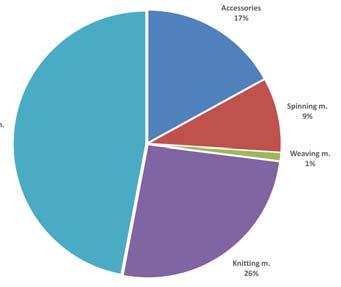
for manufacturing textile machinery items practically do not exist.
Italian textile machinery imports in Pakistan increased from 44 million Euros in 2023 to 53 million Euros in 2024, thus showing an incline of 9%.
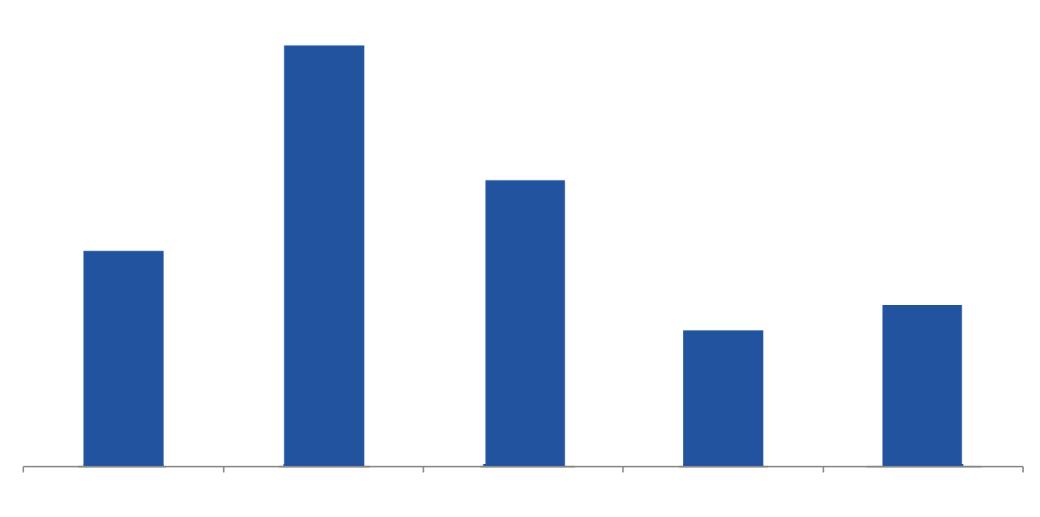
Source: ACIMIT.
The most Italian machines imported were finishing ones (47%) of the total export towards Pakistan, followed by knitting machines (26%) and machine accessories (17%) in 2024.
References
1.Association of Italian Textile Machinery Manufacturers (ACIMIT)
2.State Bank of Pakistan
3.Trade Development Authority of Pakistan.
Italy’s reputation as a global hub of technology, fashion, and innovation is once again finding fertile ground in Pakistan — thanks to the vision and dedication of Salvatore Parano, Trade Commissioner of the Italian Trade Agency (ITA) in Pakistan. Under his leadership, Italy is not only reaffirming its longstanding ties with Pakistan but also creating fresh opportunities for growth, collaboration, and industrial transformation.
With 99 years of history, the Italian Trade Agency has been the driving force behind the global expansion of Italian companies. From pavilions at leading international exhibitions to reverse trade missions that connect Pakistani, Japanese, and Brazilian entrepreneurs with Italian suppliers, ITA has consistently showcased the very best of Italian ingenuity. Workshops, seminars, and international fairs remain a powerful stage for presenting the advanced technologies and craftsmanship that make “Made in Italy” a worldwide benchmark.
At IGATEX 2025, Pakistan’s premier textile exhibition, Italy’s presence was stronger than ever. Learning from the absence of an Italian pavilion at the previous edition, Mr. Parano spearheaded efforts to bring together a dedicated space for Italian companies. The result was a dynamic
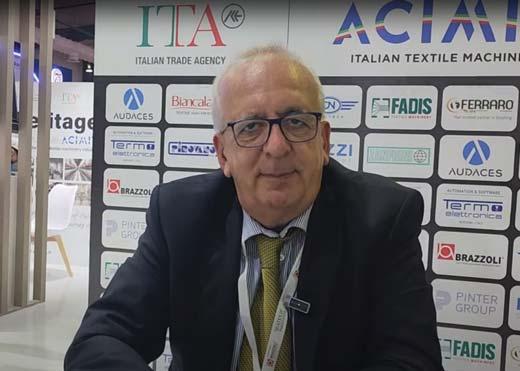

showcase of Italian textile machinery, attracting immense interest from Pakistani buyers eager to upgrade their industries with the latest Italian innovations.
This milestone was made possible through the unwavering support of Mr. A.R. Daudpota, whose deep knowledge of Pakistan’s textile sector and long-standing relationships with local stakeholders played a critical role in making the Italian pavilion a reality. Mr. Daudpota’s organizational expertise, industry connections, and on-the-ground coordination ensured that Italian companies not only had a platform to showcase their technologies but also meaningful engagement with Pakistani buyers and industry leaders.
Together, the leadership of Mr. Parano and the operational strength of Mr. Daudpota delivered an Italian presence at IGATEX that set a new benchmark of excellence, positioning Italy as a key partner for Pakistan’s industrial modernization.
Trade between Italy and Pakistan now stands at €1.5 billion, and the relationship continues to grow. Pakistan enjoys a trade surplus of over €500 million, sending textiles, garments, shoes, leather products, and agricultural goods to Italy, while Italy contributes its hallmark strength: advanced technology and machinery.
This complementarity reflects the unique balance between the two economies — one exporting world-class technologies, the other supplying high-quality finished goods — ensuring mutual benefit and long-term sustainability.
Italy’s Machinery: Innovation Rooted in Efficiency
Italy’s leadership in machinery is no accident. The 1970s energy crisis, which caused energy prices to skyrocket by 300%, compelled Italian manufacturers to pursue energy efficiency and sustainable solutions decades before they became global imperatives.
Today, Italy’s textile machinery sector, made up of around 300 companies and supporting over 100,000 jobs, stands as the backbone of the country’s textile and fashion leadership. While
larger companies have long been global players, many small and medium-sized firms depend on trusted partners in markets like Pakistan to expand their international reach — making trade platforms like IGATEX essential for success.
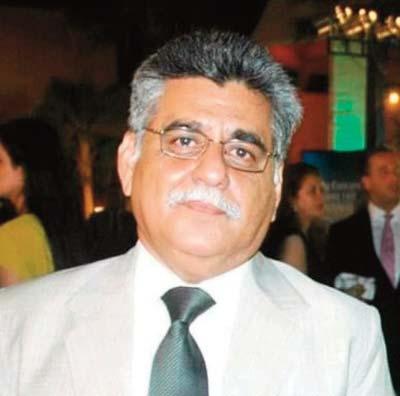
Mr. Parano has a clear vision: to increase awareness among Italian companies about the opportunities in Pakistan. By encouraging further investment, knowledge-sharing, and trade, he aims to unlock Pakistan’s potential as both a production hub and a key market for Italian technology.
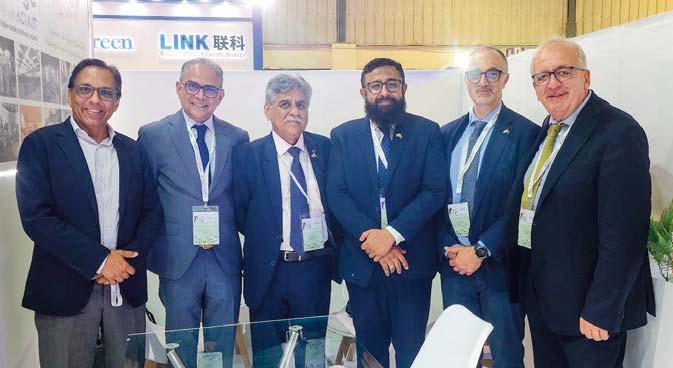
With exhibitions like ITMA Asia + CITME, and IGATEX serving as vital meeting points, the stage is set for even deeper collaboration between two economies whose strengths are perfectly aligned.
As Italy approaches the centenary of the Italian Trade Agency, its commitment to markets like Pakistan underscores a simple but powerful truth: wherever there is a demand for innovation, efficiency, and excellence, Italy is ready to lead. And thanks to the tireless efforts of professionals like Salvatore Parano and A.R. Daudpota, that leadership is being felt strongly in Pakistan today.
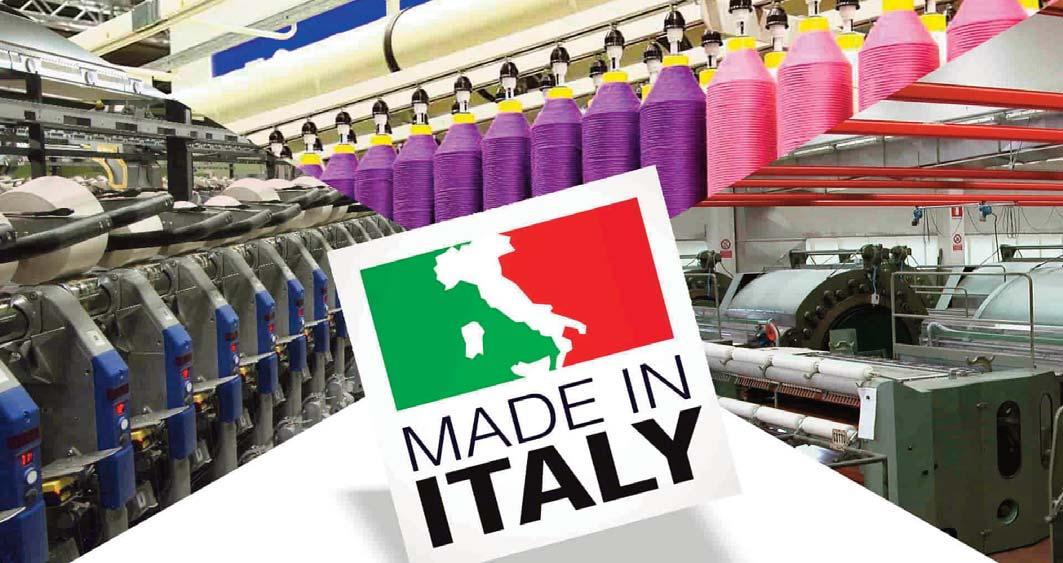
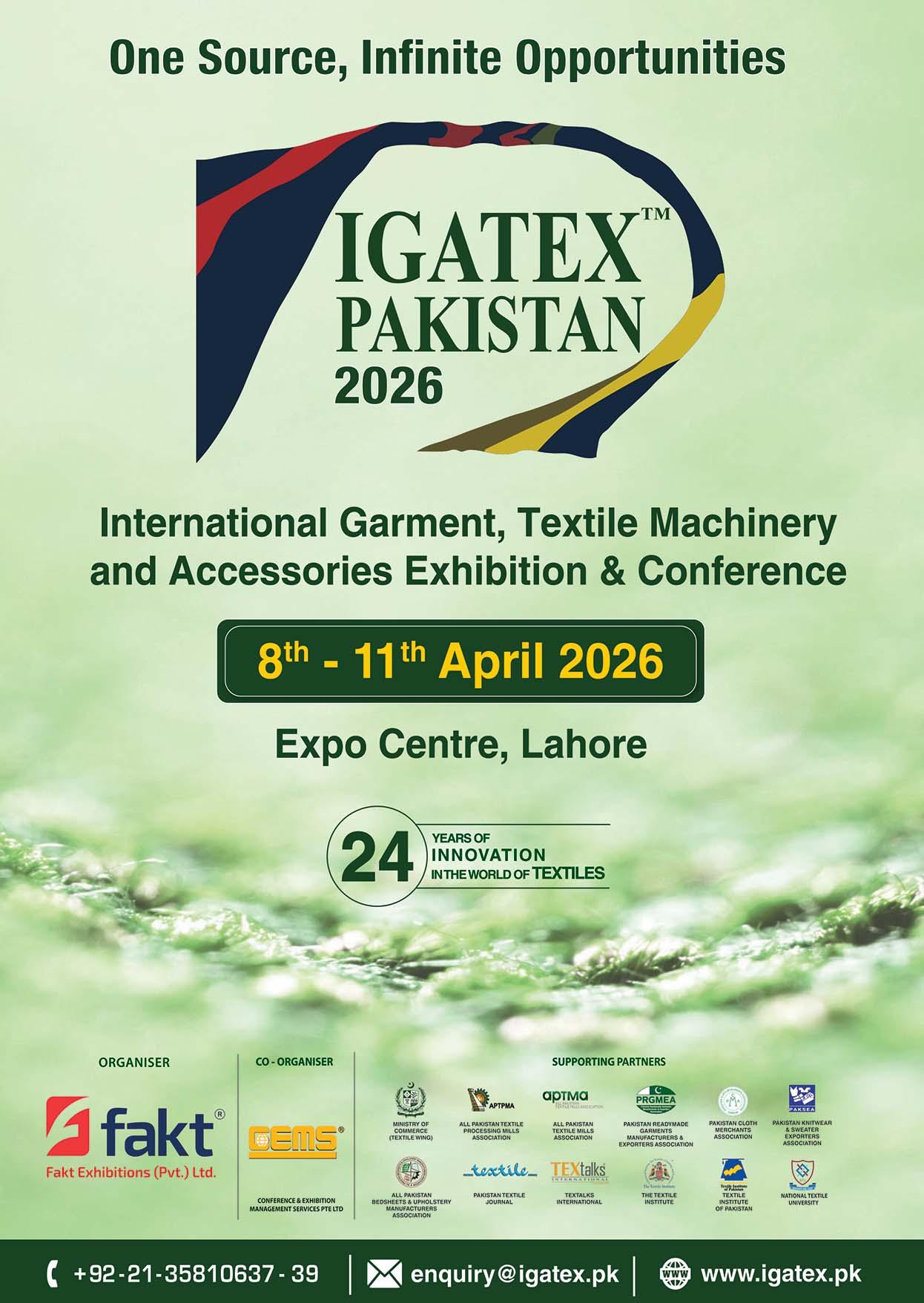
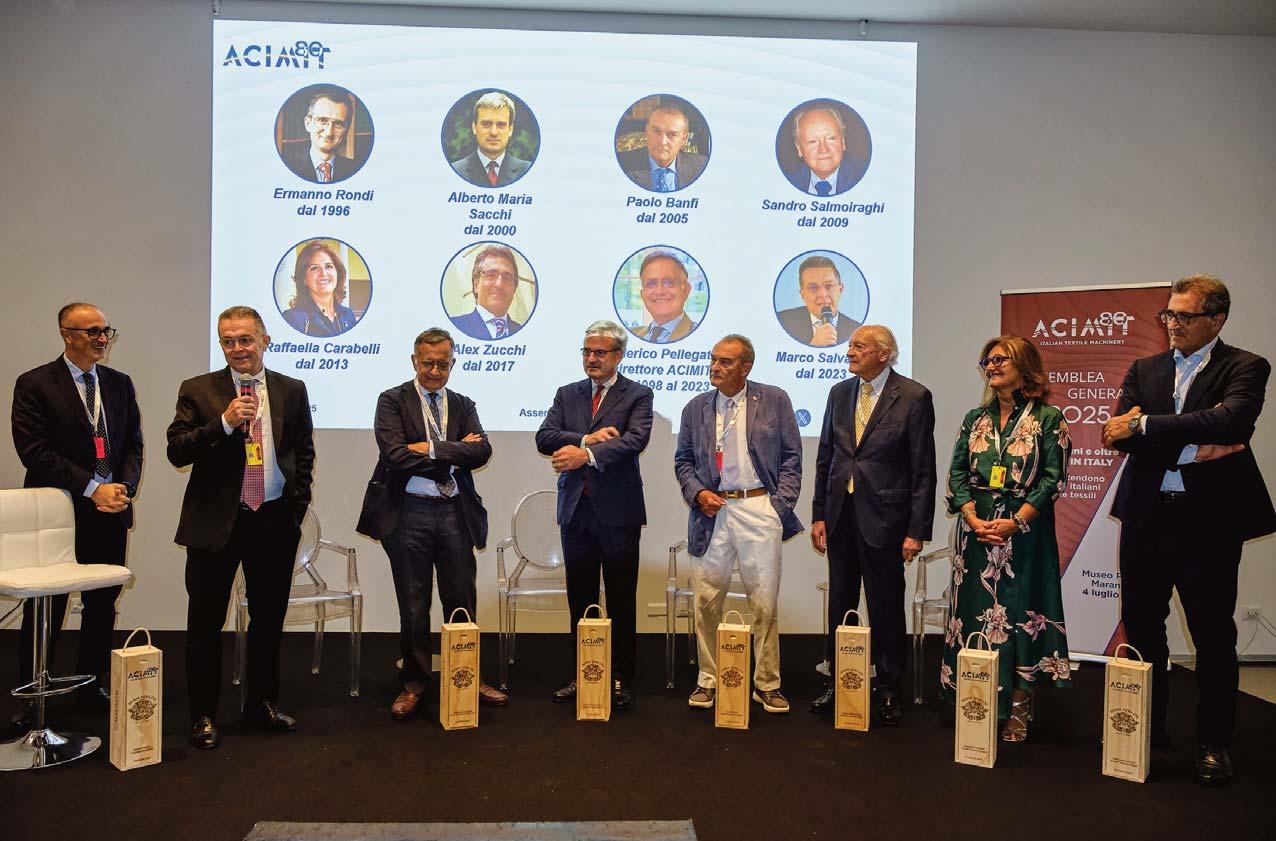

The association looks back with pride and ahead with renewed passion and responsibility.
Enhancing the value of ‘Made in Italy’ must be placed at the heart of the challenges facing the Italian textile machinery industry in the coming years.
This was the message emphasised by Marco Salvadè, president of ACIMIT, the association of Italian textile machinery manufacturers, during its general assembly held on Friday July 4th at the Ferrari Museum in Maranello, Italy.
Presenting the latest industry figures, Salvadè reported that in 2024 machinery sales fell by 8% compared to 2023, amounting to Euro 2.1 billion, while exports declined by 9% to Euro1.8 billion.
These results are set against a fragile international scenario, with similar trends also observed by the main competitors of
Italian manufacturers. China, Turkey, India and the United States remained the primary export destinations for Italian textile machinery in 2024, despite a persistently weak demand. The first months of 2025 have opened under the same cloud of uncertainty.
“US protectionist policies and mounting geopolitical instability risk further slowing global investments in the textile and apparel sector,” said Salvadè. “In particular, any escalation of the trade wars will prove even more damaging to the entire supply chain. It is therefore essential to defend and promote products that are designed and manufactured in Italy without compromise and distinguished by the quality and creativity for which we are renowned worldwide.”



The assembly also celebrated ACIMIT’s 80th anniversary.
“This is an important milestone that invites us to look back with pride and ahead with renewed passion and responsibility,” said Salvadè. “Trade tensions and regional conflicts have reshaped the international equilibrium, directly impacting corporate strategies. The Italian textile machinery industry, with its strong export orientation, is
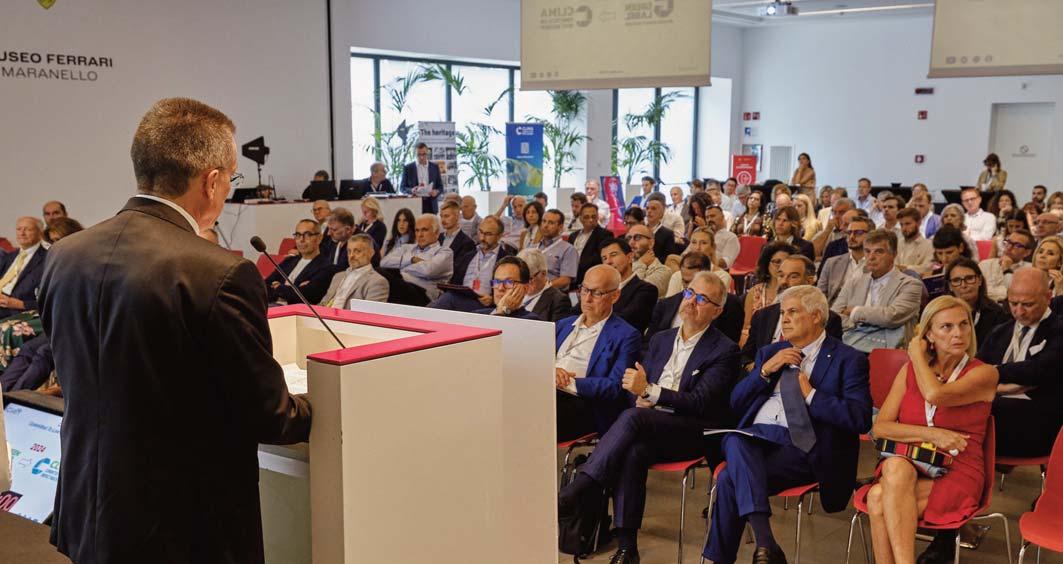
particularly exposed to these dynamics. While it continues to hold a leading position on the global stage, we must question whether the traditional formula, based on innovation and internationalisation, remains fully adequate.”
These themes were also the focus of a roundtable discussion held during the public session of the assembly, addressing three key topics for the future of the sector – internationalisation, innovation and sustainability.
ACIMIT (Association of Italian Textile Machinery Manufacturers) represents an industrial sector that comprises roughly 300 manufacturers (employing around 13,000 people), which produce machinery for a turnover worth of around 2.3 billion euro, of which 86% are exported. Creativity, sustainable technology, reliability and quality are the hallmarks that have made Italian textile machinery worldwide leaders.

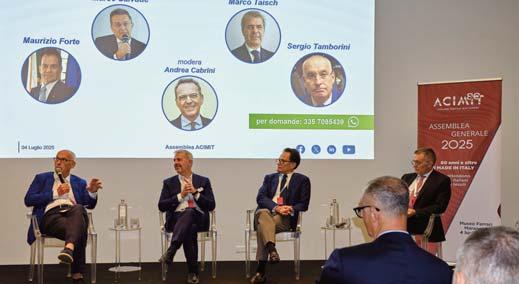
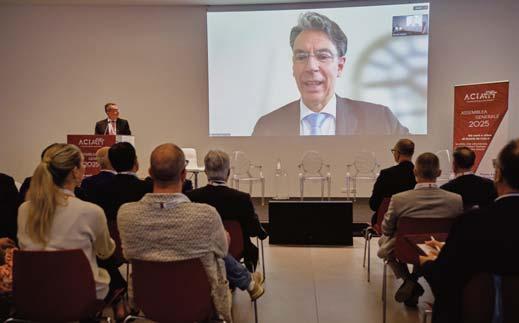
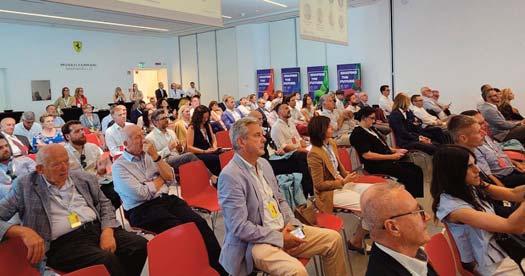
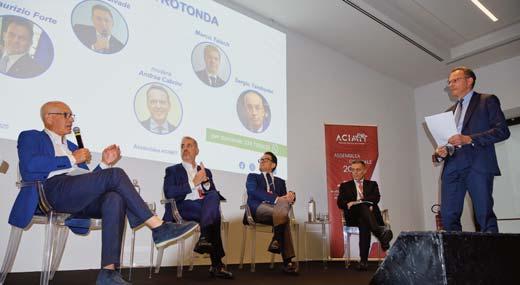
Color Service S.r.l. (“Color Service”) is pleased to announce that it has entered into a definitive agreement under which Graco Inc. (NYSE: GGG) will acquire 100% of the shares of the company.
Color Service is an Italian company, a world leader in the production of automatic dosing systems for a variety of markets, including textiles, rubber, tires, cosmetics, plastics, and food. Based in Dueville (Vicenza), Color Service exports its products worldwide, serving customers who require precision, traceability, and automation in the micro-dosing of materials for high valueadded processes.
Graco Inc. supplies technology and expertise for the management of fluids and coatings in both industrial and commercial applications. It designs, manufactures and markets systems and equipment to move, measure, control, dispense and spray fluid and powder materials. A recognized leader in its specialties, Minneapolis-based Graco serves customers around the world in the manufacturing, processing, construction, and maintenance industries.
“We have found in Graco the right partner to broaden our global presence and accelerate our growth. The affinity between our two cultures emerged already from our very first meetings,
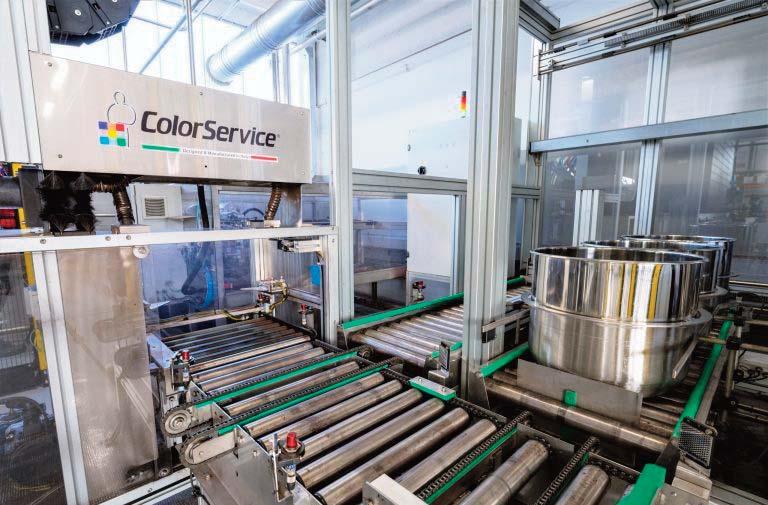
we are confident that our business will fit seamlessly into such a solid organization and that together we will offer even greater value to our customers worldwide,” commented Stefania Toschi, President of Color Service
The transaction is expected to close by the end of July 2025, subject to customary regulatory approvals and closing conditions. Following the acquisition, Color Service will continue to operate from its current headquarters in Dueville with its existing management team, ensuring continuity for customers, employees, and partners.
Since May 16, 1994, Corrado Rampon has been a cornerstone of Color Service, serving as Administrative Director. His story is closely intertwined with the company’s evolution: a journey that began in the early 1980s in the textile sector and continued at Color Service, where for over thirty years he has been a firsthand witness to extraordinary growth.
“When I first arrived at Color Service” Corrado recalls, “the company was still small. In addition to accounting and payroll, I was also responsible for safety and relations with affiliated companies. There was a lot to do, but also a strong desire to build something meaningful.”
Over time, his role has expanded and become more structured. Today, Corrado manages the administration and accounting office and coordinates relations with the Board of Directors, the board of auditors, consultants, and
financial institutions. Between financial statements, budgets, and treasury management, he carries out a daily job defined by precision and responsibility.
Challenges have not been lacking, especially during uncertain times in the textile market: “We went through tough times, but entrepreneurial ability and strategic vision allowed us to overcome every obstacle.” What stands out is how the company, despite its constant growth, has managed to preserve the soul of a family-run business. “Investing in people and research has always been a core value”, Corrado explains. “And that’s what will continue to make the difference in the future.”
As for the future of Color Service, Corrado has a clear vision: consolidating current markets, expanding into new sectors, and maintaining a continuous drive toward innovation. A solid, dynamic company, always looking ahead.
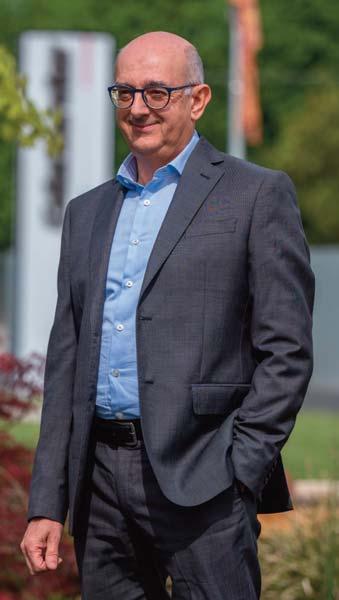
Corrado Rampon, Administrative Director
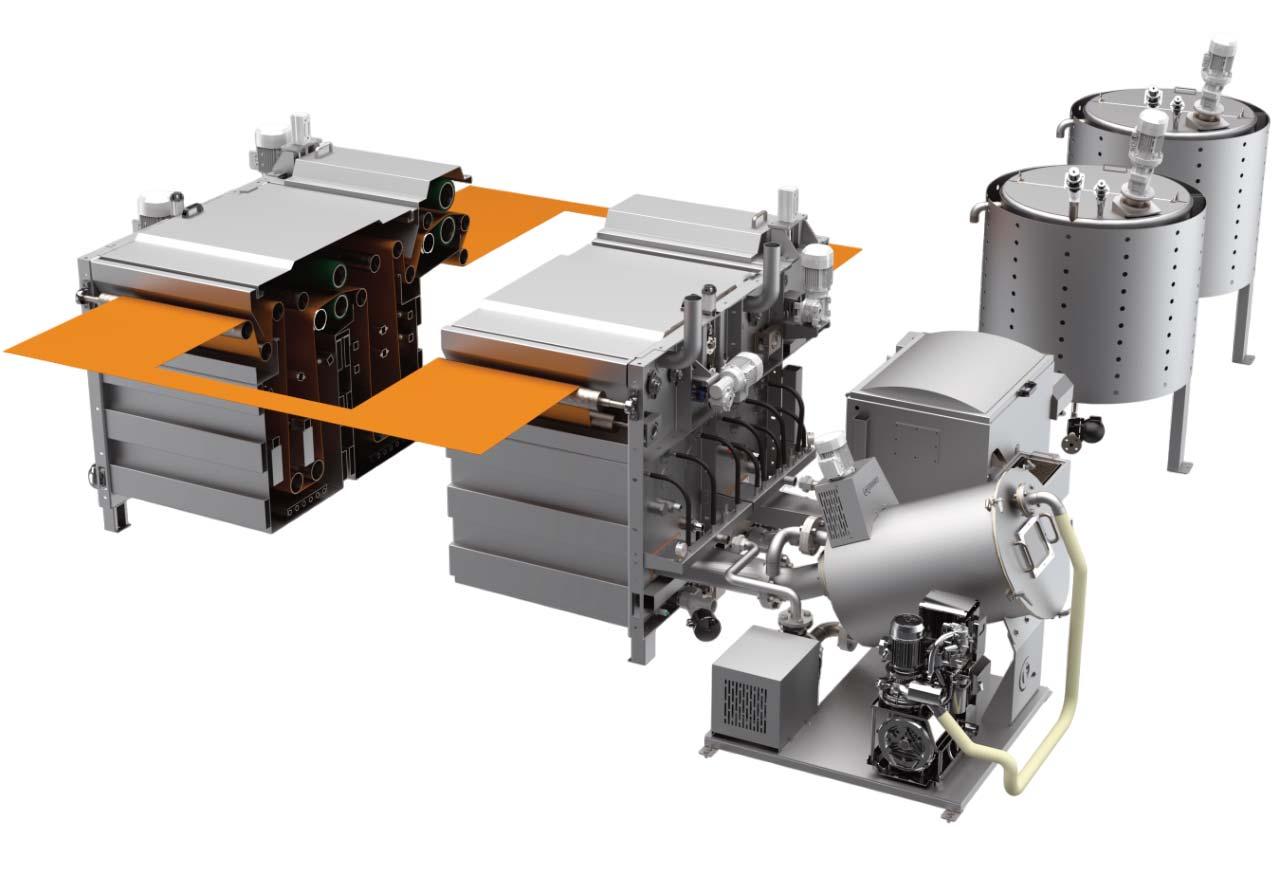
Ferraro, headquartered in Italy, has established itself as a global leader in textile finishing machiner y, offering advanced solutions for fabric preparation, dyeing, and finishing. Among its most acclaimed innovations is the Ferraro Sanforising Machine, designed to deliver unmatched quality, reliability, and consistency in the compressive shrinking process.
Sanforising is an essential finishing process that stabilizes fabrics and minimizes shrinkage during consumer use. Ferraro’s sanforising machine ensures precise control of fabric shrinkage, guaranteeing long-lasting dimensional stability while maintaining the original hand feel and appearance of textiles.
High Precision Control: Advanced monitoring systems allow exact adjustment of shrinkage levels across a wide range of fabrics.
Energy Efficiency: Optimized heating and pressure systems reduce energy consumption, reflecting Ferraro’s commitment to sustainability.
Versatility: Suitable for woven and knitted fabrics in cotton, blends, and technical textiles, meeting the needs of diverse market segments.
User-Friendly Operation: Intuitive control panels and automation enhance operator efficiency and production reliability.
With more than half a century of experience, Ferraro has supplied
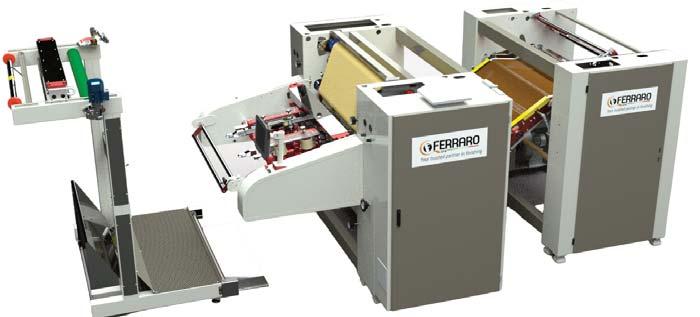
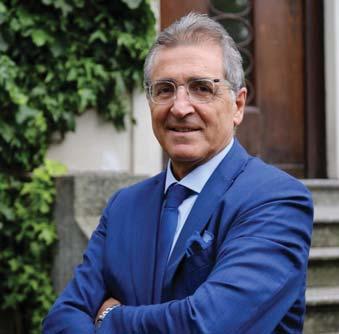

sanforising lines to leading textile manufacturers worldwide. Its strong presence in key textile hubs—including South Asia, Europe, and Latin America— reflects the company’s reputation for technology that consistently delivers topquality results.
Ferraro’s technologies, including its sanforising machines, are represented in Pakistan by leading local partners who have successfully introduced these solutions to mills requiring advanced finishing. The machines are particularly valued in Pakistan’s export-driven fabric and garment industry, where dimensional stability and premium finishing are crucial for global buyers.
Loptex S.r.l., based in Parma, Italy, is a global leader in solutions for contamination elimination across spinning, nonwoven, and textile recycling processes. With over 30 years of research and development, the company has built a reputation for its pioneering vision and innovative spirit, consistently meeting the growing quality demands of the global textile market.
At the heart of its success is a strong foundation of knowhow and expertise. Loptex designs robust, modular, and embedded technologies engineered to perform reliably under the most critical industrial conditions of blow room lines.
The Pakistani textile market, known for its demand for highquality yet cost-effective solutions, has been an important hub for Loptex’s growth. The company introduced its first sorting solution in Pakistan in 2000, scanning fibers in a free fiber stream and eliminating color contamination with minimal fiber loss.
The response was immediate—by February 2005, Loptex had sold 100 sorter units. As the market’s requirements evolved, particularly with the sudden ban of jute bags and the shift to polypropylene (PP) packaging, new contamination challenges emerged. PP materials proved difficult to identify and remove, posing risks to downstream textile quality.
Loptex responded with innovation, introducing ultrasoundbased solutions and later, embedded color camera systems with higher resolution and precision, to address plastic and color contamination. These advancements enabled mills to reduce production losses, maintain yield, and safeguard fabric quality— especially critical since plastic contaminants cannot absorb dyes.
Today, over 300 Loptex sorter systems are installed in leading cotton spinning mills across Pakistan, cementing its position as a trusted technology partner in the industry. A key part of this success is the strong support provided by Textile Engineers of Pakistan, the official representatives of Loptex in the country. Their expertise and on-ground presence have been instrumental in building customer trust and ensuring reliable after-sales service.
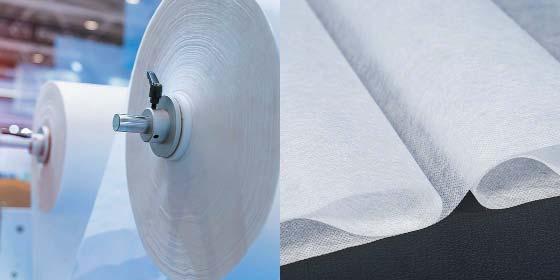
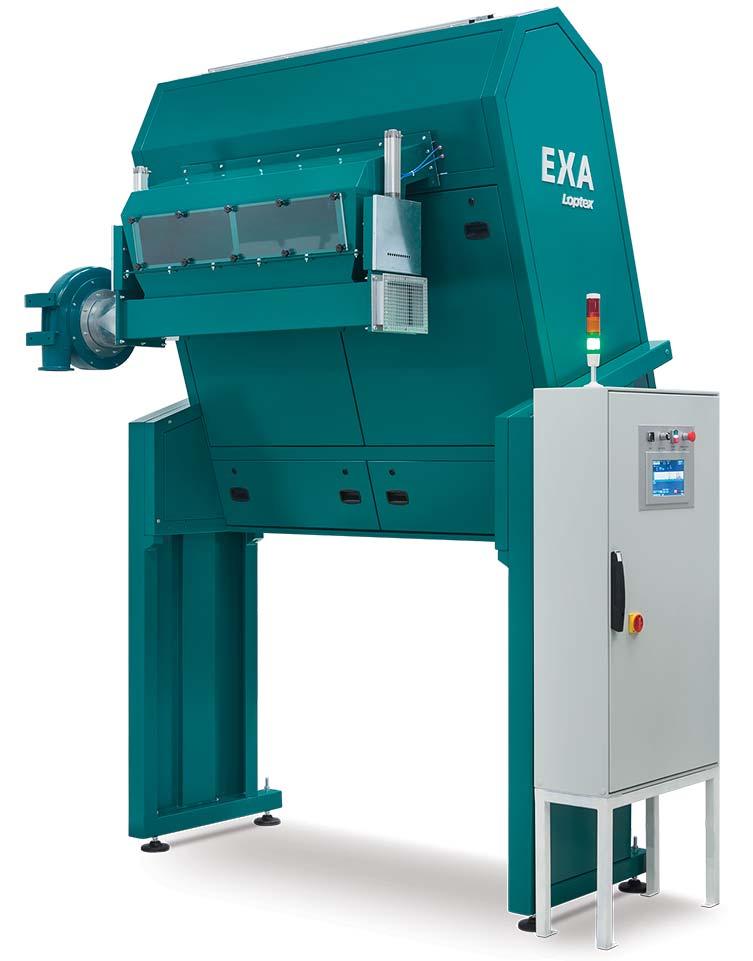
Through partnerships with leading European companies, Loptex has extended its expertise into the nonwoven sector, offering sorting solutions coupled with vision inspection systems. These systems enhance yield and improve the quality of finished light webs in spunlace and thermobonding processes, especially for medical and hygienic applications.
Loptex’s advanced technologies allow for contamination classification by color and size during blow room processing. When combined with vision inspection data, this delivers comprehensive quality control throughout production.
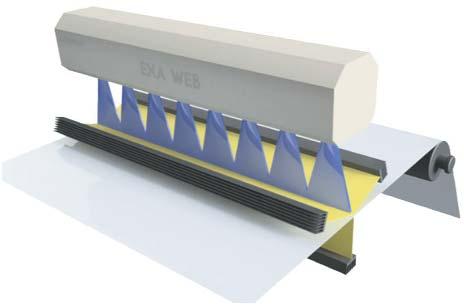
In Pakistan, Loptex systems are already in operation in bleached cotton sorting from card droppings and comber noils, ensuring the highest resolution and precision for detecting even the smallest contaminations. Recycling – Driving
With sustainability at the core of today’s textile industry, Loptex plays a crucial role in mechanical textile recycling. Automatic sorting solutions from Loptex help separate fibers by color and composition, improving the quality of recycled fibers for reuse in sustainable textile products.
Its installations across Mexico, Taiwan, France, and Italy demonstrate its international footprint in recycling. By scanning shredded fibers at the final stage of processing, Loptex systems remove colored imperfections and contaminants, ensuring that recycled fibers meet the standards required by fashion brands and comply with western sustainability legislation.
Pakistan, with its large base of shredding machines, represents a promising market for Loptex’s recycling solutions—bridging the gap between local production capacity and the global demand for circular textiles.
Loptex is at the forefront of Industry 4.0 integration within the textile value chain. Its sorter systems, equipped with state-of-the-art embedded technologies, create valuable platforms for mills to pursue business continuity, growth, and competitiveness.
By combining cutting-edge automation with human expertise, Loptex not only eliminates contamination but also empowers companies to reduce competence gaps and improve overall process efficiency.
From spinning to nonwovens and recycling, Loptex has built a legacy of innovation and reliability. In markets like Pakistan, where quality demands are growing rapidly, Loptex’s technologies have proven indispensable. With the strong backing of Textile Engineers of Pakistan, Loptex continues to strengthen its footprint and customer relationships. Looking
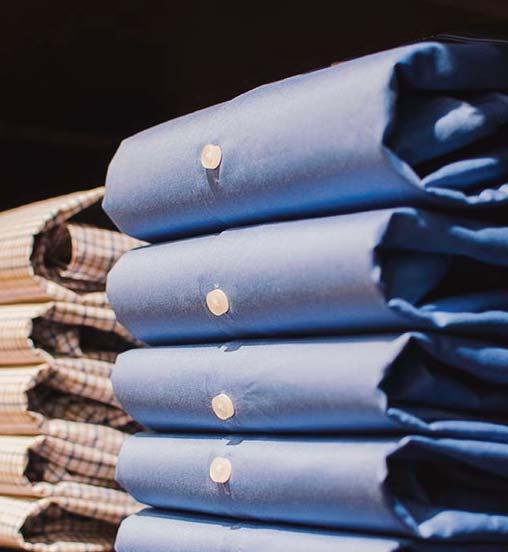
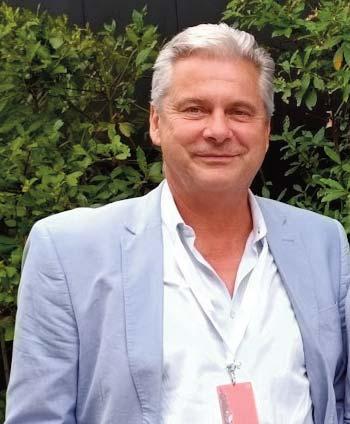
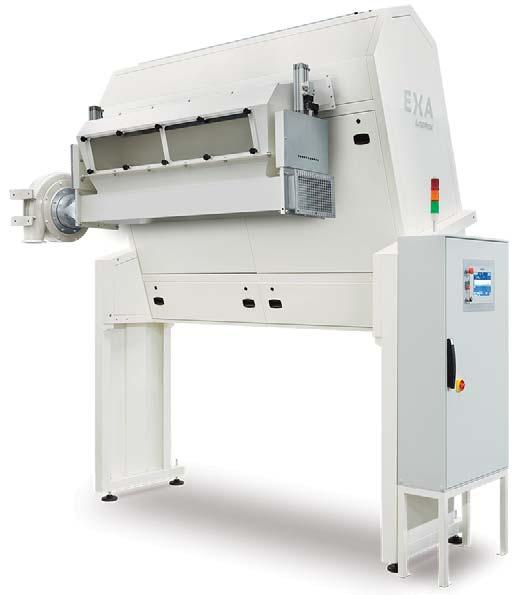
ahead, with its focus on sustainability and Industry 4.0 readiness, Loptex is well-positioned to lead the textile industry into a cleaner, more efficient, and more circular future.
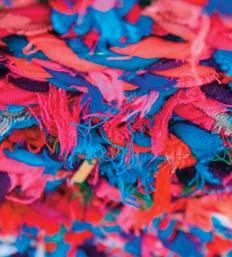
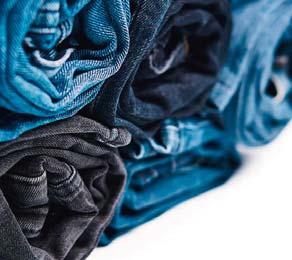
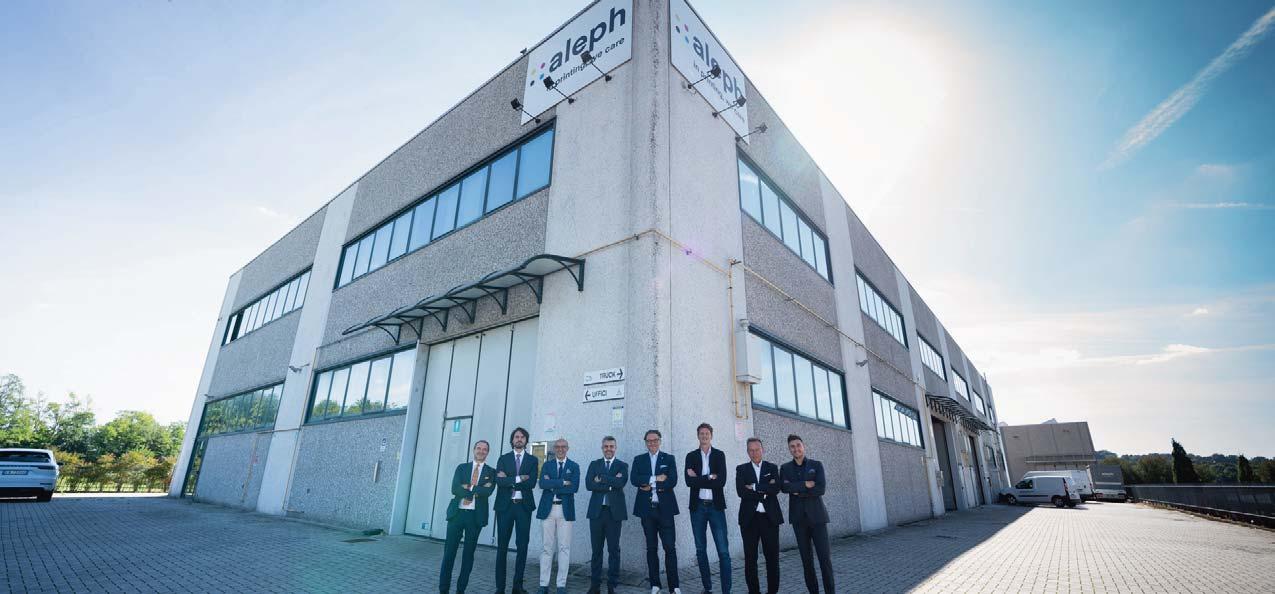
In 2023, Durst Group, a global leader in industrial digital printing technologies, expanded its textile innovation capabilities by acquiring a majority shareholding in aleph Srl, a pioneering Italian company known for its cuttingedge industrial digital printing platforms, as well as for its sustainable pigment printing solutions, advanced reactive printers and intelligent software workflows for textile production.
Following the acquisition, aleph now operates under the new name Durst Como, solidifying Durst’s presence in Italy’s renowned textile hub.
“Joining Durst means scaling that philosophy with industrial power, global reach, and the strength to shape the future of textile printing.”
aleph’s core strengths include:
Eco-friendly pigment ink systems enabling waterless, energy-efficient printing
SmartPrint™ workflow software for seamless design-to-print integration
aleph (Now Durst Como) Durst Group
Reactive and Pigment ink technology
Industrial inkjet platforms
SmartPrint™ software Durst Workflow and Analytics
Italian textile design heritage (Como)
Boutique customer focus
Global scale and service reach
Industrial-grade reliability and uptime
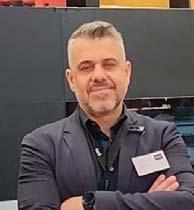
At the heart of aleph’s legacy is Alessandro Manes, founder and CEO of the company, whose entrepreneurial vision transformed aleph from a local tech venture into an internationally recognized name in textile pigment printing and digital workflow integration. Under his leadership, aleph became synonymous with solutions like the LAFORTE® series and SmartPrint™ software, combining Italian creativity with engineering precision.
“With aleph, we built a company that understood the textile designer, the mill, and the printer alike,” says Alessandro Manes.
Proven expertise in fashion, interior decoration, and custom fabric applications
Deep roots in Como’s textile and design culture, Italy’s creative heartland
This acquisition is more than a business move—it’s a strategic alignment of complementary strengths that allows Durst to deliver a full-spectrum textile printing solution.
The newly formed Durst Como brings software, chemistry, and design thinking into the heart of Durst’s textile roadmap. The result is an agile, sustainable, and fully integrated offering for textile producers worldwide—from sampling to scaled production.
Christoph Gamper, CEO and CoOwner of Durst Group, emphasized:
“We are delighted to welcome aleph into the Durst family. The products, expertise, and corporate culture are a perfect fit for us. With this acquisition, we are not only expanding our product portfolio, but also our knowhow and our team with experienced digital textile printing experts. Together we will continue to drive innovation and growth in digital textile printing.”

— Durst Group Newsroom, May 2023.
With the acquisition of aleph and the launch of Durst Como, Durst Group has extended its leadership in textile innovation by uniting best-in-class hardware, software, and industrial textile reactive and pigment technology under one vision. The enhanced offering allows customers to:
Digitize fabric production from design to delivery
Eliminate water-intensive post-processing with pigment solutions
Achieve higher quality with shorter lead times
Access expert support from Italy’s textile innovation center
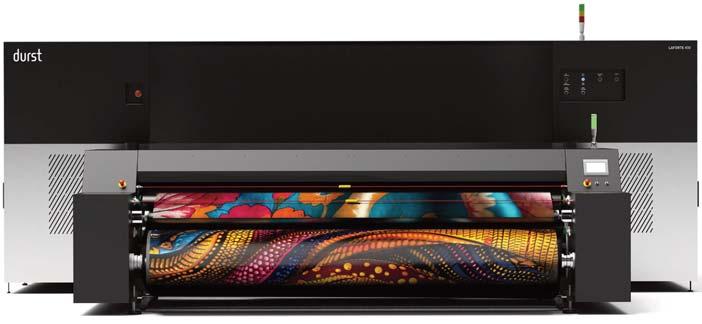
From the pioneering leadership of Alessandro Manes, who has been appointed as Director Global Sales Industrial Textile at Durst Como, to flagship collaborations with companies like Eurojersey, Durst Como represents the next generation of textile printing— intelligent, sustainable, and entirely customer-focused.
Durst is not just building machines. It’s building the future of fabric.
One of the most compelling illustrations of Durst’s transformative role in textile printing is its collaboration with Eurojersey S.p.A., creators of the globally renowned Sensitive® Fabrics. Located in Caronno Pertusella, Italy, Eurojersey is known for high-quality, warp-knit technical fabrics used by premium brands in fashion, swimwear, lingerie, and performance apparel.
Eurojersey operates a vertically integrated, technologically advanced facility where Durst digital printing systems are used to meet the highest standards of flexibility, color precision, and production speed—without compromising on sustainability.
On-site, Durst printers are seen producing high-definition geometric and micro-patterns on Sensitive® Fabrics, with
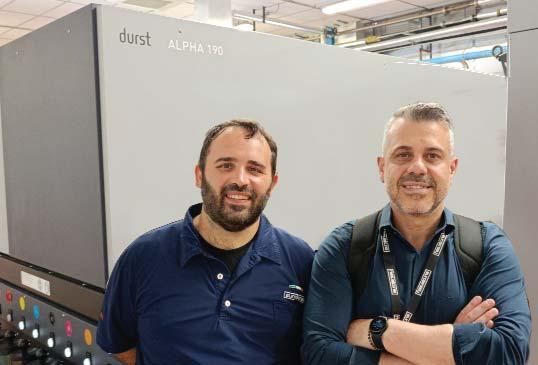
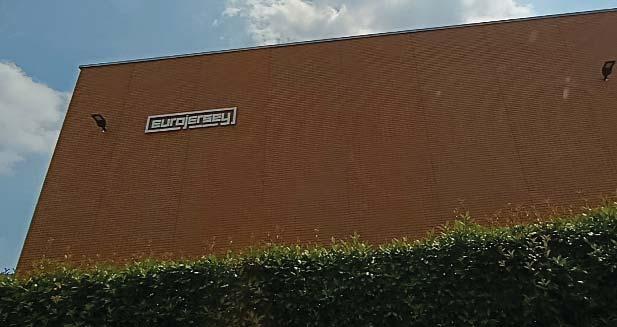
flawless clarity and consistent quality. These prints are achieved with reduced water and energy consumption thanks to pigment technology.
Exceptional print resolution on stretch technical fabrics
Fast turnaround for design changes and new collections
Integration with internal workflow for maximum efficiency
Sustainable processes aligned with global environmental standards
Eurojersey Spokesperson:
“Durst’s technology enables us to stay ahead of our market. It’s reliable, sustainable, and fully adaptable to our evolving collections and customer expectations.”
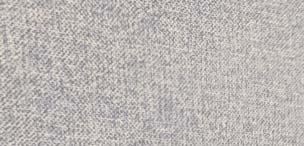
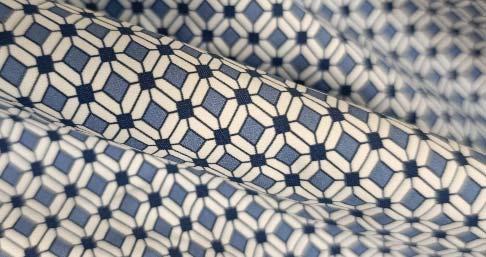
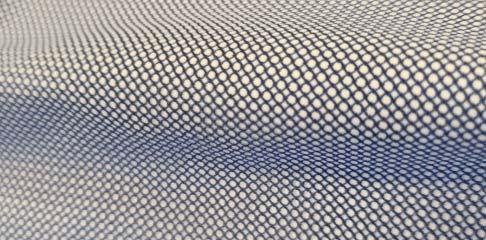
Founded in 1983 by Mr. Roberto Corino, Corino Macchine has grown to become a global benchmark in the dyeing and finishing sector. From its origins in Italy, the company has revolutionized fabric handling and treatment with ground-breaking technical solutions—earning its reputation as a pillar of excellence in textile machinery.
What sets Corino Macchine apart is its ability to blend innovation, reliability, and performance in every product. Its iconic machines, such as the SUPER N pin wheel weft straightener, as well as essential devices like the detwister and slitting basket, have become indispensable to textile manufacturers across the world. These technologies have redefined how fabric is processed, helping to streamline production while preserving fabric quality.
Staying true to its roots, all Corino machinery is 100% made in Italy, combining high craftsmanship with advanced engineering. This commitment to quality, coupled with an unwavering focus on client needs, has helped the company achieve a position of undisputed leadership—one that is reaffirmed by its broad and loyal global customer base.
Corino Macchine offers one of the most complete ranges in the industry, spanning from basic components—such as fabric expanders and centering systems—to complete, turnkey lines. Notable among these is the SUPERSLIT line for opening and slitting, and the ST4 tubular squeezer, both designed to
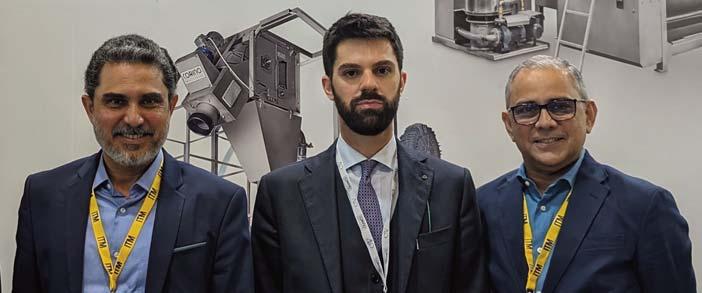
optimize fabric processing at every stage. Importantly, Corino’s machines are engineered to handle a vast array of fabric types—from knitted and woven to technical and non-woven materials— ensuring flexibility for a wide spectrum of textile operations.
The SUPERSLIT system stands as a hallmark of Corino’s expertise. For over three decades, it has been the global standard for the opening and slitting of knitted fabrics. Built with a modular construction, it adapts to varying production needs, offering the highest productivity with minimal tension and fabric elongation—key concerns in modern textile processing.
Hydrotable: Turntable with Hydraulic Control that is designed for stability and flexibility, the external hydraulic system ensures smooth and safe operation across processes.
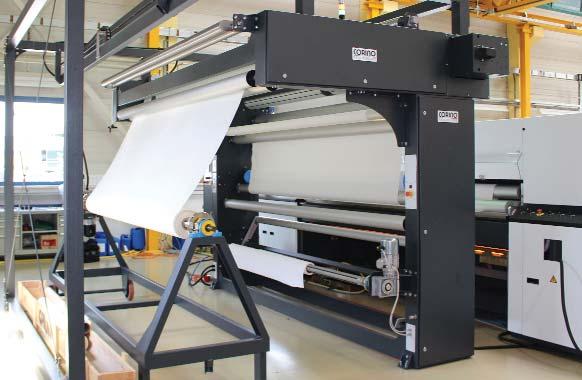
Rope Squeezer: Reduces excess liquid from fabric post-dyeing or washing, ensuring efficient feeding into the rope opener and preventing water spillage during the slitting process.
Corino De-Twister: A cornerstone of the Corino opening systems, it identifies and eliminates
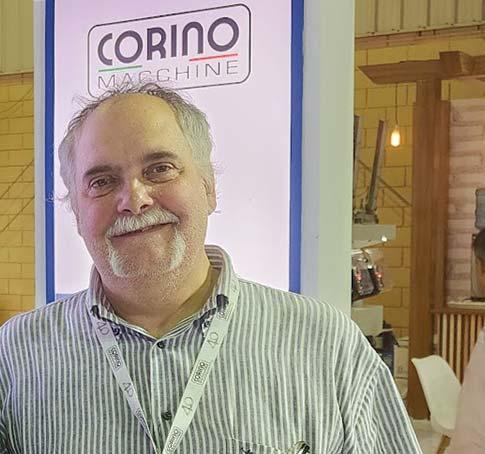
rope twists with unparalleled sensitivity. Made of stainless steel, it minimizes maintenance downtime.
LT07 Rotating Basket: Featuring suction-based tube guidance, this system remains unmatched in its ability to handle tubular fabrics with precision.
Quadratex: Ensures perfect alignment of wales in knitted fabrics, supporting consistent fabric quality.
Antipilling Tank: Engineered for post bio-polish enzyme treatment, this dualcompartment tank ensures deep cleaning through a continuously circulating bath and spraying nozzles.
Foulard - FC Due: A high-efficiency two-roller foulard system that minimizes residual moisture. Equipped with advanced fabric spreading devices, it is entirely made of stainless steel and designed for low maintenance and high performance.
With its unwavering dedication to technological evolution and customer satisfaction, Corino Macchine remains not just a manufacturer—but a strategic partner for textile companies worldwide.
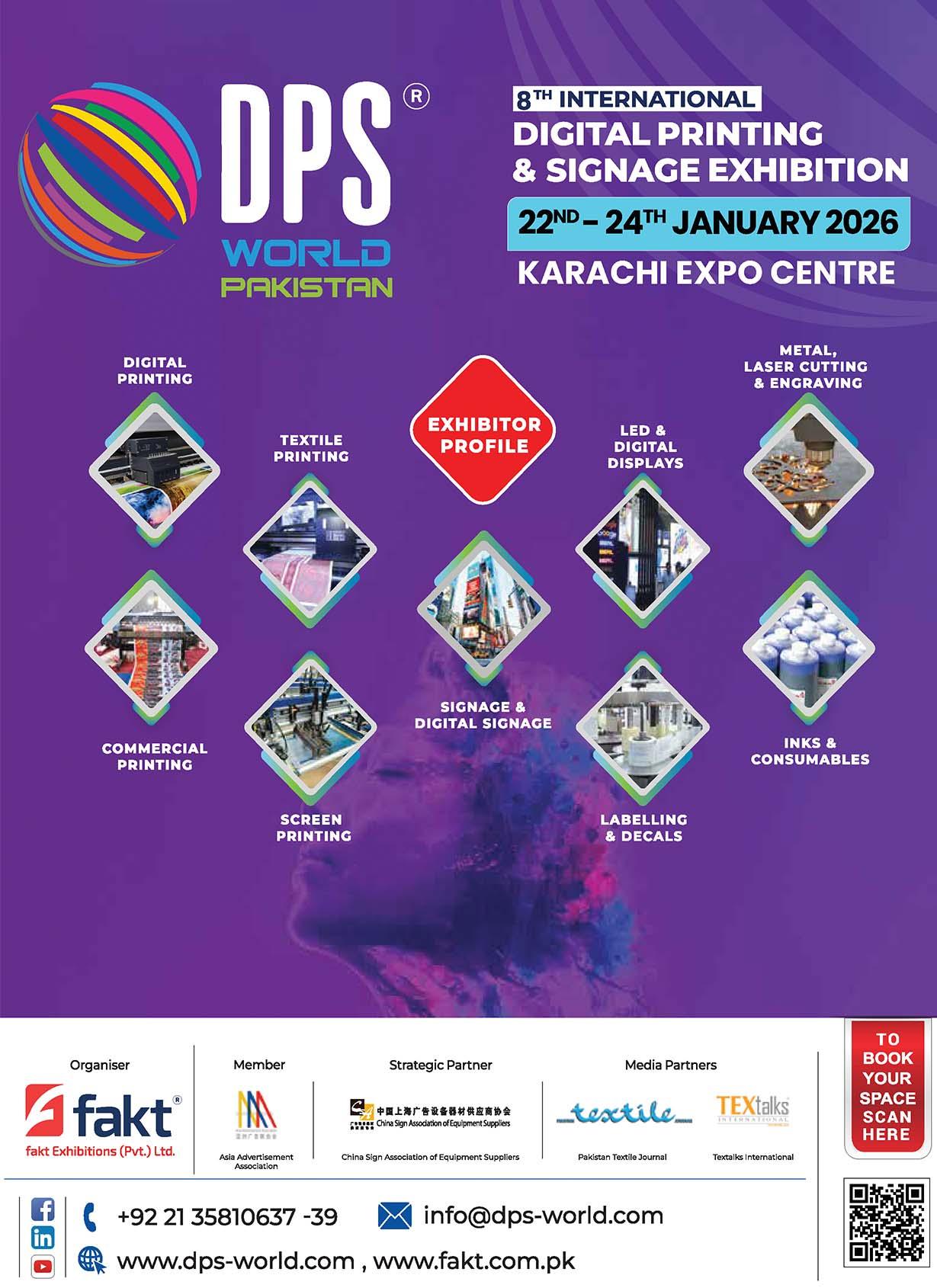
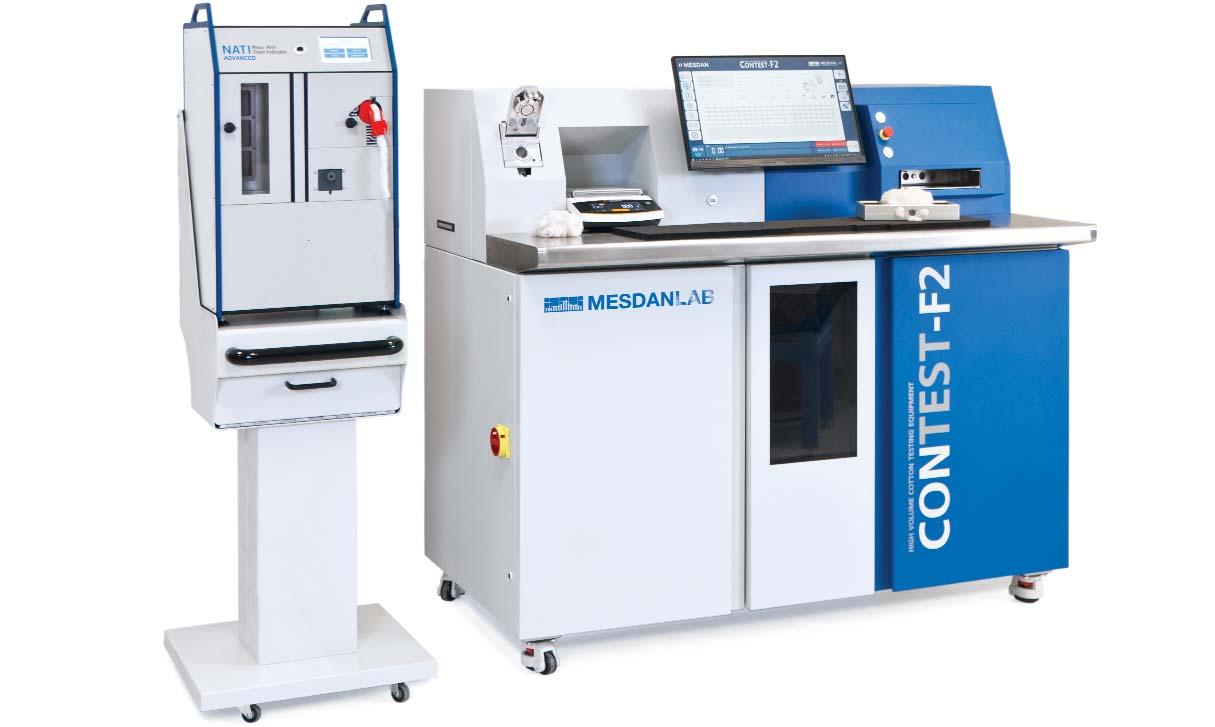
Mesdan can offer complete testing solutions for the textile industry; spinners, weavers and knitters, garments manufacturers, as well as R&D and educational institutions, and classing institutes can source lab equipment, consumable products and calibration services from a unique supplier.
Specifically for the cotton fibre, the Mesdan-Lab range includes:
CONTEST-F2 – the high-volume equipment for the analysis of the cotton fibre properties, such as micronaire, maturity and fineness, length, short fibres, strength & elongation, moisture, colour & leaf grade, SCI.
NATI AVANCED – the latest version of the well known Neps and Trash Indicator, designed for the use in combination with Contest-F2, to obtain a unique report of the cotton fibre
properties, including neps, seed coat neps and trash; Nati Advanced is suitable for raw fibres, slivers and roving, of manmade fibres as well.
CONTEST-S – the unique and fully automatic stickiness detector, working with a thermo-mechanical system, approved by ICCTM-ITMF that helps all the cotton supply chain to assess the content of sugar (honey dew) in the fibres, for a proper, reliable and repeatable evaluation of the cotton quality and its spinnability.
TRASH ANALYSER – an important tool for separating the lint from the trash and dust, for the calculation of the contamination % content in large cotton fiber samples.
TENSOLAB 4 – the 4th generation of the famous tensile strength tester, that thanks to its extreme accuracy and versatility, is today able to test also fibers, either in their single (particularly for the
man-made) and in the bundle form (for the natural fibres, like cotton and wool). Specific testing routines and accessories were developed for this particular application.
To complement the offer of equipment for cotton spinning, MesdanLab can include Autofil (automatic yarn strength tester), Twistmatic (automatic yarn twist tester), MT Evenness Tester (for yarns, slivers and rovings of spun fibres), Attrifil (to measure the coefficient of friction of yarns), and others.
Mesdan is also the world specialist in the yarn joining systems; their pneumatic splicers were chosen by the most renown manufacturers of automatic winders and are suitable also for the hand-operated applications, like the assembling & twisting, the soft & hard rewinding in yarn dyeing, the technical yarn applications, the sewing threads processing, etc.
For more than a century, Savio has stood at the forefront of textile machinery innovation, consistently setting new standards in yarn finishing technology. Today, that legacy continues with the introduction of the Proxima Smartconer®, the company’s most advanced automatic winding machine, and the Lybra Smartspinner®, a breakthrough in air-jet spinning. Engineered with precision and foresight, these new solutions embody the principles of connectivity, efficiency, and sustainability that define modern manufacturing. By combining cutting-edge automation with tangible customer benefits—higher productivity, lower energy use, superior yarn quality, and reduced operating costs—Savio reinforces its role as a trusted partner to spinners worldwide, equipping them to compete and thrive in an evolving global market.
Proxima Smartconer® is setting the benchmark in Savio automatic winding. They have combined the name Proxima with Smartconer®: it stands for a high-tech winding machine, capable of perfectly adapting to demands of Connectivity, Industry 4.0 and Industrial Internet of Things.
Thanks to the innovations, spinners get a machine featuring high-tech capabilities, thanks to a design with a strong focus on the main benefits for customer’s competitive advantage: high productivity, low energy consumption, premium yarn quality, automation, and data connectivity.
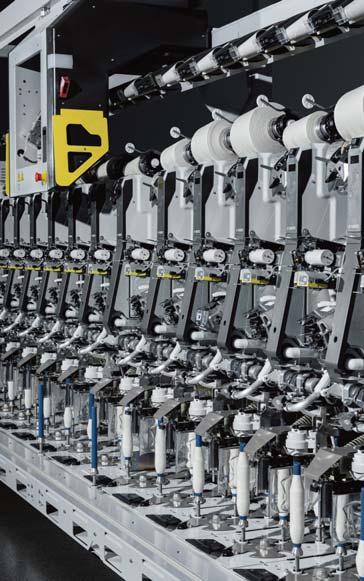
Proxima Smartconer® is designed with the foremost attention to the customer’s needs in the optimal utilization of a winding machine. Investing in equipment that enables to work faster and reduces manual and repetitive tasks, can increase both efficiencies and overall productivity. The same applies to
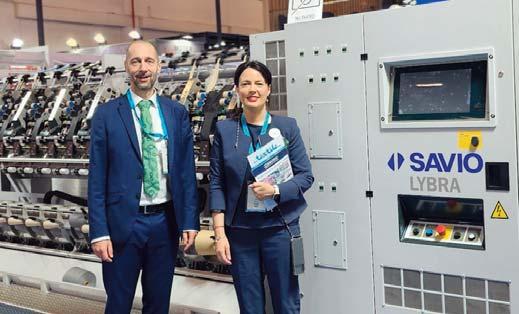
the new equipment that does more of what is needed, faster, safer, with better quality but with less waste, less maintenance, and less resource usage.
With Lybra Smartspinner®, we spin differently with a versatile and smart machine. Savio’s air-jet spinning machine has been developed with an original spinning technology to serve customers in specific applications of textile production: knitting, home textiles, and sunshades. Air-jet spun yarn has a soft and smooth character, perfectly adapting to creating functional & fashionable fabrics.
With LYBRA Smartspinner®, Savio offers a versatile, flexible, cost-saving, and easy-to-use machine. Air-jet spinning offers yarn manufacturers the opportunity to produce yarn at high production rates and low processing costs. The air-jet spinning technology uses the same preparation as conventional ring spinning. This processing works directly with slivers instead of roving, integrating three textile processes: roving, spinning & winding.
Space needed for air-jet spinning is 25-30% less than for ring-spinning equipment producing the same capacity, thereby reducing building costs. Also, a smaller area requires less climate control and reduced operating personnel. This results in further substantial savings, maximizing the return on investment.
Over its 110+ years history, Savio acted as technological leader and innovative player in attractive niches of the textile value chain. Savio leverages on the best value-for-money proposition in the industry. It has a consolidated presence in all relevant geographies with a local-for-local approach, allowing Savio to promptly address market demand and requirements. Savio is specialized in the textile machinery sector for the yarn finishing segment being the leading supplier of winding, twisting and spinning machines with manufacturing plants in Italy, China and India.
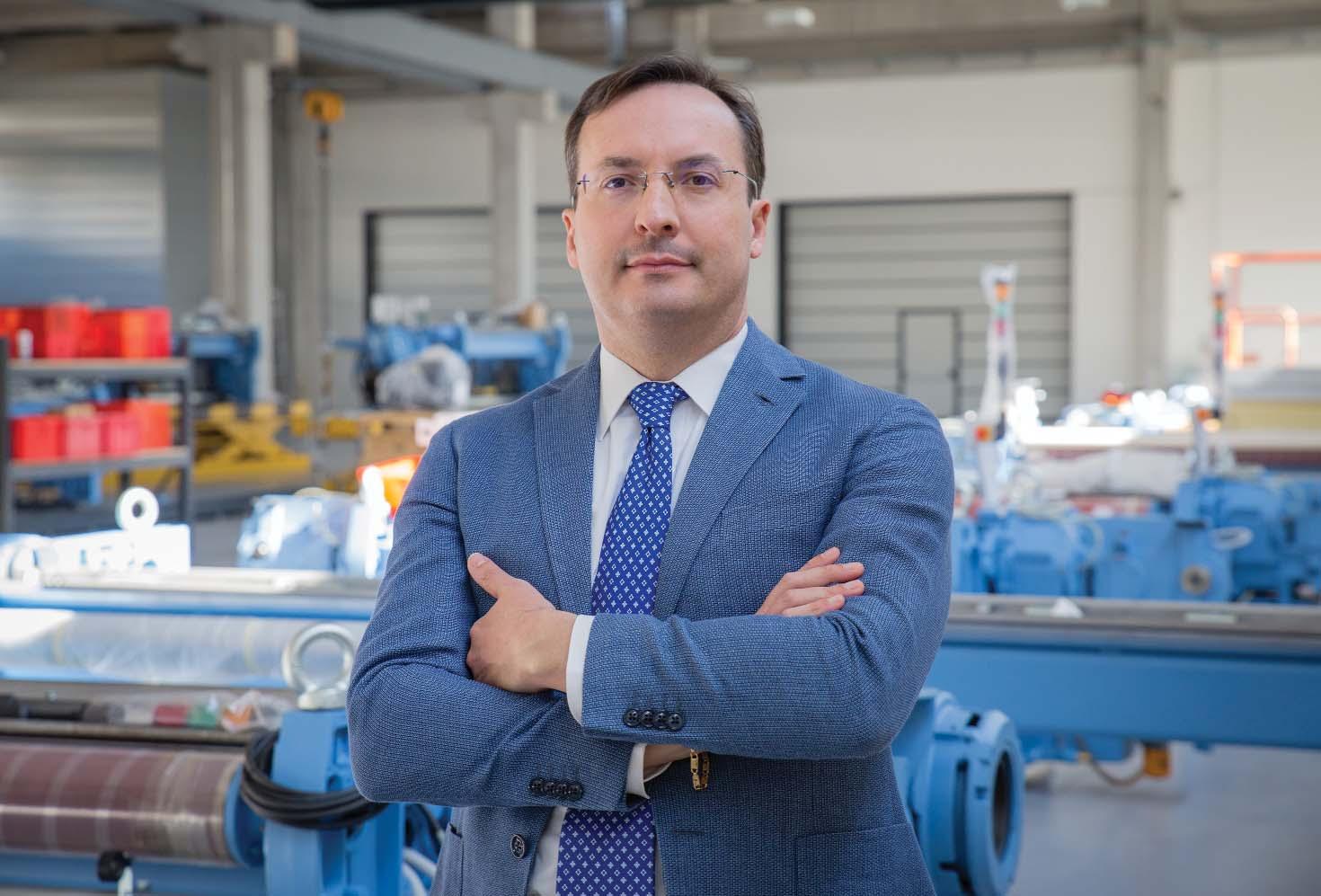
Santex Rimar Group is driving the future of textile machinery through sustainable innovation, digitalization, and customer-focused solutions. In this exclusive interview, CEO Simone Rancan highlights the company’s strategic priorities, Pakistan-focused approach, and how Italian engineering continues to empower global textile transformation amid evolving industry challenges.
Sustainability remains a critical focus. What advancements has Santex Rimar Group achieved in energy efficiency, water conservation, and environmental sustainability with your latest product developments?
Santex Rimar has always been a reference for the market in terms of energy consumption and sustainability. The premium quality of our projects and machines translates into lower energy consumption per kilo of material processed. This is achieved by reducing those factors with a negative impact on sustainability. Embracing sustainability also has the positive consequence of reducing both waste and energy consumption. We have also made great strides in developing software that optimizes machine performance in order to achieve these goals.
Digital transformation is reshaping the textile machinery sector. How has Santex Rimar Group embraced digitalization and automation, and what measurable benefits have these brought to your customers and the industry?
Digitalization and automation have been key topics in the industry for many years. And Santex Rimar has always brought its clients the best-available solutions for digitalization. This commitment has required strong investments in our own engineering, as well as cooperation with partners active in digital production technologies. We are extremely satisfied with the results achieved here. The level of automation is also increasing. We note that our clients are continuously choosing machines and plants with our more advanced automation concepts. This brings the
end-user maximum consistency in output quality levels, as well as the possibility to operate processes with reduced personnel.
Pakistan is a global textile hub. What is your strategy for the Pakistani market, and are there any upcoming products or tailored solutions specifically designed for Pakistani manufacturers?
Pakistan is well known for its state-ofthe-art textile sector. Requirements from customers are very much focused on the performance and productivity of the equipment they need. Another important aspect is related to the average size of the mills operated by Pakistani clients. They generally have a higher than normal production capacity and daily output, so the equipment we develop for this market are specific versions, geared to the particular profile of the local industry.
Customer-centric innovation is vital for long-term success. How does Santex Rimar Group incorporate customer feedback into its R&D processes, and what steps have been taken to enhance the user experience of your technologies?
Our Global Service team represents our eyes and ears in the market. We are very proud of this worldwide network, which is vital in bringing feedback from customers. These responses are discussed and analyzed internally by our engineering and sales teams. The interface with latest PLC technologies helps a lot in this process. We have achieved extremely satisfying results, for example in the application of compacting technologies, thanks to this approach, and we will continue in other areas as well.
Technical textiles are a growing industry segment. How can Santex Rimar Group meet the specific requirements of sectors like automotive, medical, or protective fabrics?
SantexRimar Group has had technical textiles in its DNA from the start, with a specific division including the Cavitec and Isotex brands. We are thus well positioned to cope with an emerging demand for these types of machinery and plants. So, we do not actually have to ‘follow’ a technical textiles – as we have already been in it for more than 30 years, and are eager to share our extensive
knowledge with customers. In fact, technical textiles production doesn’t only need machinery and plants, it also requires tailor-made solutions to be really effective. And this area is one of our great strengths.
The development of a skilled workforce is vital in the high-tech manufacturing sector. What initiatives has Santex Rimar Group implemented to ensure that operators, technicians, and clients are welltrained in the efficient operation of your advanced machinery?
We place great big importance on our Service Team, not only for providing topquality assistance to our clients but also for its role in managing training. Increasingly, we offer our clients the chance to train their workforce during a new plant installation. At the same time, we are developing our software to allow customers to input simple instructions to our machines, while the software handles the most complex settings. This is a huge advantage in shortening training time for operators.
Looking ahead to 2025, what are Santex Rimar Group’s strategic priorities and expectations? Can you offer any insights into upcoming product launches or anticipated technological breakthroughs?
The year 2025 will still be one of uncertainty, for us and the customers. In such an environment, we need to focus
on bringing short-term and effective advantages to our clients to help them through this difficult period. Our technological advances are thus mainly focused on software improvements and digitalization. These are the kind of improvements that can be implemented quickly, once developed, not only on new machines but also on existing machines and plants. In this way we achieve a double target, enhancing the new products and giving clients the chance to improve what they already have.
What can we expect from Santex Rimar Group at ITMA Asia + CITME 2025?
At ITMA Asia + CITME 2025 the Group will present the full program of our technology offering, across both conventional textile and technical textile applications. There will, of course, be a special emphasis on the particular requirements of the greater Asian market. Prominent will be examples of intelligent manufacturing with textile machinery, maximizing the latest digital technologies to improve productivity and sustainability.
In technical textiles, the range of applications is enormous, from carbon fibre pre-pregs to special coatings for airbags and medical products. Our developments in these areas will feature strongly, highlighting especially the design and production of tailor-made equipment to meet the specific demands of individual clients.
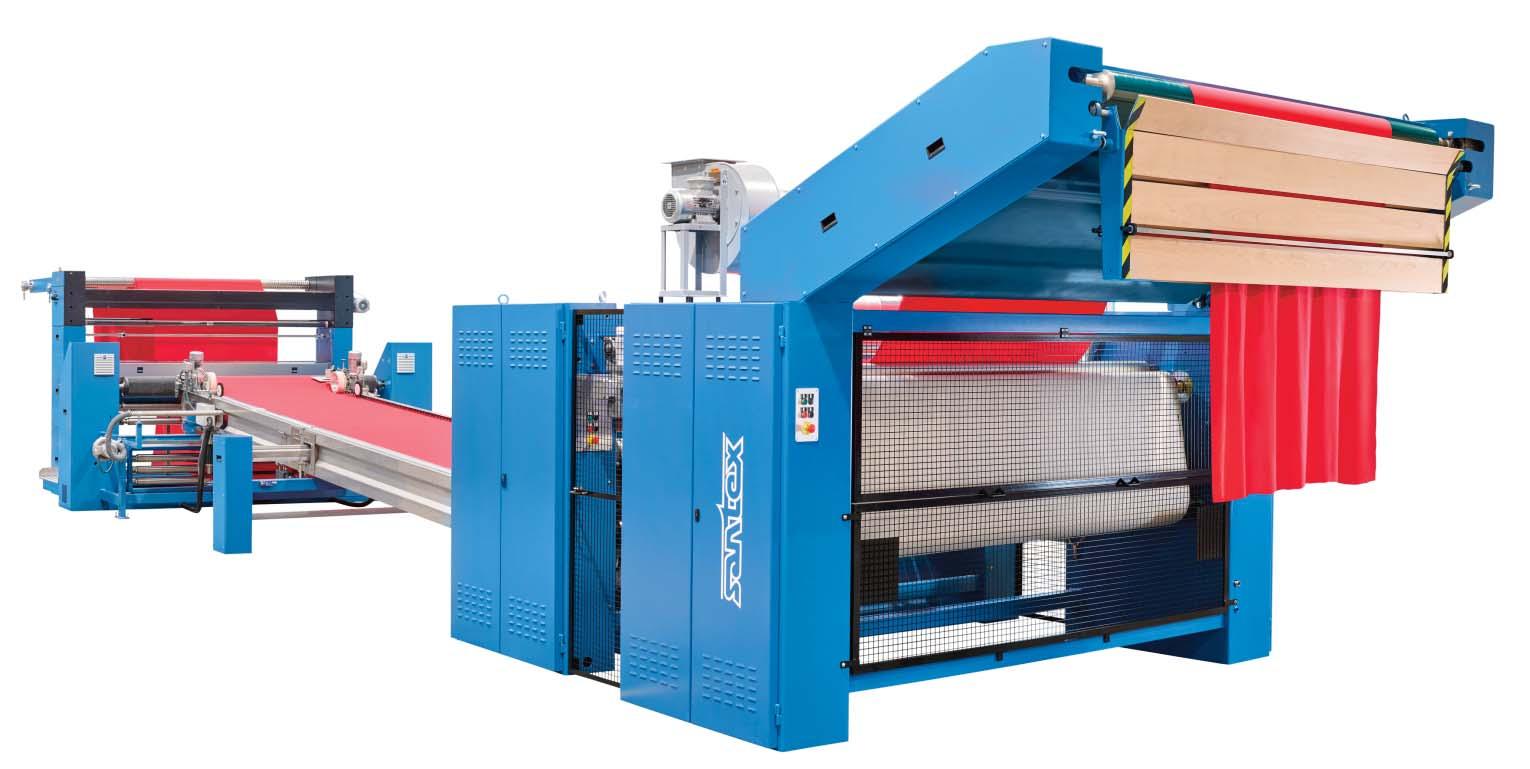
Archroma
Chhipasons.................................................................64
Cotton
Color
Corino
DPS
Ferraro





